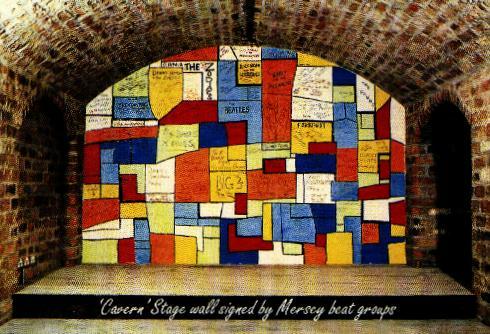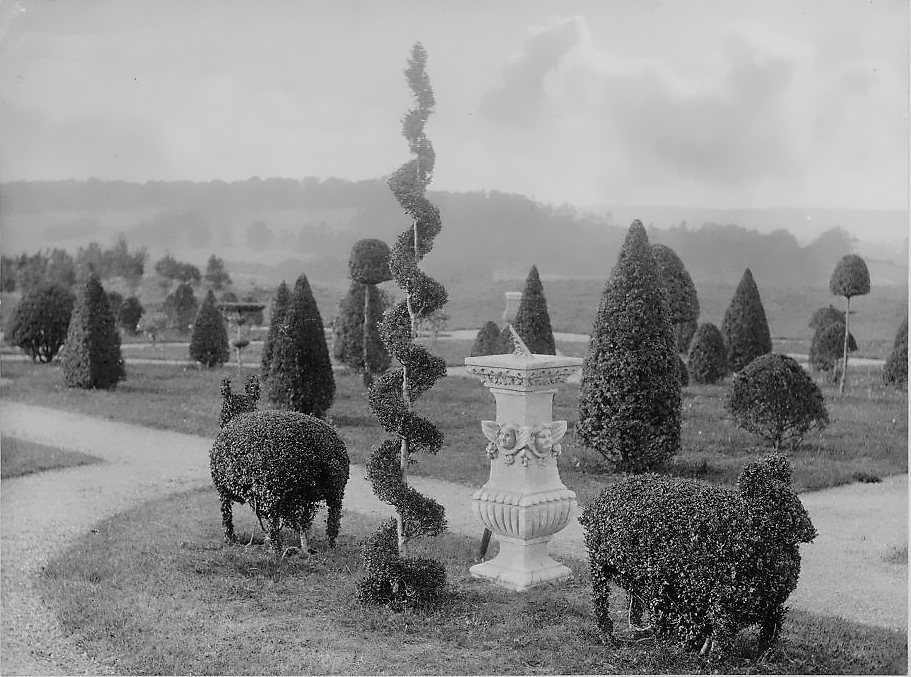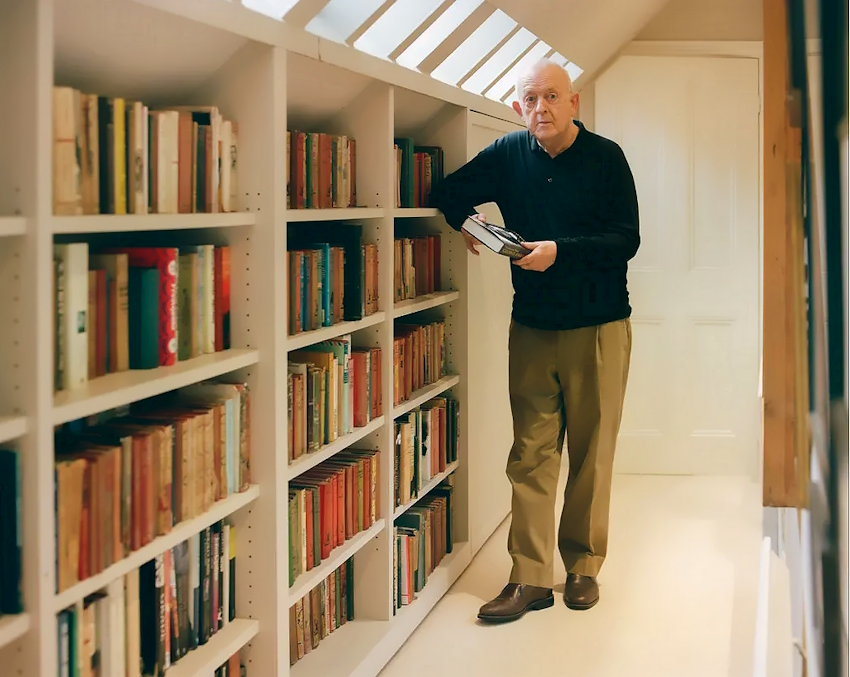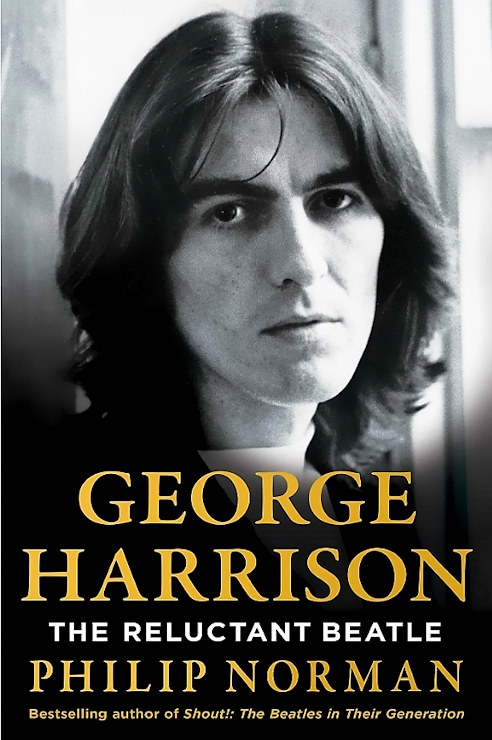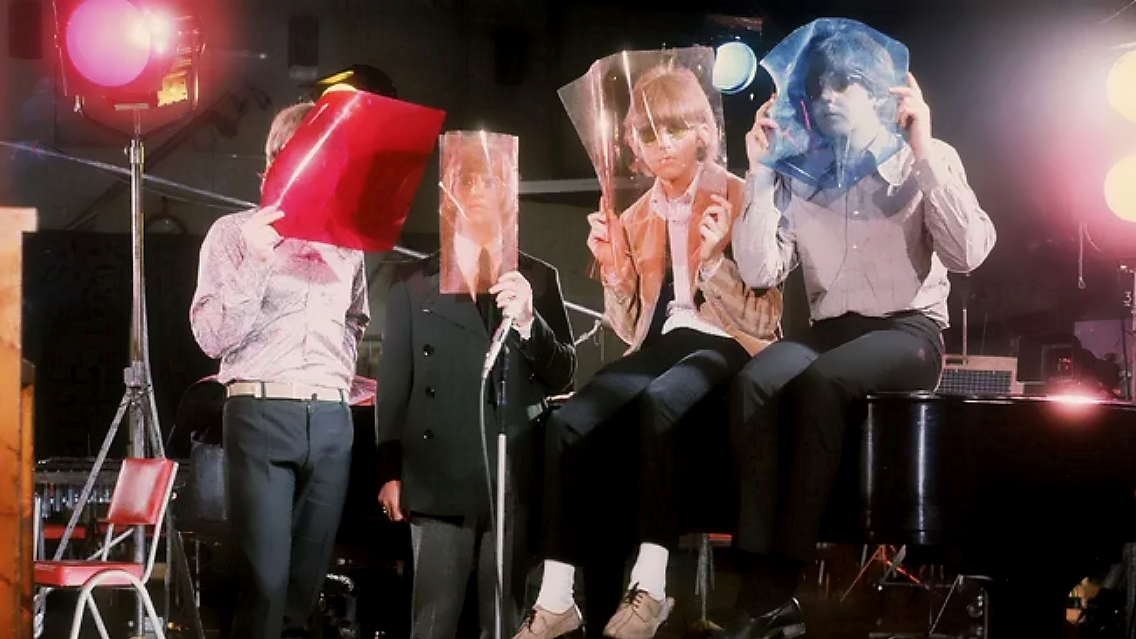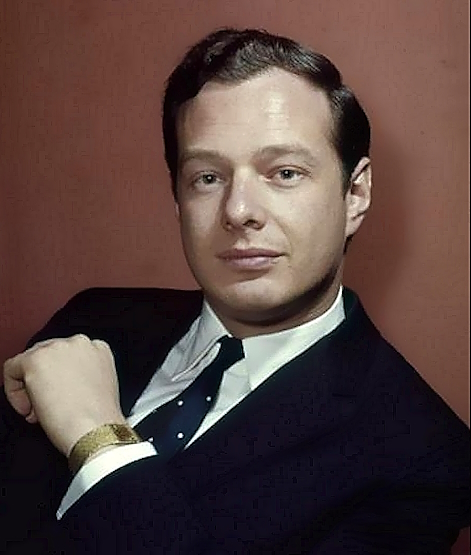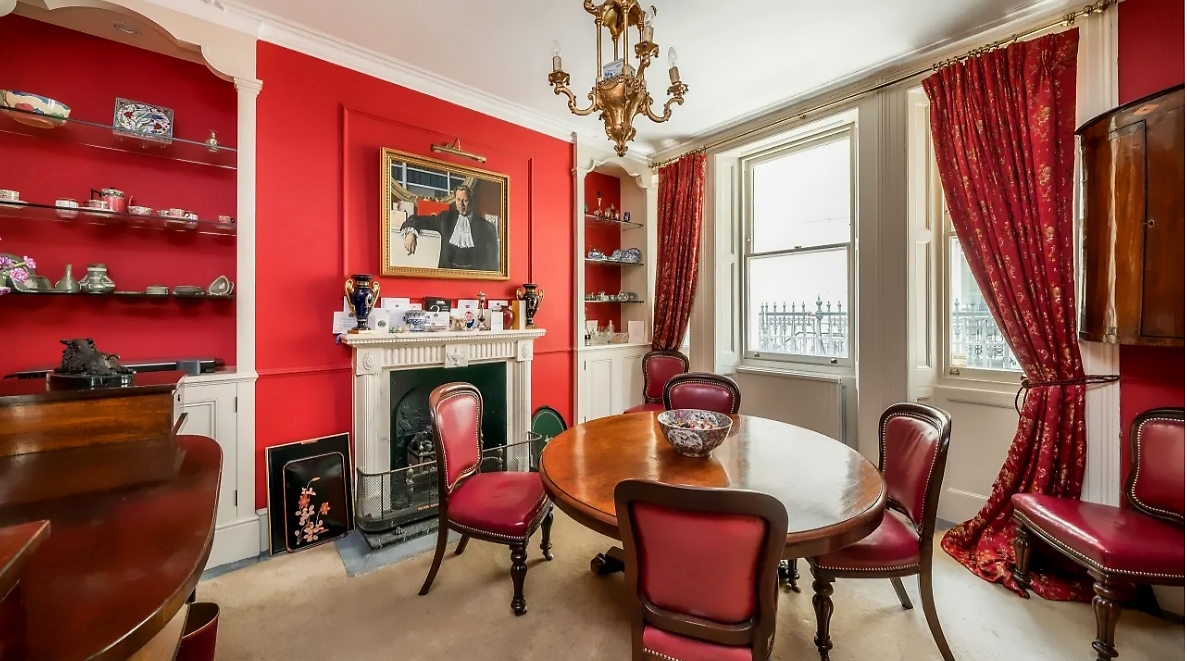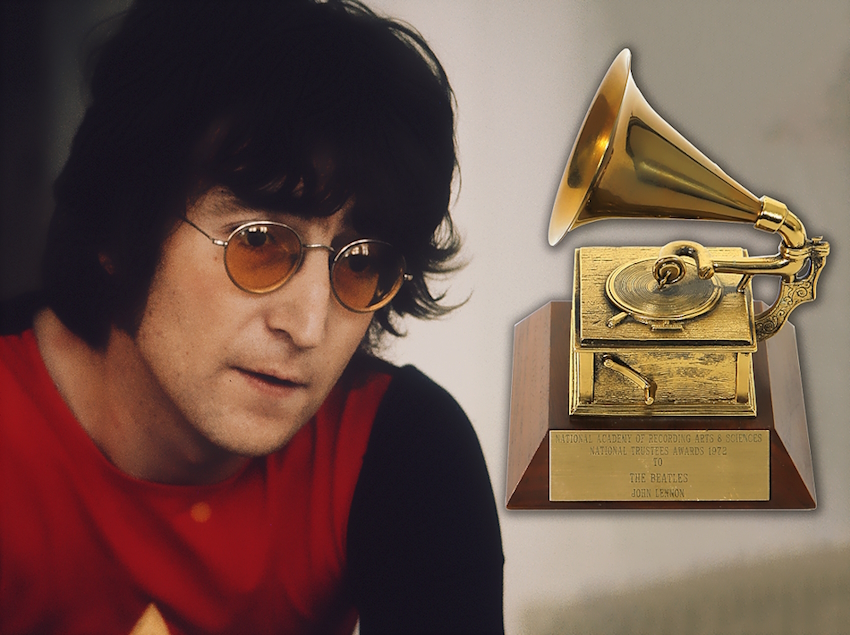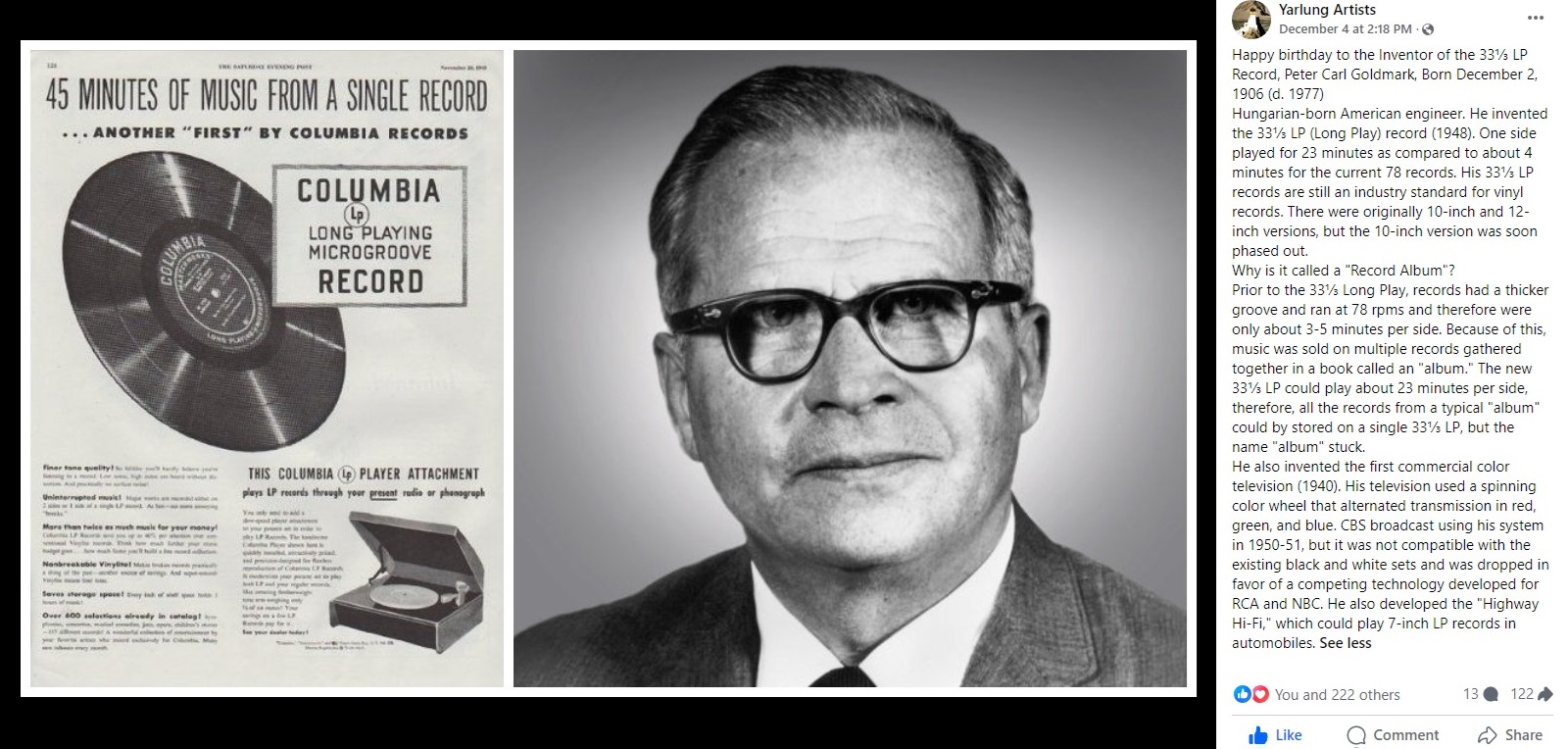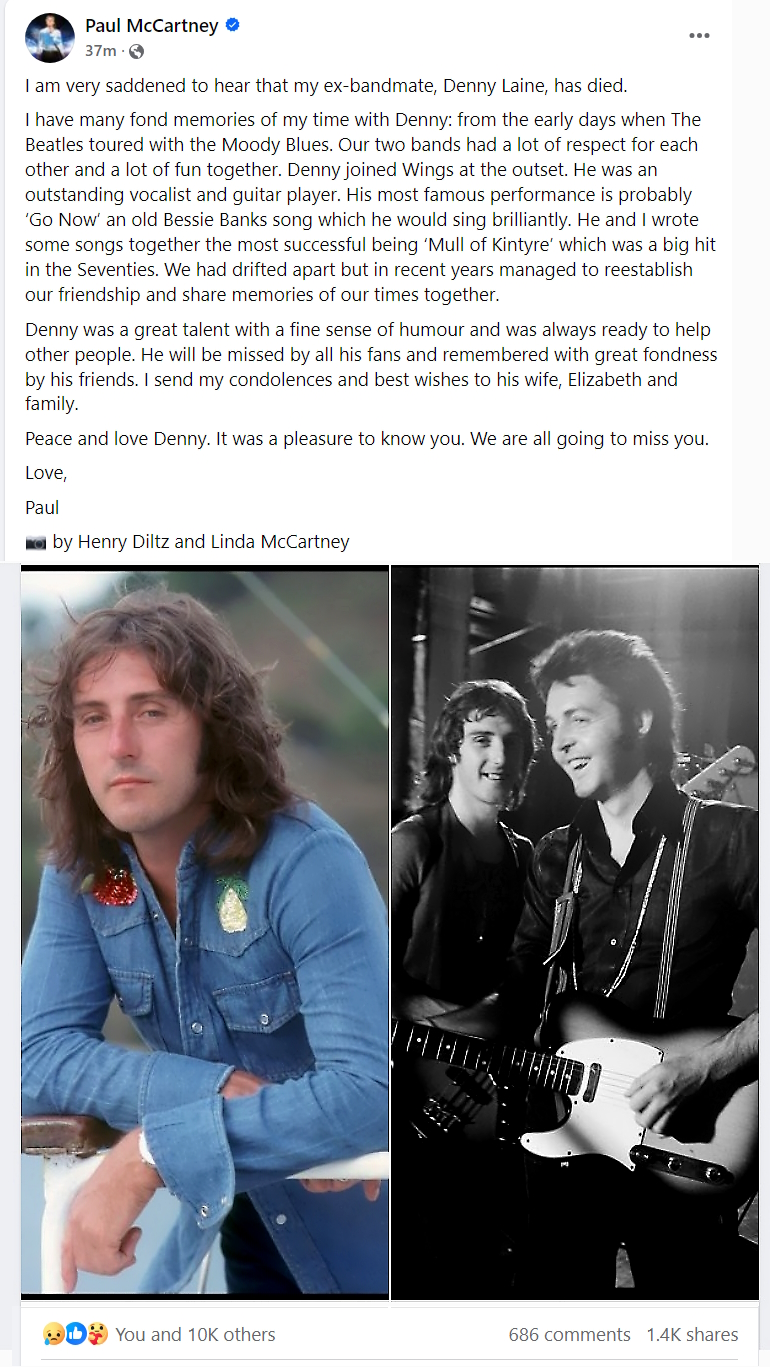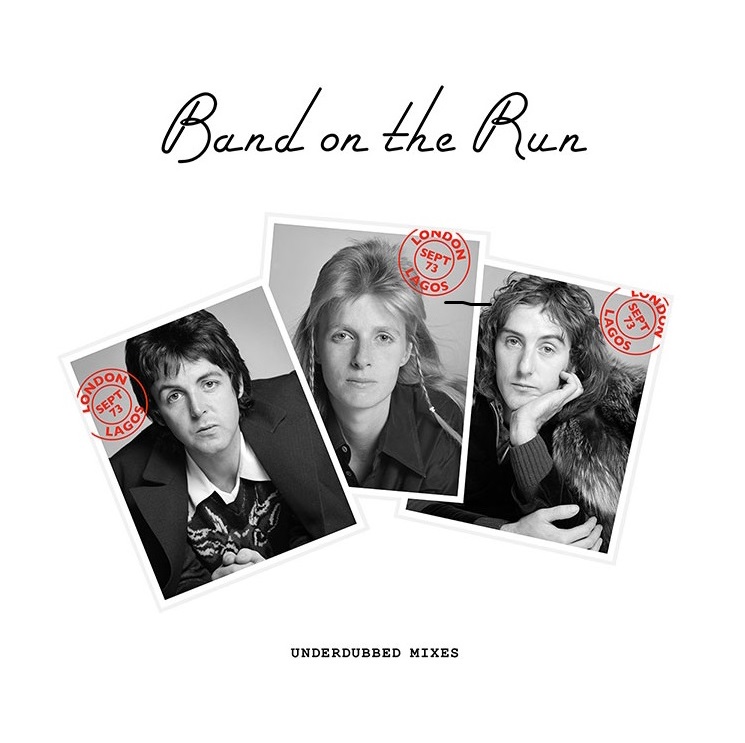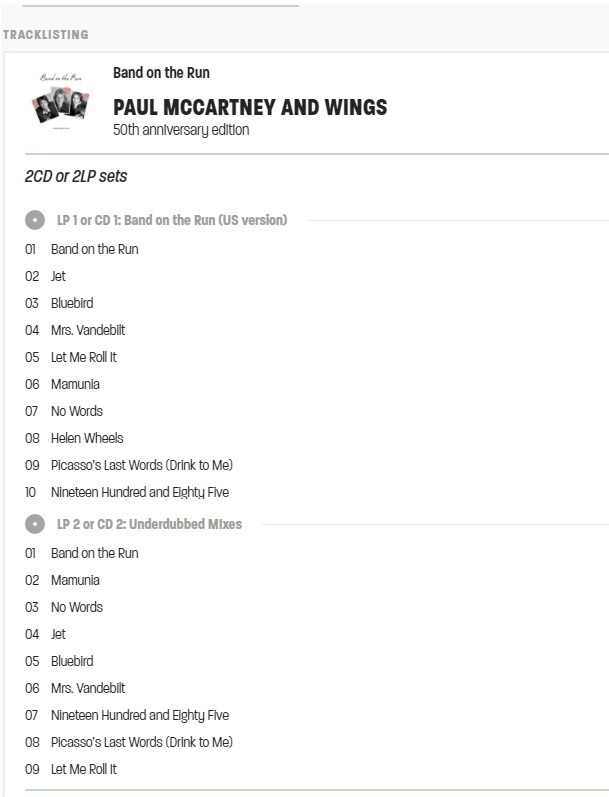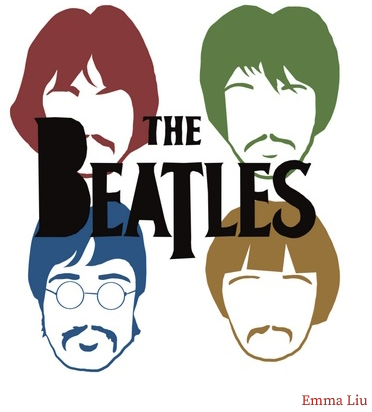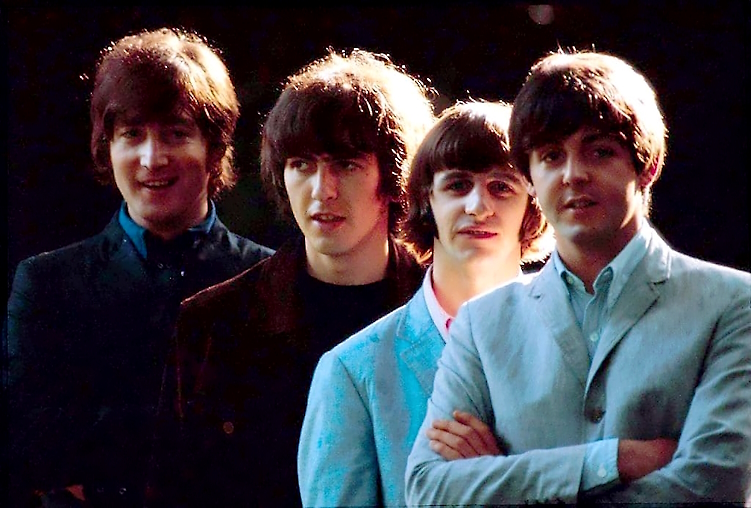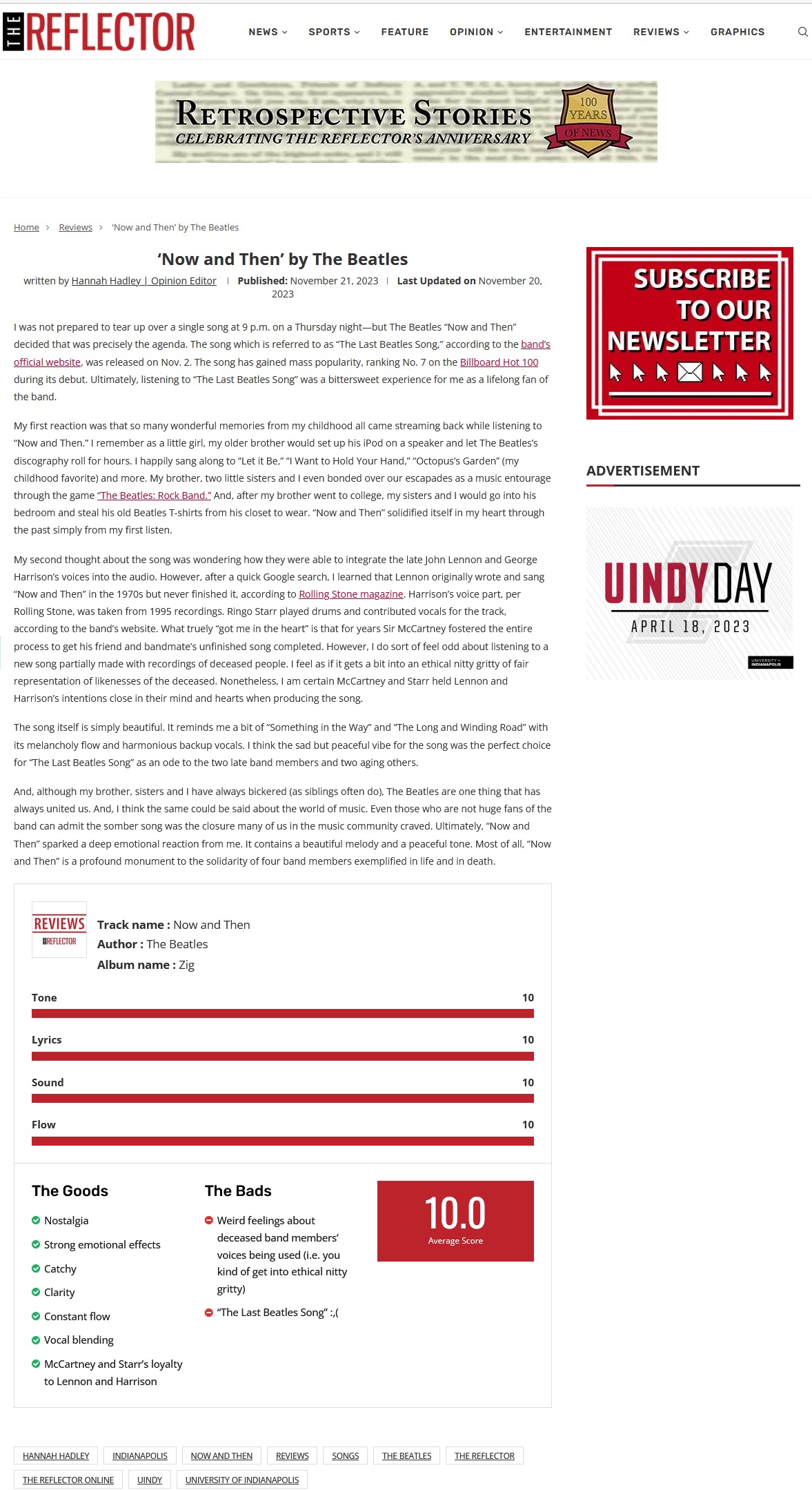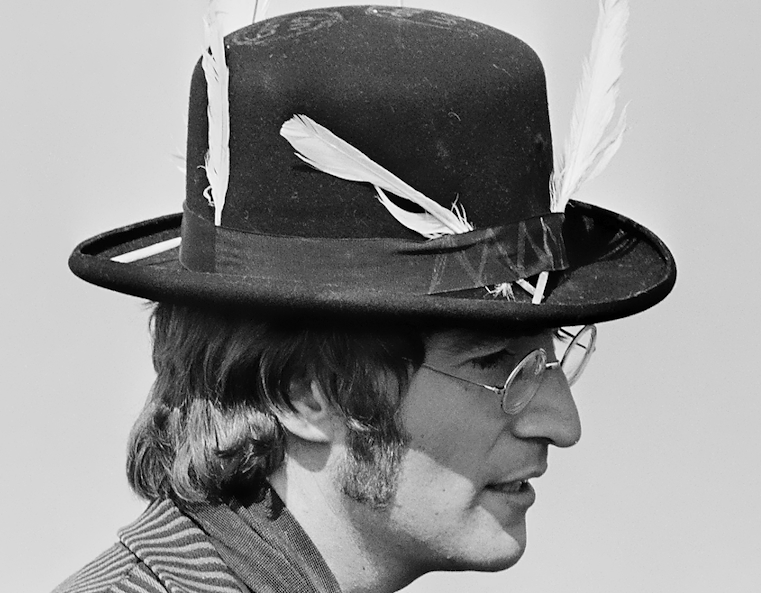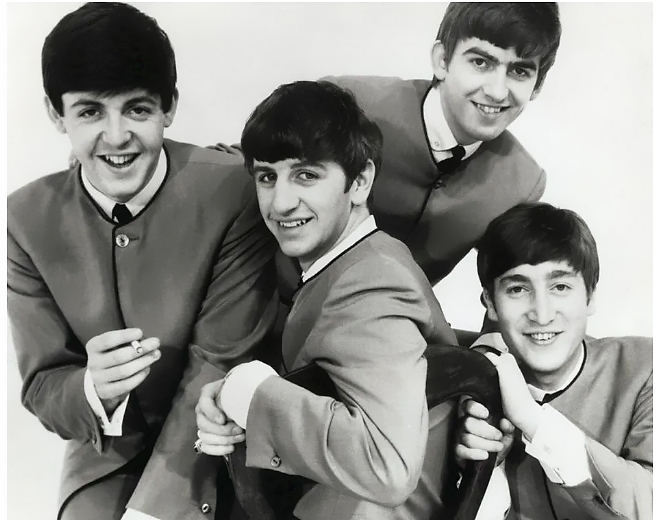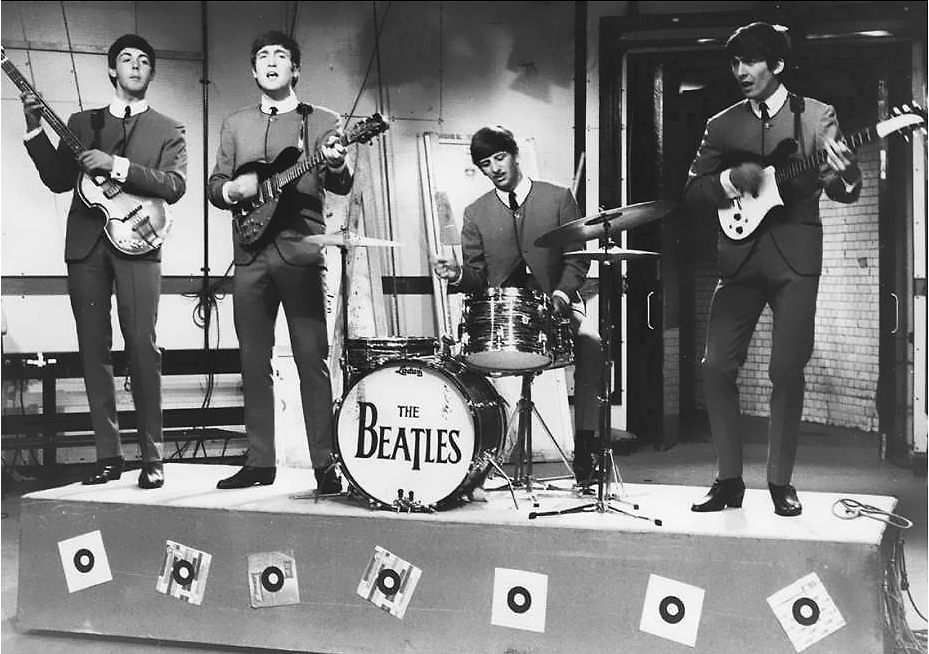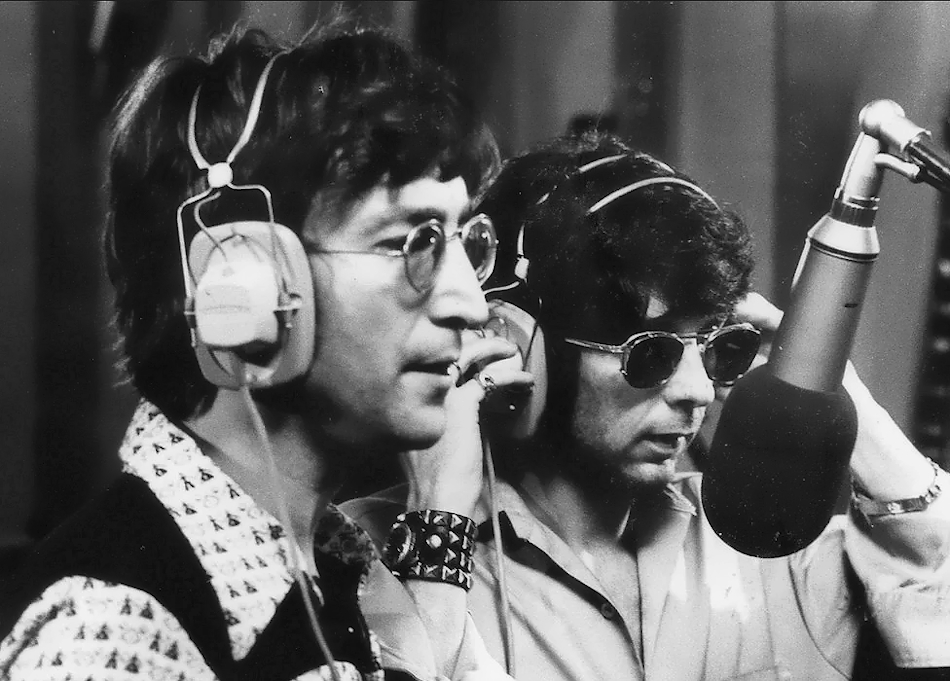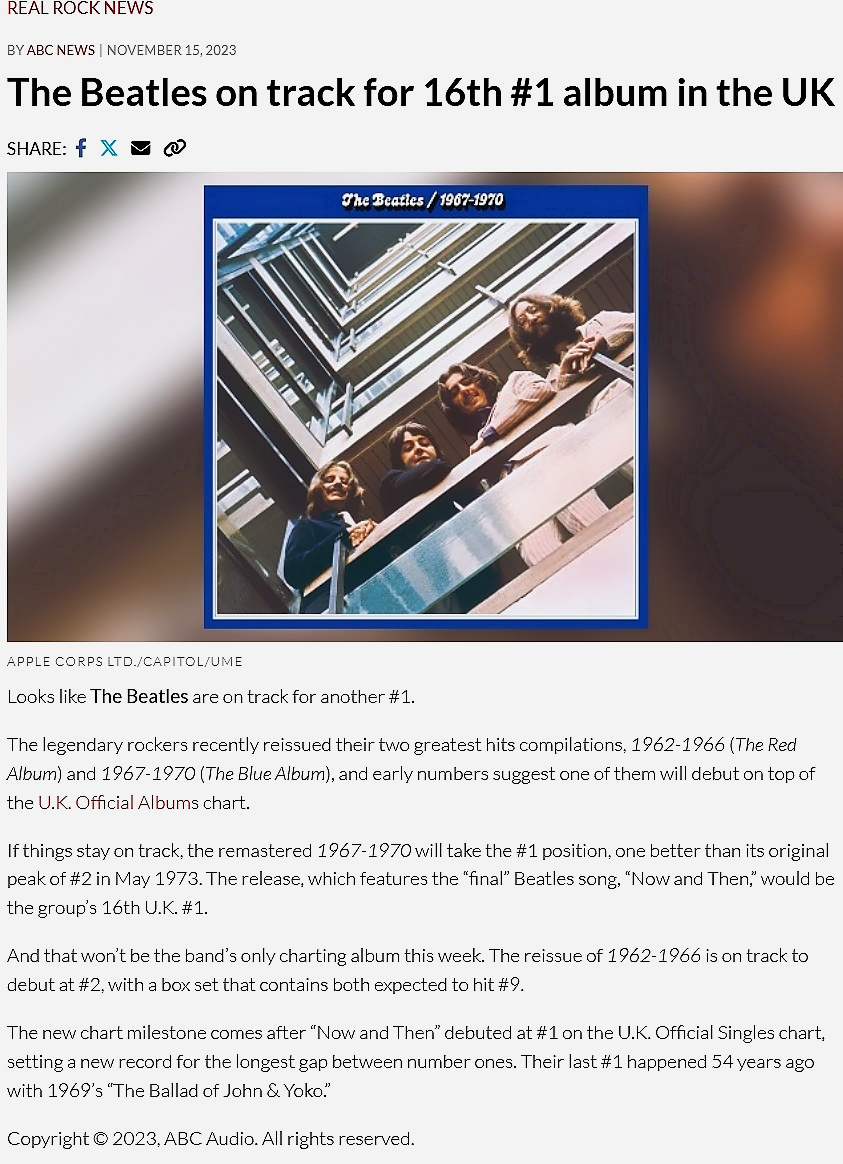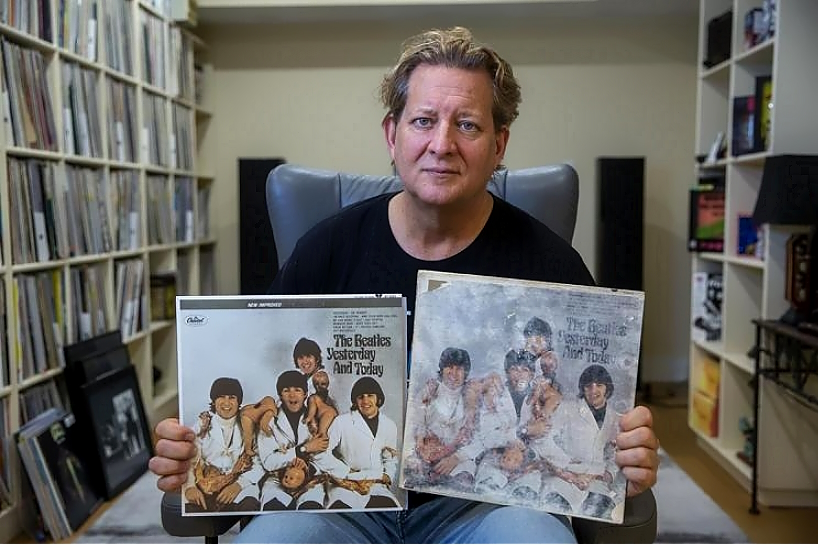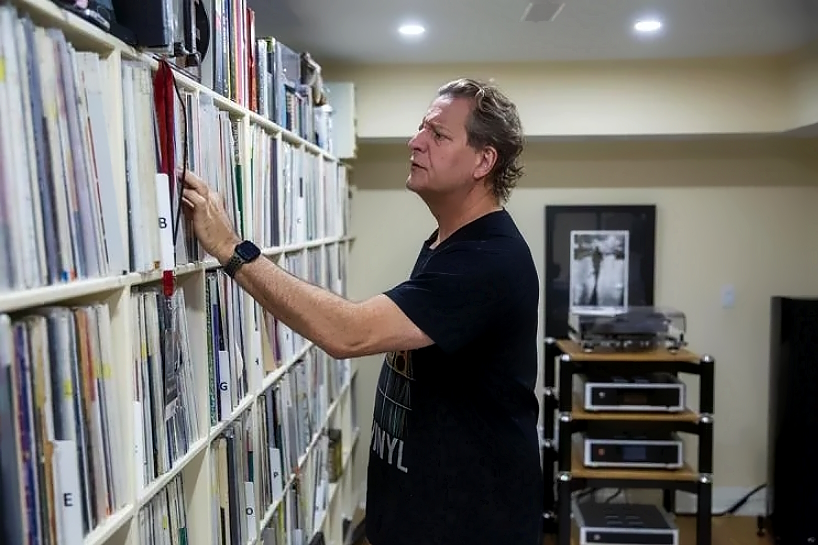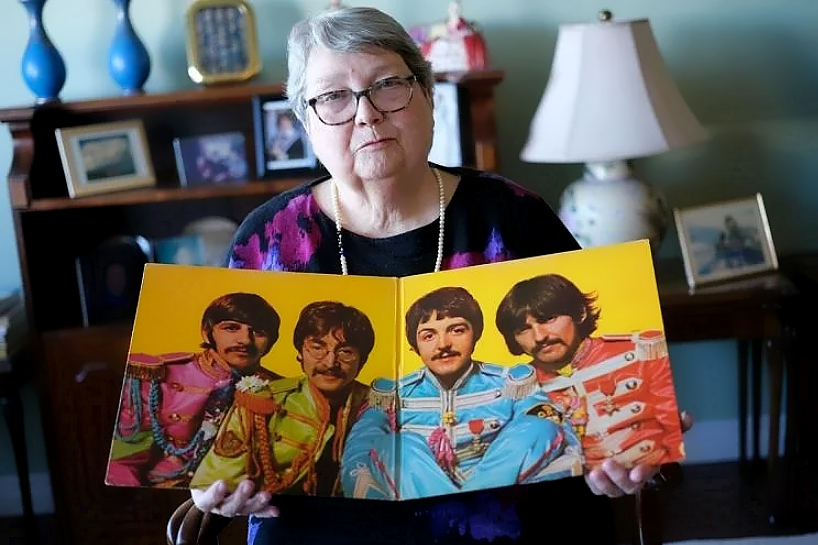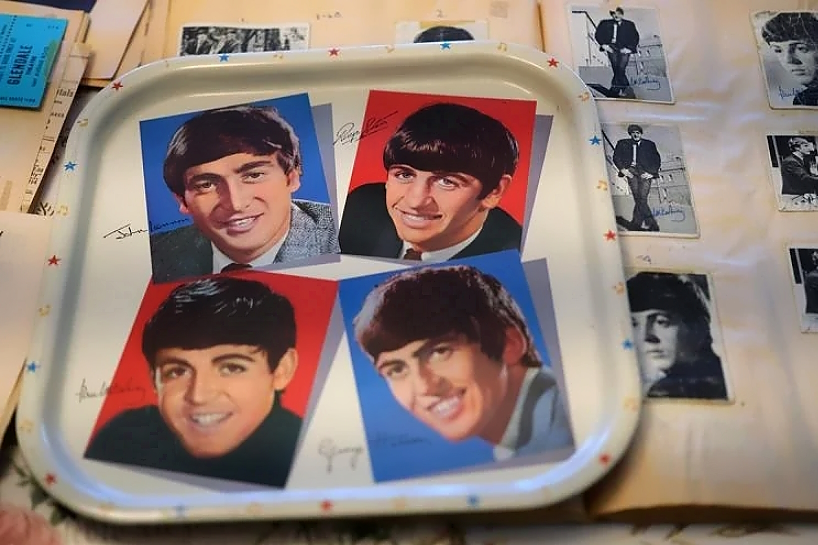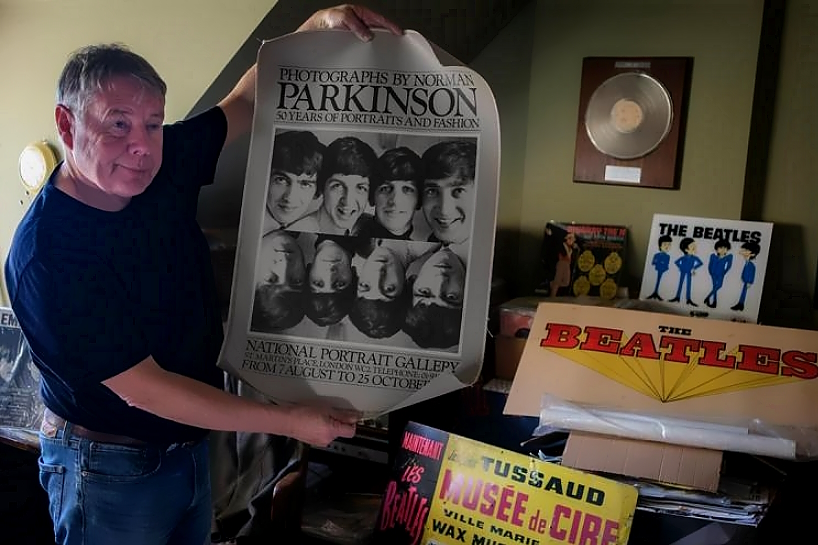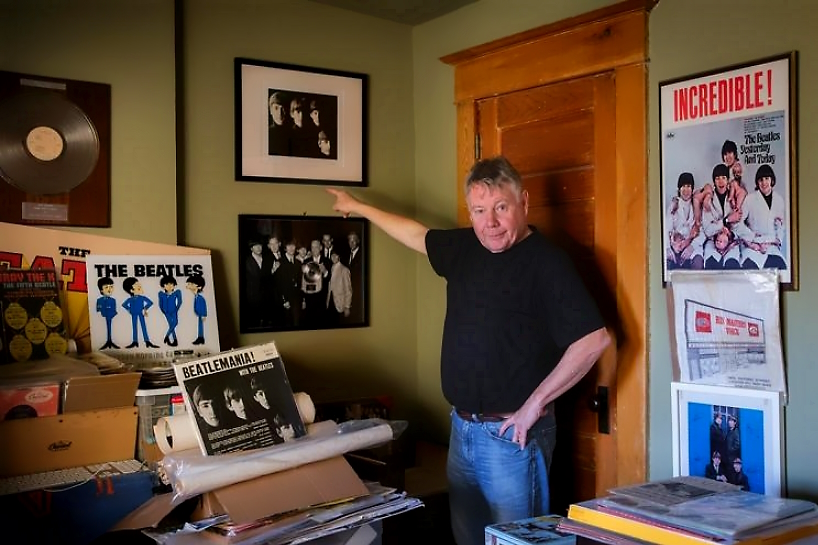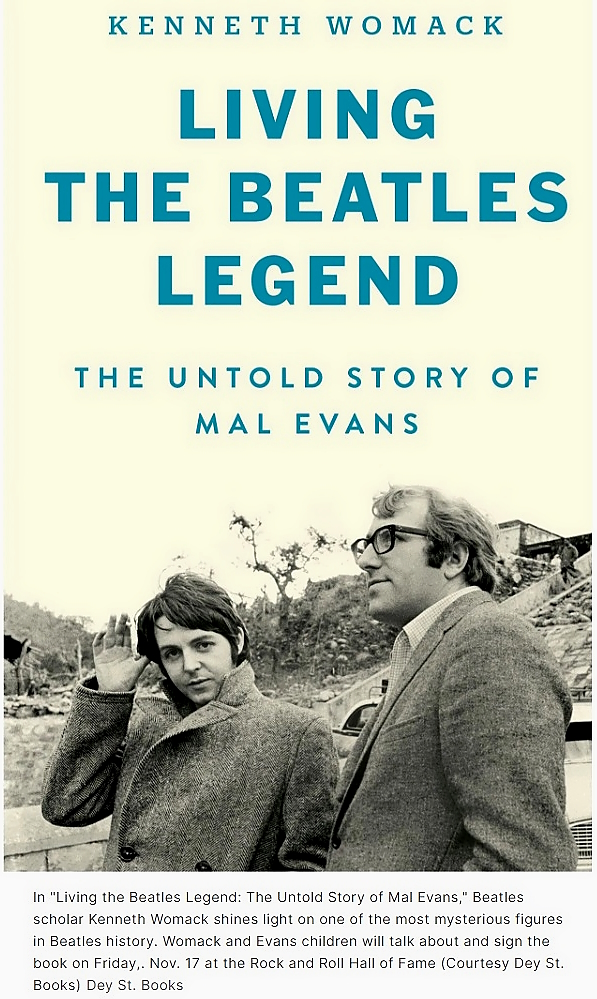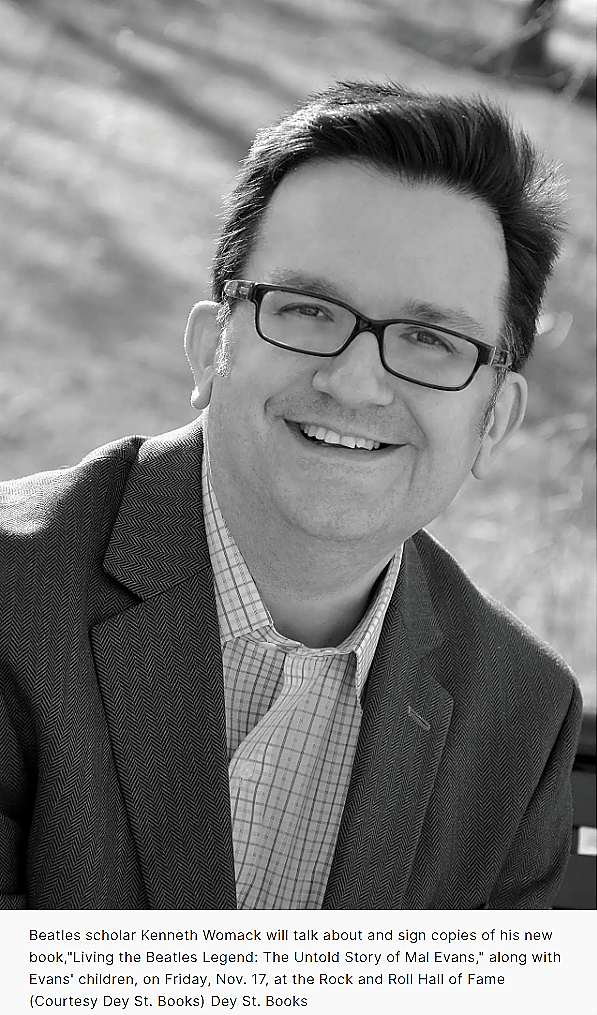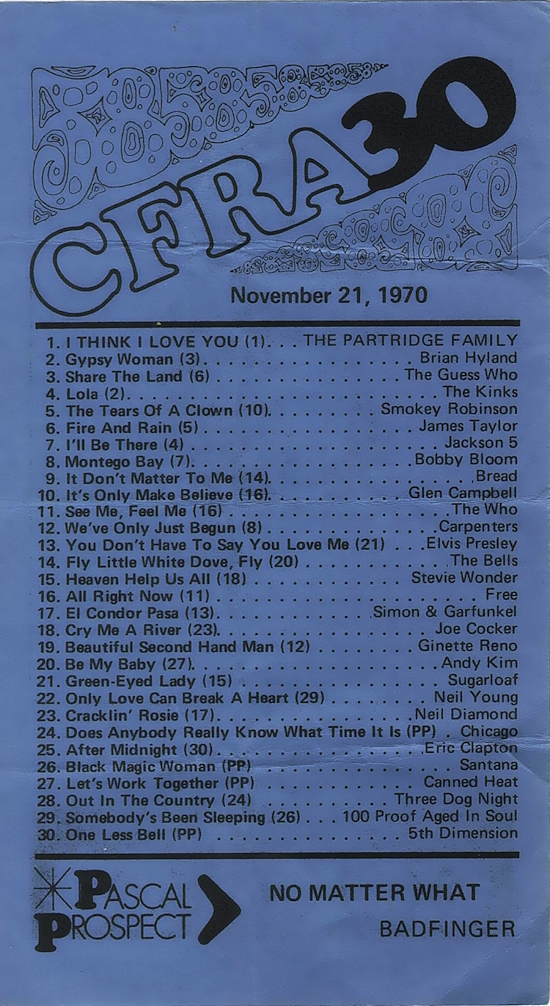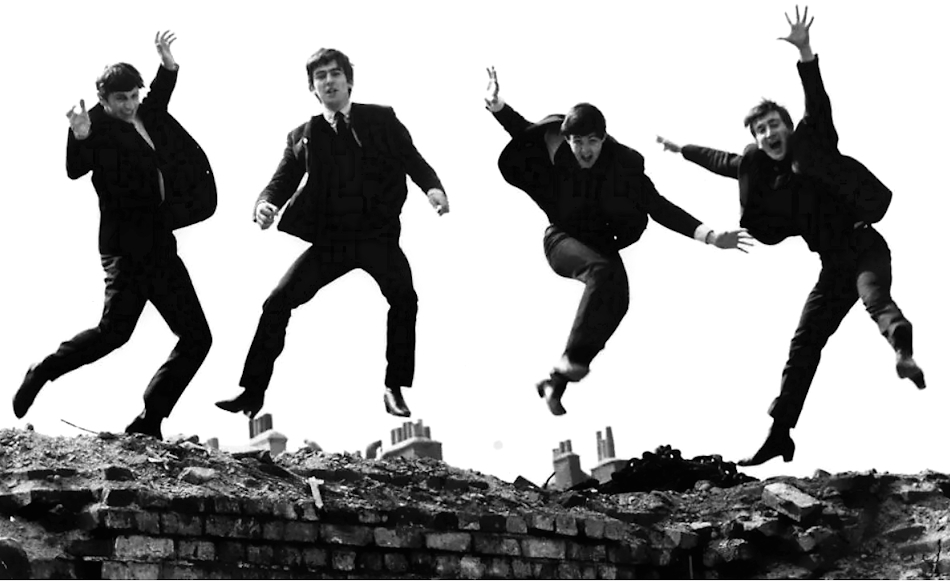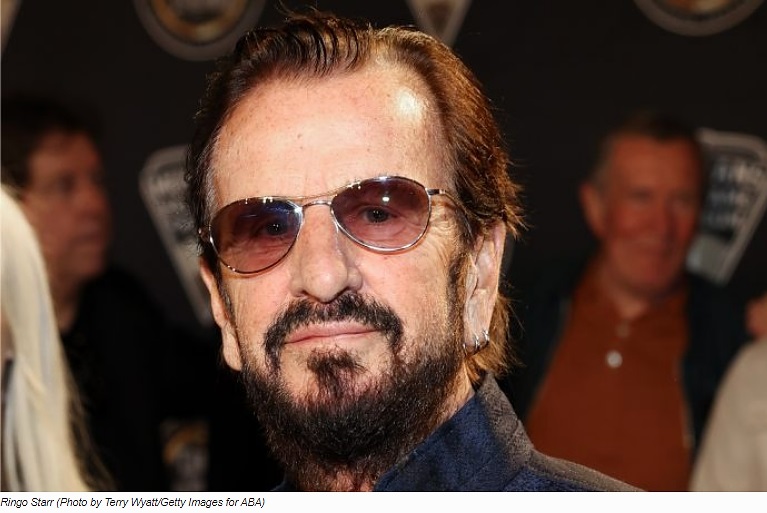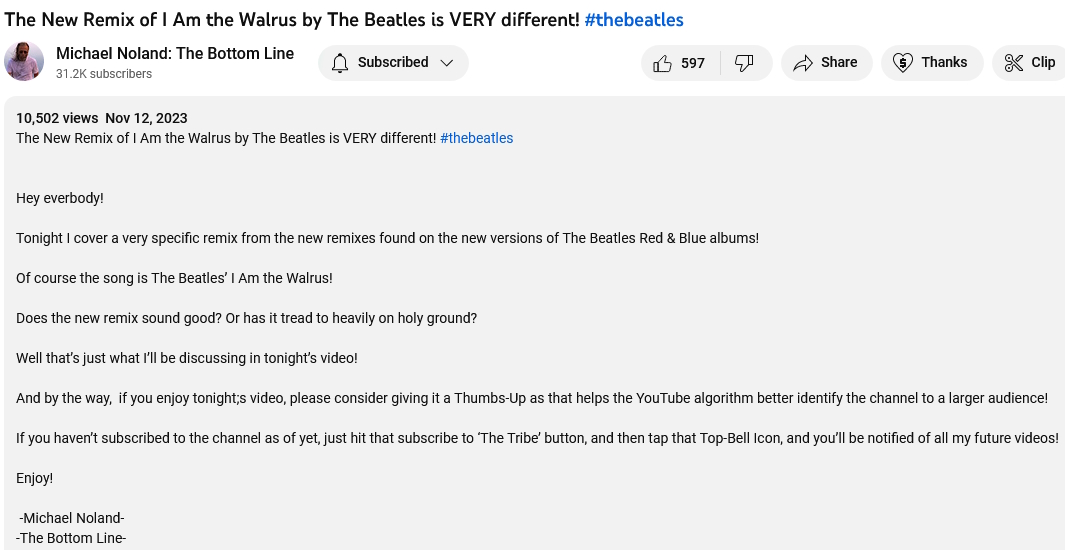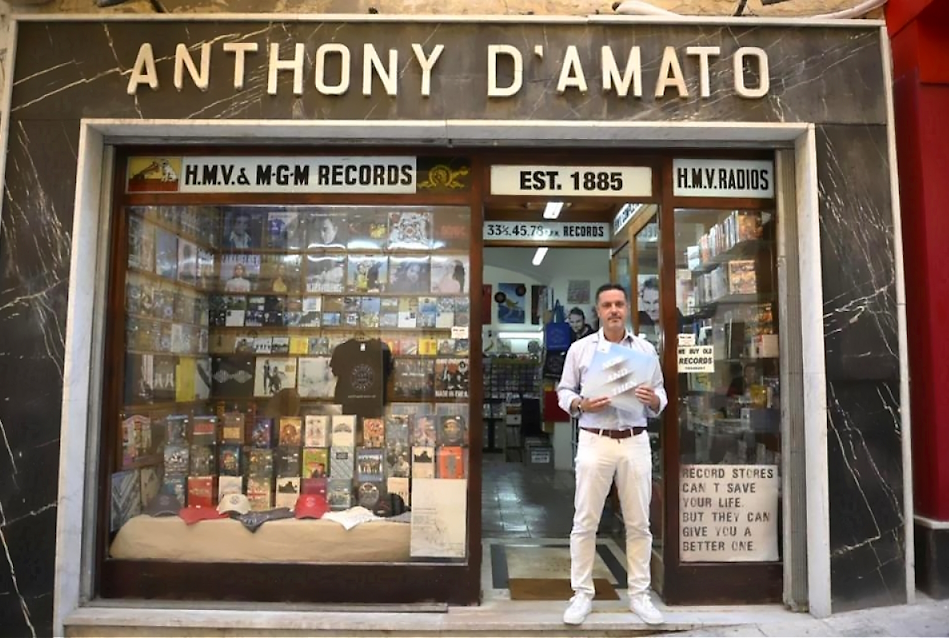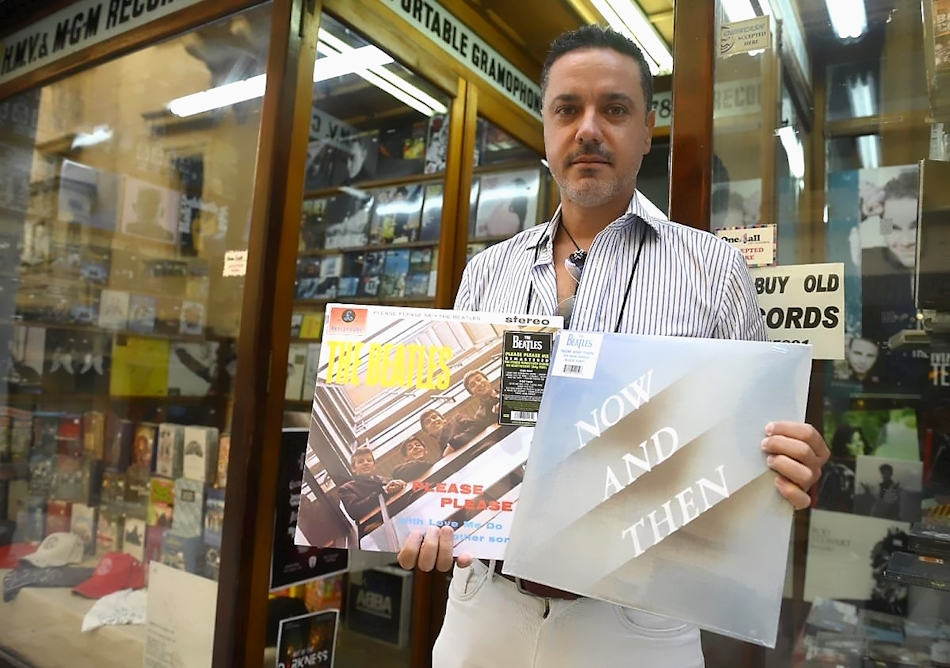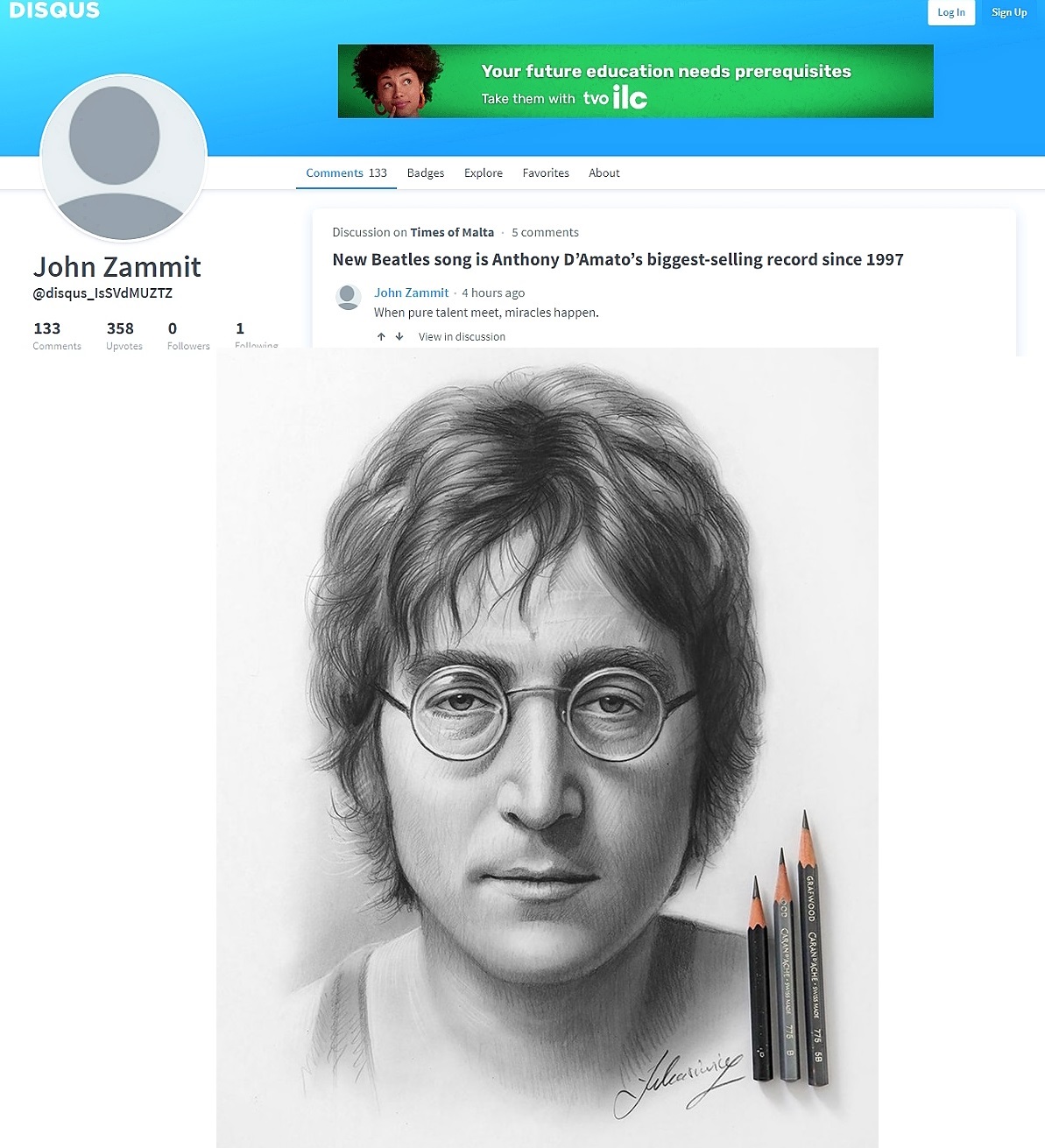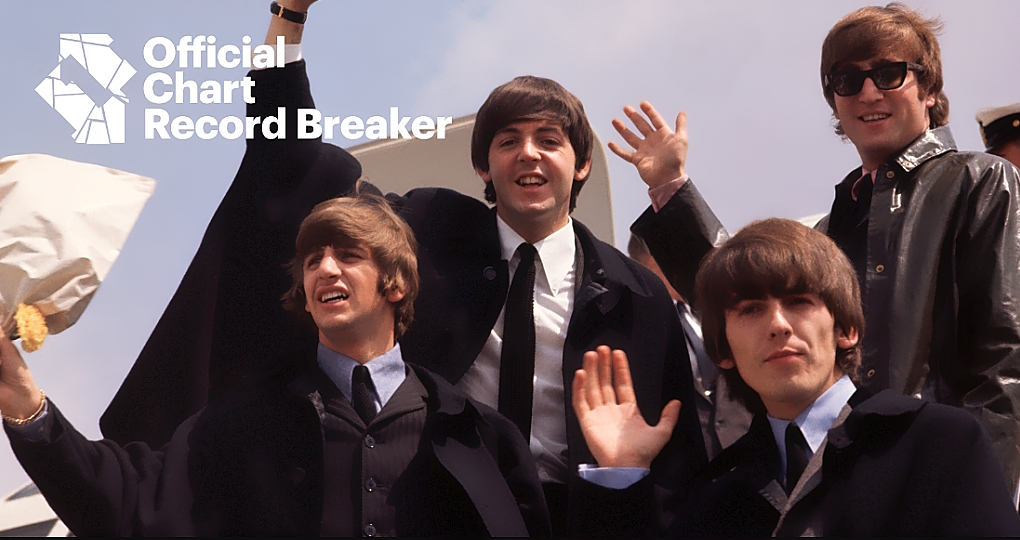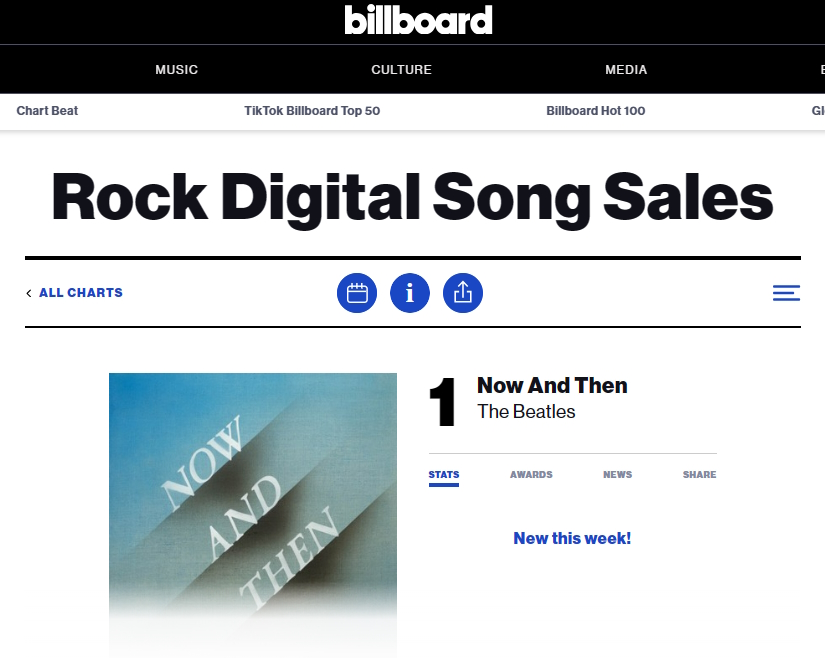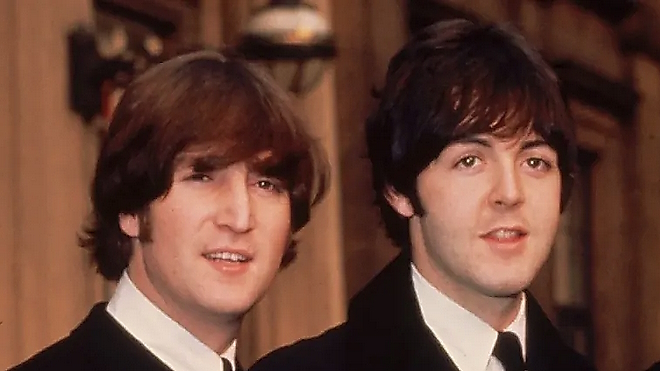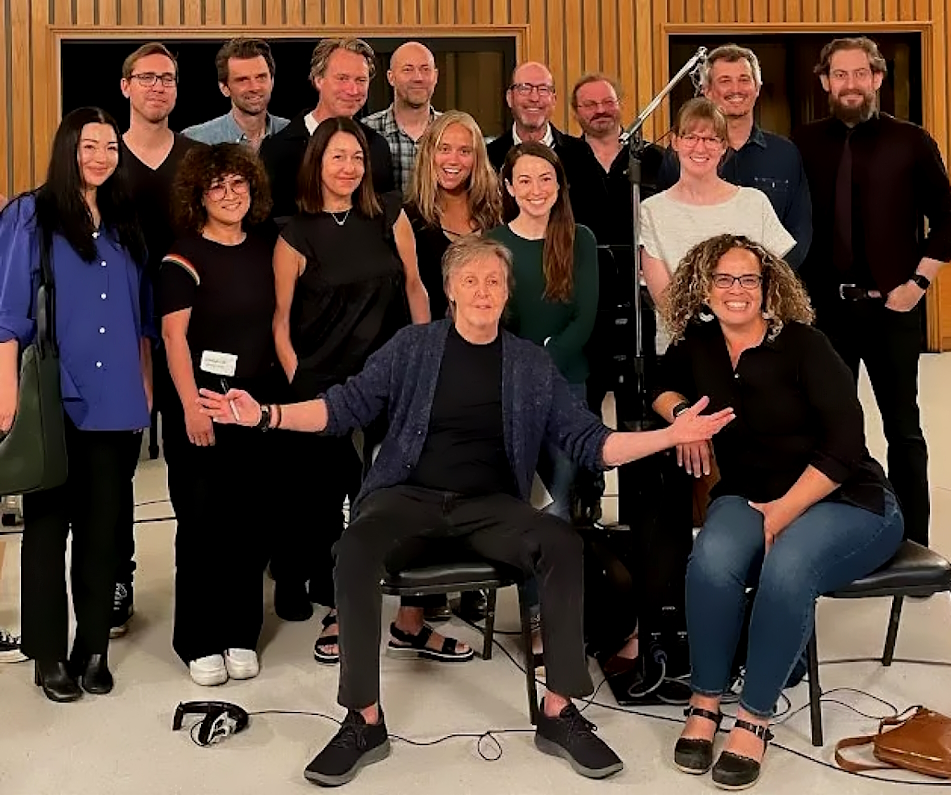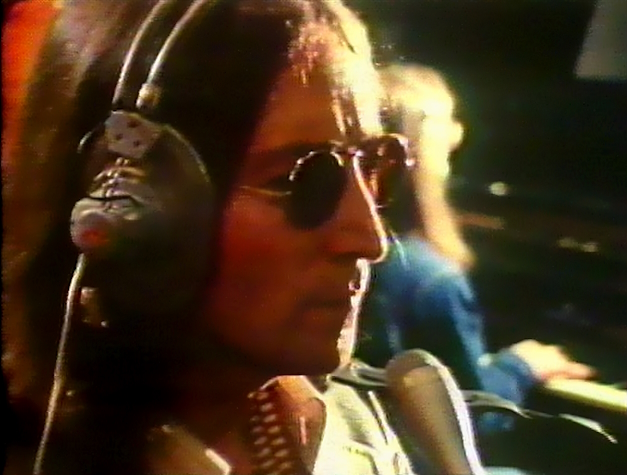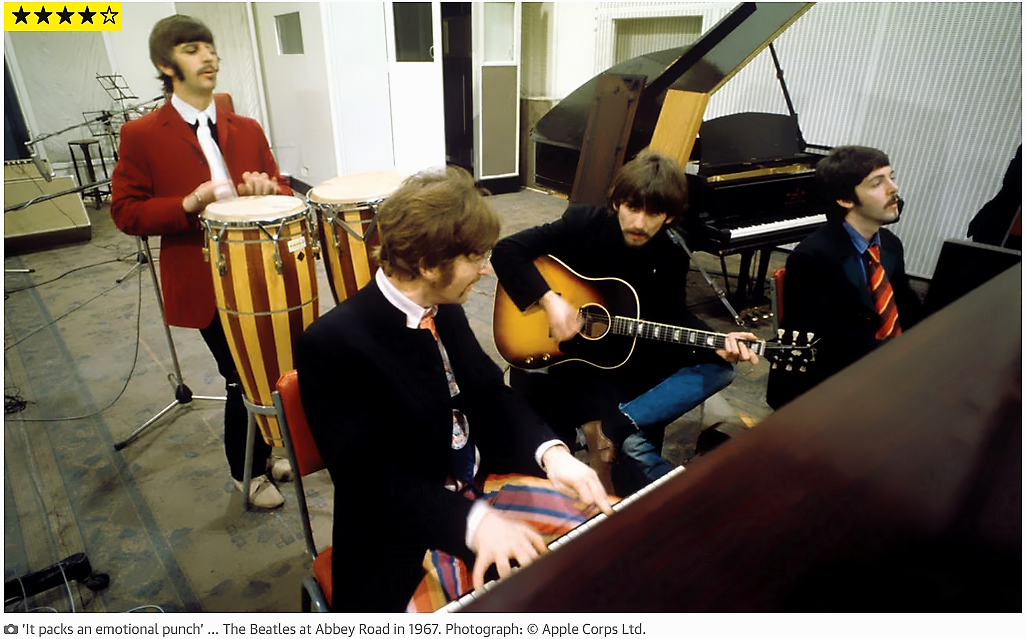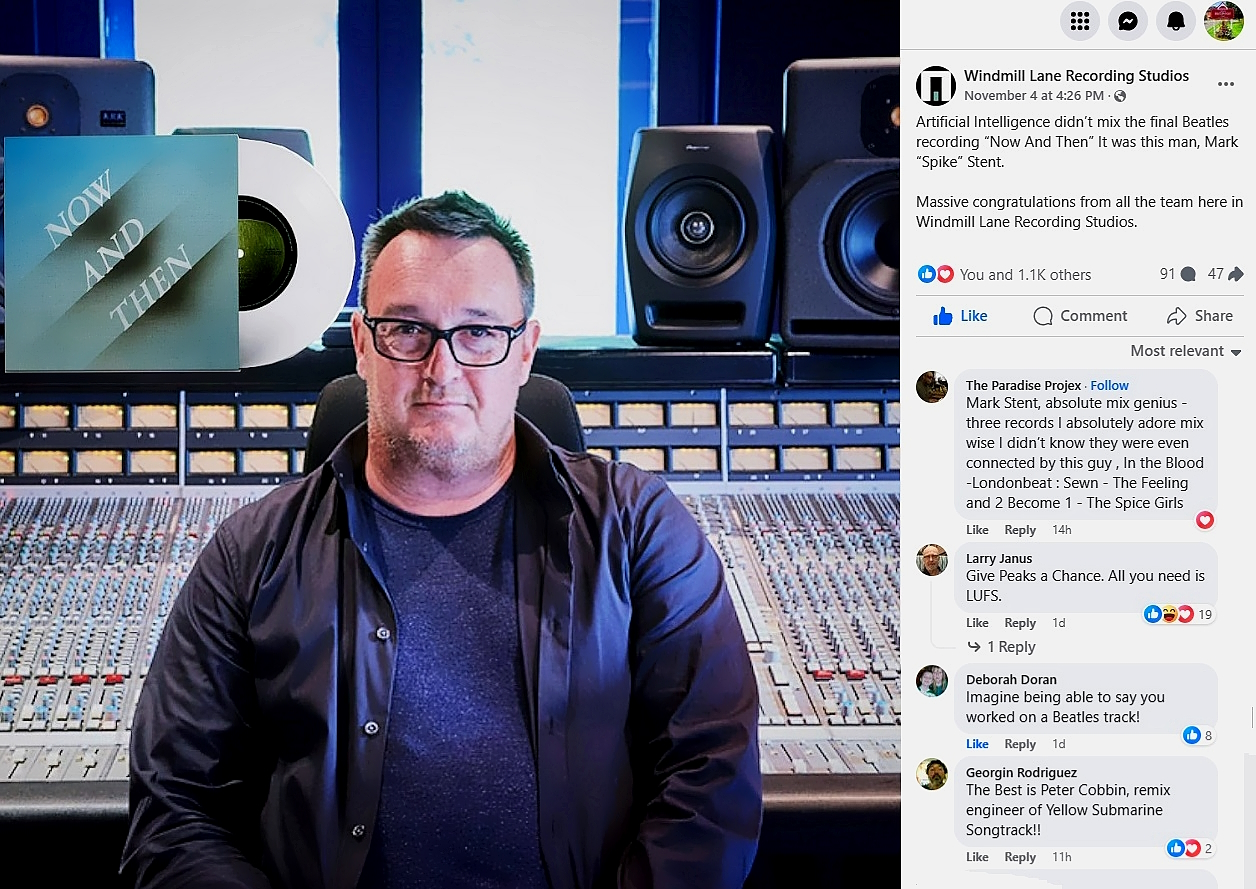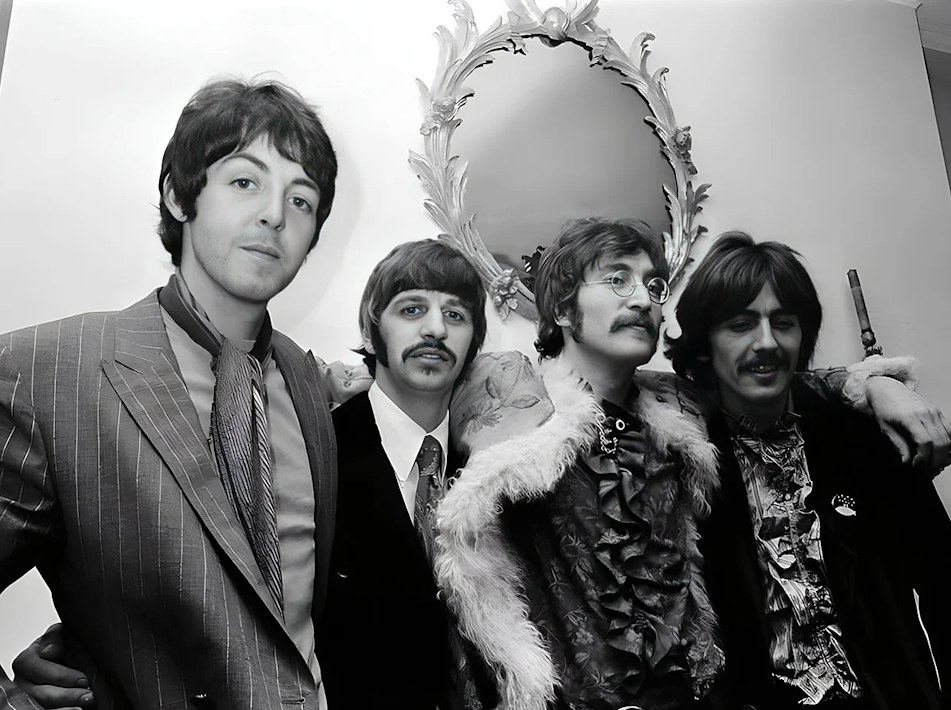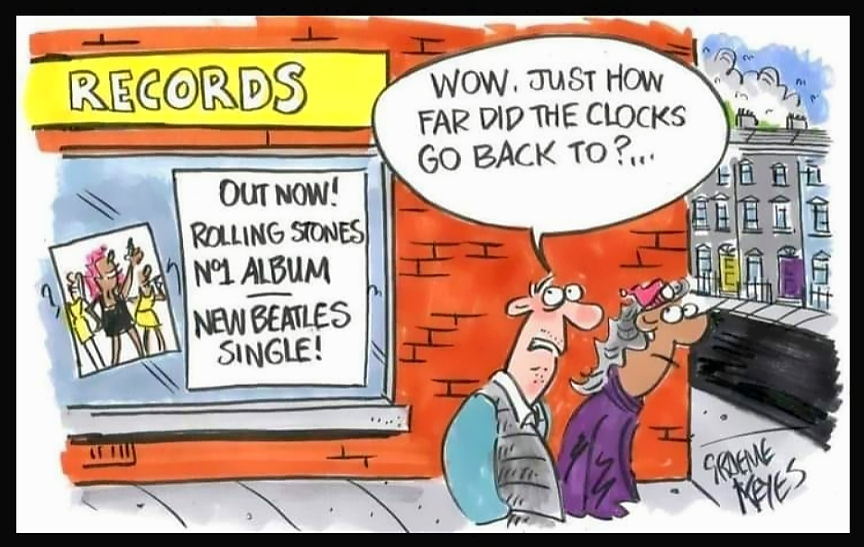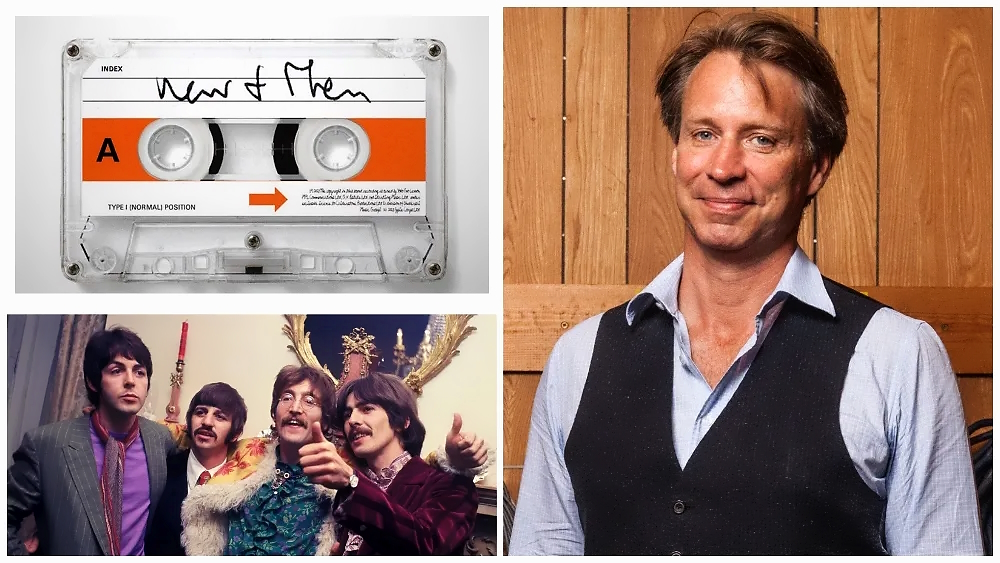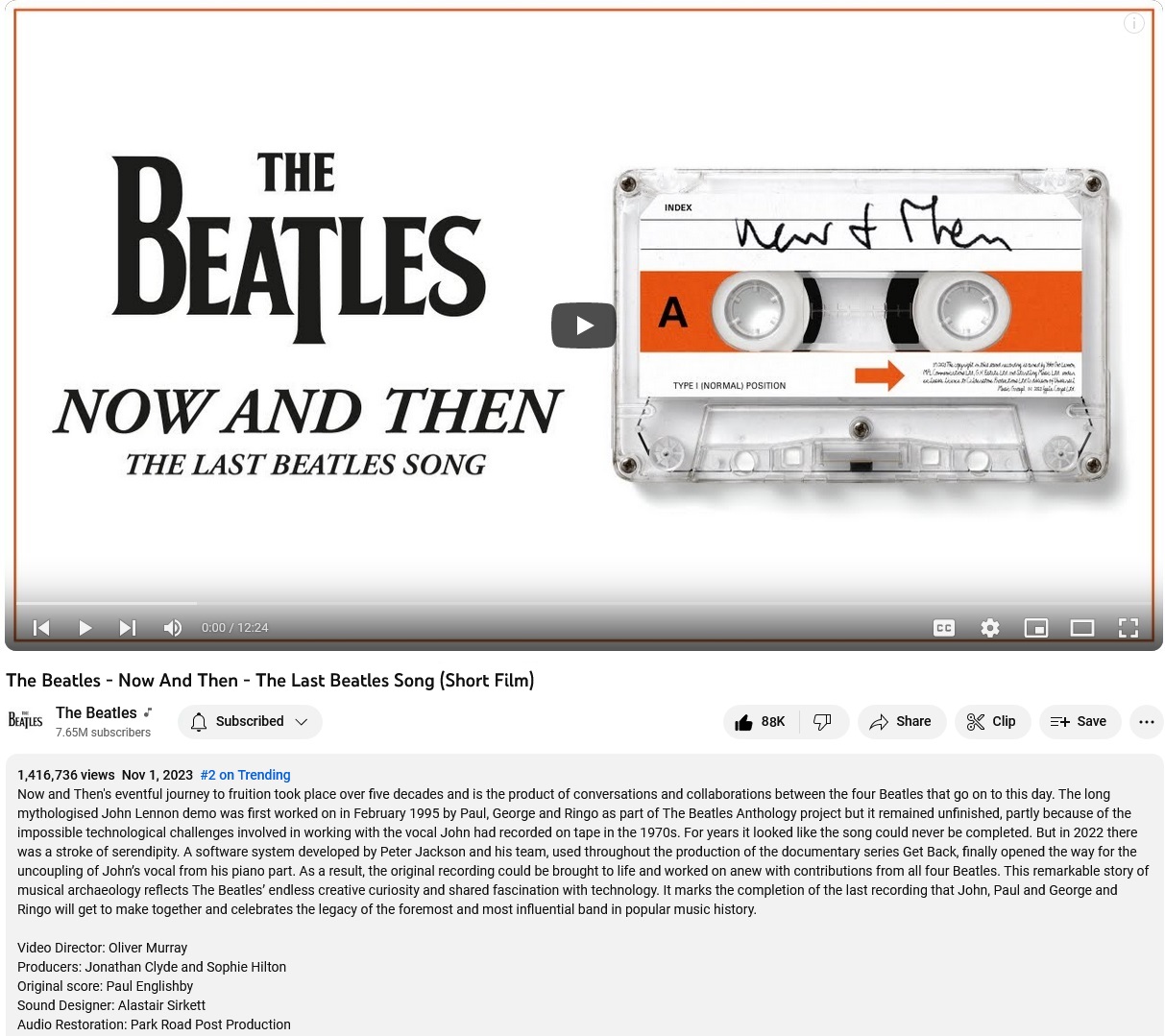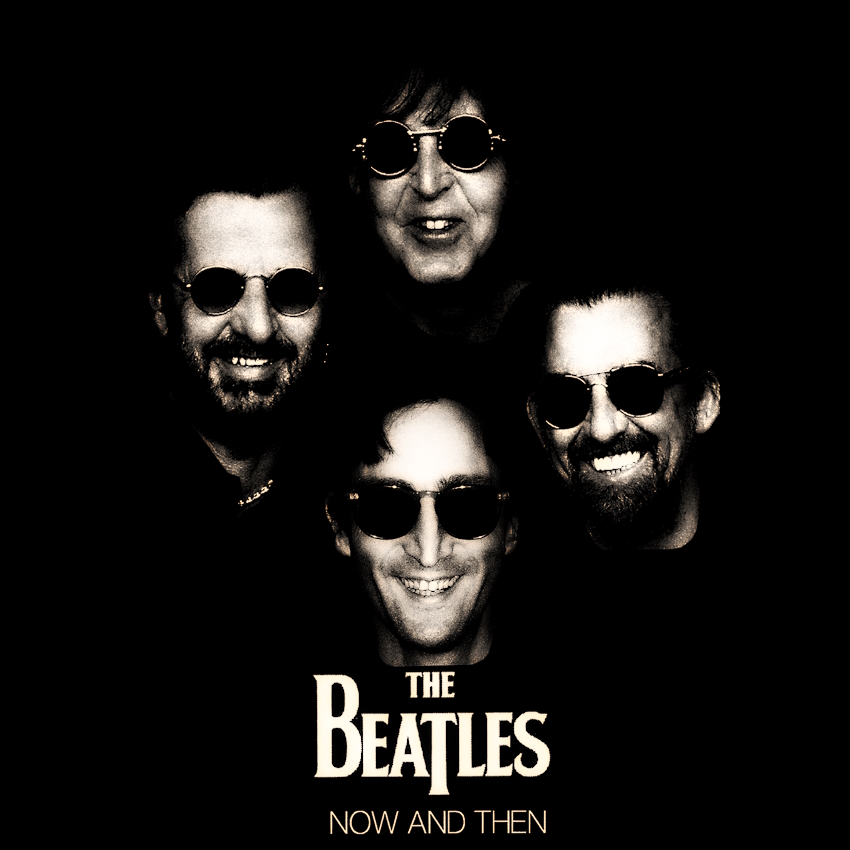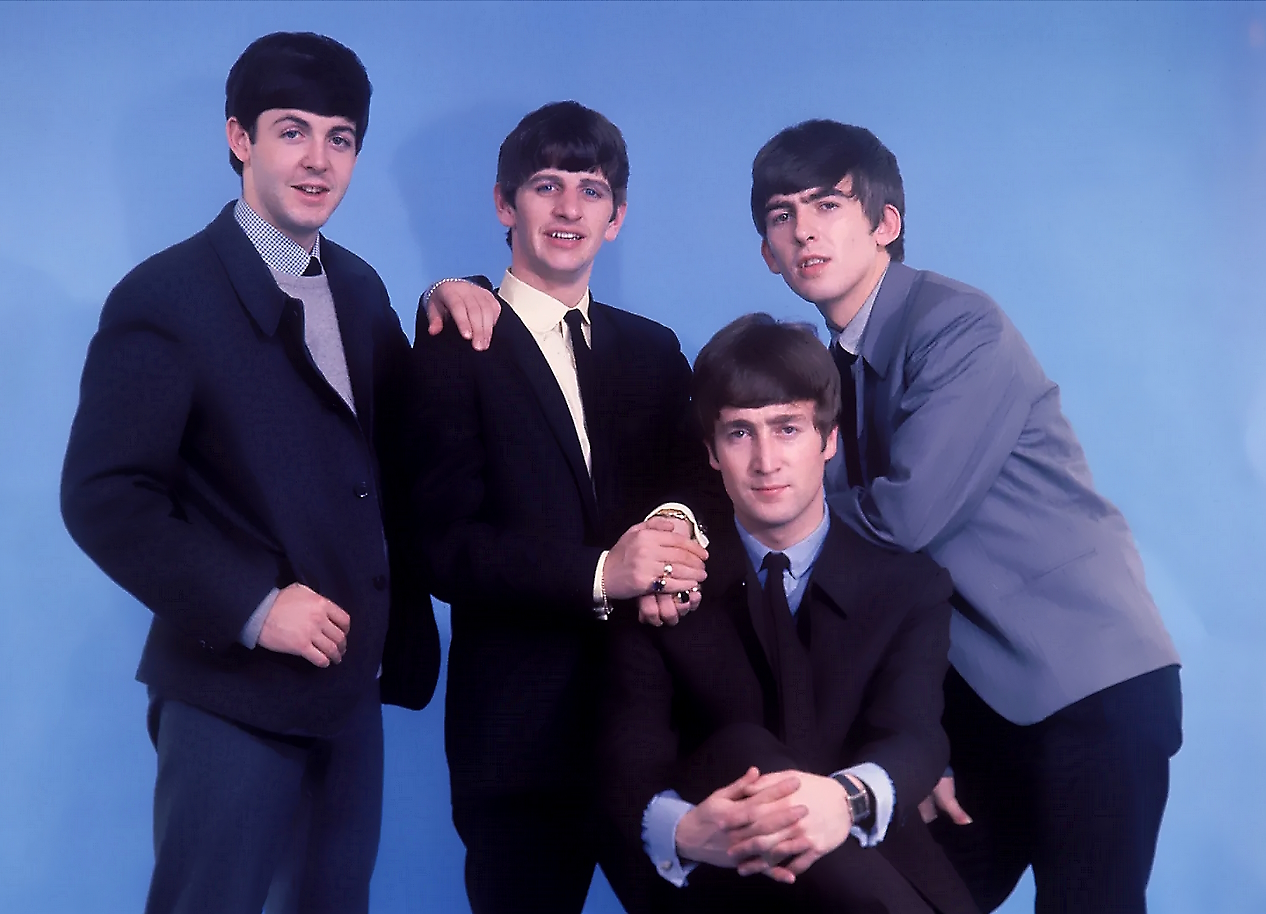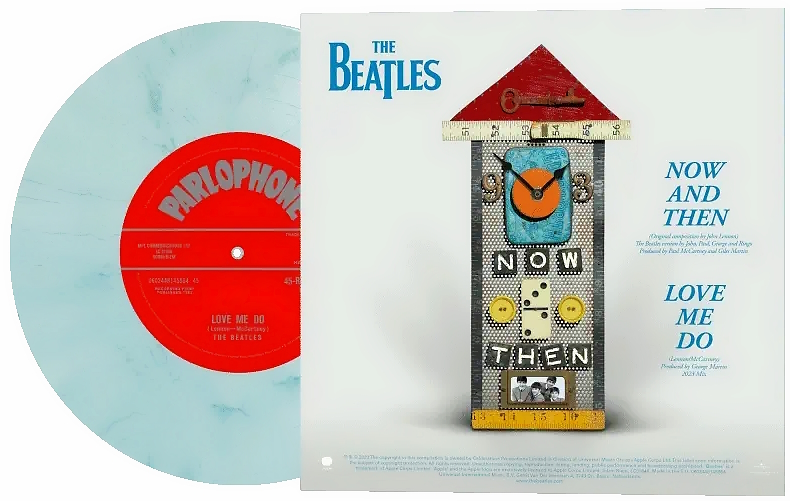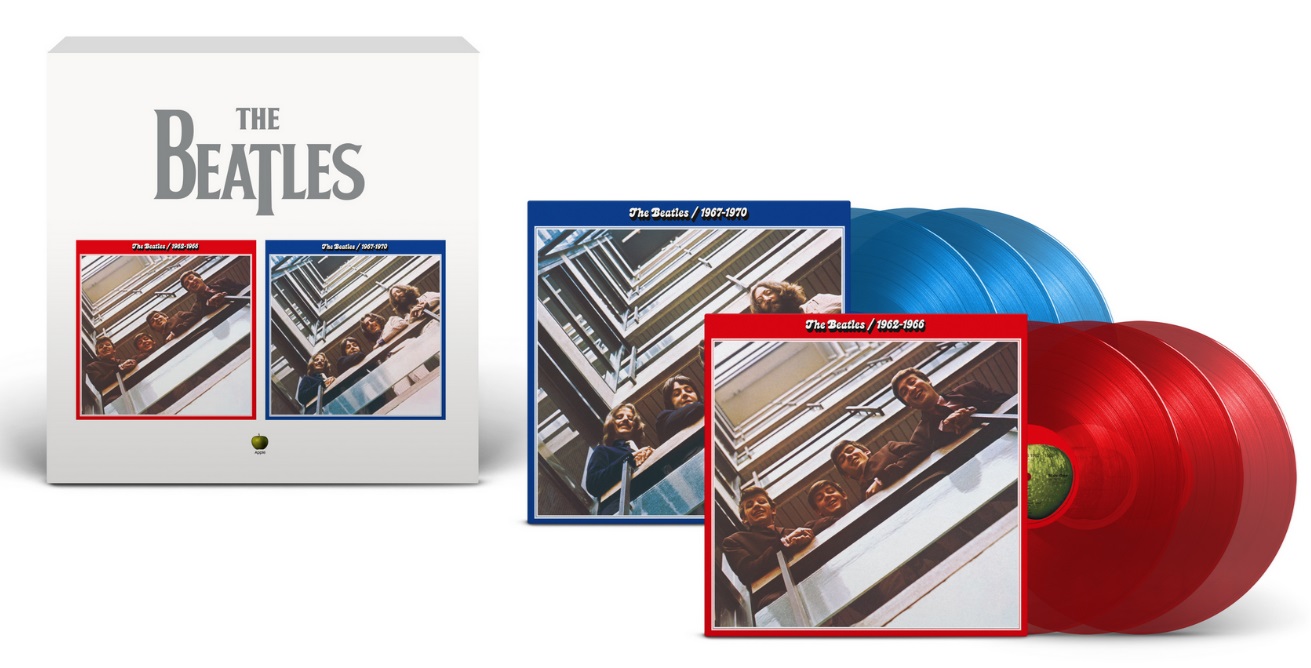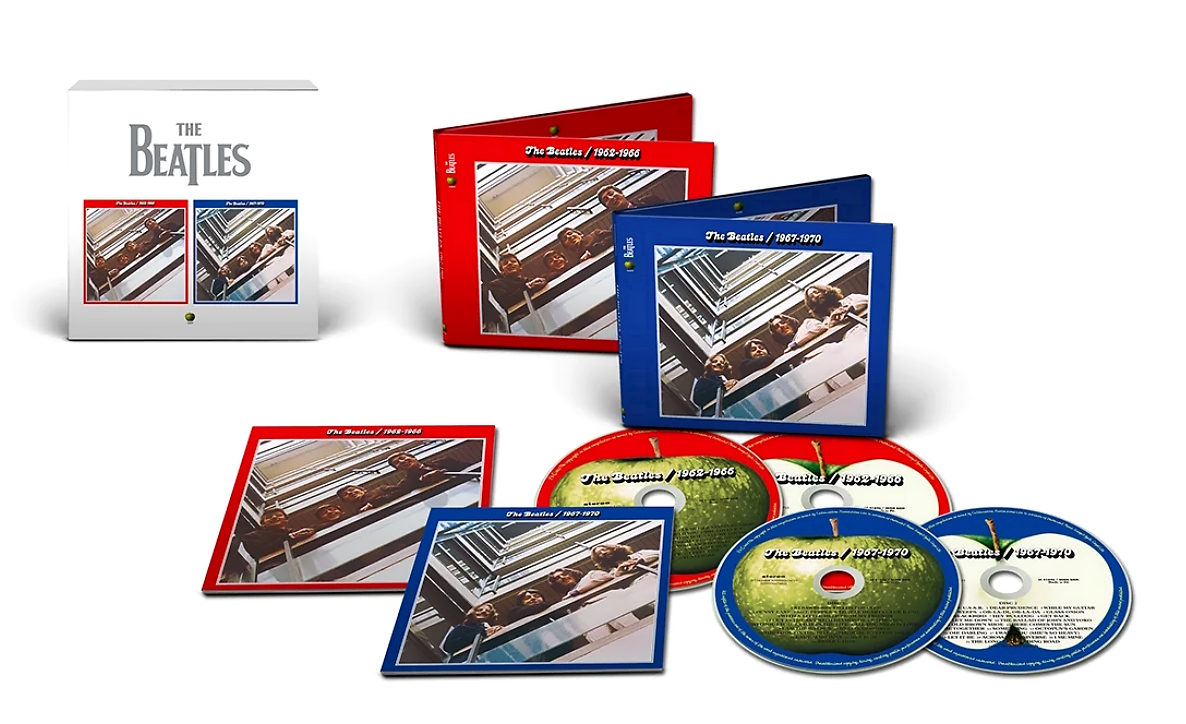Music writer Rob Tannenbaum is the coauthor of I Want My MTV: The Uncensored Story of the Music Video Revolution and contributes to The New York Times, the Los Angeles Times and GQ. This is his first cover story for AARP The Magazine. Additional reporting by Caitlin Rossmann.
|
| ||||||||||||||||||||||||||||||||||||||||||||||||||||||||||||||||||||||||||||||||||||||||||||||||||||||||||||||||||||||||||||||||||||||||||||||||||||||||||||||||||||||||||||||||||||||||||||||||
|
The News Today
December 21, 2023
By Andrew of Parlogram Auctions  December 20, 2023
 December 18, 2023 By Andrew of Parlogram Auctions If you have some Beatles records or are looking to sell, we take a look in this video about how you can discover their value and get the best prices for them. Alterntively, if you're looking to build a Beatles vnyl colletion in 2024, we tell you what the best value options are, where to find them and how to avoid getting scammed. Julian Lennon on John, Paul, "Hey Jude," Yoko...and Love "Hey Jude" was written for the son of Beatles legend John Lennon. Fifty-four years later, he released an album called simply Jude. By Ryan D'Agostino for Esquire
The day the Julian Lennon album Valotte was released in 1984, my older brother and I pooled our lawn-mowing money and rode our bikes to Record Express in West Hartford, Connecticut. Our local top-40 station, 96.5 WTIC FM, was playing “Too Late for Goodbyes” every other song—MTV too—and we had to have it.
I still have the album. He’s on the cover, black-and-white, sitting backward on a chair, staring out at you, unsmiling. I know now, though I didn’t know then, how much he looks like his father in that shot. I was 9 years old. The album was probably my gateway to the Beatles, the first lesson in an education.
A year ago, I interviewed Lennon. The Beatles documentary Get Back had just come out, and Lennon had seen it with his half-brother, Sean. (Sean’s mother is Yoko Ono; Julian’s was Cynthia Powell, John Lennon’s first wife.) The interview was meant to be part of a larger project about what it’s like to have a song written about you. “Hey Jude” was written by Paul McCartney about Julian and Cynthia; a friend of mine, Chadwick Stokes of the band Dispatch, had recently written a song about me and my family and some hard times. That project is for another day; here, now, is my interview with Lennon. In it, he told me about his new record that was coming out. The title: Jude.
Esquire: The lore, of course, is that Paul wrote “Hey Jude” as consolation when your parents were splitting up.
Julian Lennon: It was “Hey Jules” at first, but that didn’t quite sit well rhythmically. “Hey Jude” was a better interpretation. Paul wrote it to console Mom, and also to console me. It’s a beautiful sentiment, no question about that, and I’m very thankful—but I’ve also been driven up the wall by it. I love the fact that he wrote a song about me and for Mom, but depending on what side of the bed one woke up on, and where you’re hearing it, it can be a good or a slightly frustrating thing. But in my heart of hearts, there’s not a bad word I could say about it.
The lyrics are pertinent even now. They’re about making life better and taking the weight off my shoulders, especially on the path I followed as a musician—following Dad. It’s like, what are you, crazy? Why would you do that? I’ve chosen the hardest road known to mankind to follow, but that’s why after thirty years of doing music I felt it was time to follow some other dreams I had. Photography and a number of other things. The music will always be in my blood and that’s partly due to Dad and it’s partly due to the Beatles, especially after having watched Get Back.
Sean didn’t really want to go to the Get Back premiere. He felt overwhelming pressure. And I didn’t particularly want to go. But he said he felt obligated to go, so because I love him so much I said, Listen, I’m coming with you. We’ll face the demons together. And it’s funny because there’s always been, especially in the UK press, ‘Lennon Sons Feuding,’ this, that. We’ve never had a fight in our life. It’s such bull.
I posted lots of happy pictures of us doing nothing but smiling, laughing, and acting like idiots. This was important for me and for the peace and for family, because there has been friction, no question, in the past between everybody. But we’re all getting a bit older, and as we get older we lose people and we realize now what’s most precious in life.
The love for Sean, and the love for Yoko, and Stella, and Paul, and Mary, and Dhani, and Zak—it’s a big old, weird family. But as they say, families are always a bit screwed up.
Watching Get Back, I fell in love with my father again because I saw him as he was, as I remember him as a kid, before it all went a bit pear-shaped. I came away feeling so proud to be a Lennon. I’ve always pushed it away a little bit, trying to forge my own path, but after this I’ve just now taken on this new mantle of like, fucking, I’m so proud to be part of the legacy and history of what went before and hopefully going to do some justice in carrying on with that.
Esquire: What was the first music you remember hearing?
Lennon: “Whiter Shade of Pale.” I was three, I think. I remember going, I kind of like this. Songs bring you back to the time and the place. It’s true with “Hey Jude.” The weird thing with the audience is they think it’s cute sometimes, quoting “Hey Jude” to me, but I don’t think they realize there’s a lot of pain behind what happened. Every time you quote that, it reminds me of my mother being separated from my father, the love that was lost, the fact that I rarely saw my father again ever. I saw him maybe a couple of times before he died. A lot of people don’t quite get how intense, how emotional, and how personal that is. It’s not just a “pick yourself up and dust yourself off and be happy.” There’s deep emotional pain. I can celebrate it—but also it’s something that’ll always be dark to me.
It’s not a position where forgiveness comes into it. It was just a time and a place in my life where things happened. Who knows if I’ve dealt with it? Maybe I haven’t. Do I need to do therapy? No, I think life is therapy enough. So, it’s a weird one.
Esquire: What do you remember from before “Hey Jude”?
Lennon: I remember being five at a house in Kenwood in Surrey, because I remember my birthday cake was a steam train. I had an obsession with an American black-and-white TV show called “Casey Jones.” Casey Jones was a steam train driver. I remember the table and the kitchen where we were at. There’s a picture of Dad standing there with a hoe—I mean that in the gardening sense—and I’m in a baby chair and Mommy’s sitting down with her hair poofed up.
I knew there were strange people coming to the house. As a kid you’re going okay, this is quite exciting. I was very, very shy and I remained shy. I’m still working through the shy thing, believe it or not. In the last few years I’ve been pushing myself to stop being afraid. I’ve always had to have some kind of defense system. People in the outside world think that I spent time a lot with Dad as a kid and that money was available. That was never the case. Not ever the case.
Esquire: Really?
Lennon: No. When they separated, Mom made her own way and I’ve made my own way. I mean, there was some stuff that came in, like some weird pocket money at some point, but for the most part, we’ve just pushed ourselves to stay alive and fight off all the rumors.
I think Mom was wondering, how do I keep the family going? I don’t have a husband anymore. I’ve got to look after Julian. It was a struggle for her, and I think partly the reason why I am the way I am is because there was so much grace and dignity on her. She was without question my beacon, my hero. The only person I really looked up to.
Esquire: Have you written a song about your mother?
Lennon: There was a song called “Beautiful” that I dedicated to her and everybody that I’ve lost. There are more songs that lean towards how I feel about her and how proud I am of her and what she had to deal with and put up with, and what she had to do to stay alive. My grandmother used to collect lots of antique China, I asked Mom once what happened to it all. She ended up having to sell all of her mother’s stuff just to keep above water and keep me clothed and in school.
Then when I heard about Dad being murdered—she was in London at the time, and she came back home later that day—the number one thing on my mind was: Make sure she’s okay. Listen, she was the one that was married to him, went to art school, lived with him, probably was still in love with him. Even I recognize that there’s a part of me that still loves everybody I’ve been in love with. That never goes away.
Esquire: So she then returned home?
Lennon: I was at home with my stepfather at the time, who I was not particularly fond of. She told him, “Don’t tell Julian until I get home. Let me tell him.” The problem was, as I was walking down the stairs—I had a bedroom in the attic and her bedroom opened up onto the street below, of the town we were in, and I just saw hundreds of photographers, and I went, Okay something is up. I was like 13.
Esquire: Did “Hey Jude” change for you after that?
Lennon: Initially I think the concept of the song was about Mom. But then it came to me, and what the hell I was going to be dealing with later on in life. [Paul] wasn’t wrong in all the crap that I’ve been through. It’s not been smooth sailing in any way, shape, or form. I’ve always put a brave face on for the most part, but it’s been a traumatic life. No question about that. I’ve worked my way through all those episodes and traumas. I think that’s the saving grace about getting old—although I hate even using the word old. Age doesn’t mean anything to me. Age, for me, as long as you’re pretty healthy and of sound mind for the most part, is about wisdom and experience and how things relate to you now and what’s important in life now.
“Hey Jude” probably has more importance to me now than it ever did.
Esquire: Some of the best works of art come from pain and trauma. Your photography is extraordinary, and every picture you take, I have to think, comes from a lifetime of experience that’s entering every shot.
Lennon: Very much so. It’s having been on the other side of the camera when it comes to musicians I’ve been around, or actors I’ve been around, and trying to capture the essence, the truth. Not one of my pictures is set up. I could never do a fashion shoot. It has to be street photography, guerilla, where it’s something that moves me at a certain point in time and I feel I have to capture that as it’s happening, as the reality of its happening.
As a kid, I was climbing trees, on a dirt bike going through rivers, you name it. I had a great love for the outdoors, and Mom always appreciated that. It confuses me why other people don’t see how beautiful this world is, and that we’re the parasites on this planet screwing it all up for everyone. It’s a real shame. Covid has been a turning point. Things are polarized where it’s either all these self-entitled kind of people—the selfie crew on crack—or these people who are finally going, Don’t you realize what we have? How beautiful it is?
Esquire: Let’s talk about the new record, Jude.
Lennon: You want to talk about coming to terms with yourself and life emotionally, and musically? On the cover is a picture of me at the age of somewhere seven or eight, when I started becoming Jude for real. And now being in a place where I’m probably more comfortable being who I am, whatever that means.
The majority of it came to fruition because of the isolation I felt, and having to get to know myself more than ever, during covid. When it was just me. I was all I had. And so you’re looking at yourself in the mirror and facing every demon you ever had and you’re either going to find a dark spot to hide in or you’re going to explore all these avenues—be who you want to be finally, stop being afraid. That’s, again, tied into “Hey Jude.”
So, I’ve really done a 360. When the label said, Do you have a title? I said yeah. I told them and they all had the same reaction: Oh, wow. Okay. So, this is not just a pop-out.
It’s good because it’s about letting go of all the heavy stuff and going, You know what? It’s all been a learning curve but well worth it. As difficult as it’s been, it’s been worth the slog and the pain and the sorrow. You wish some things had been different, but those things you cannot change. So, there’s no point living in the past in any way. No point to that. Just take what you have, all the goodness, the wisdom that you’ve experienced and learned, and try to be happy. That’s all I do now. I know it’s maybe a little selfish, but I like to be happy as much as humanly possible and like to make sure that my friends and the people who I love are happy. You’ve got to respect everything and in turn things will respect you—the planet will respect you. So, it’s one big ball of love. Dare I say that? − End of article. By Michael Sokil Well this is a quirky tune! We have the first recorded feedback in mainstream music history, a drum beat Ringo never used again on a Beatles record (borrowed note-for-note from Ray Charles' "What I Say"), and a very quirky lead part by George Harrison on his Tennessean. What a tune! Honored to be joined on this video by the incomparable Dom Rossi, who is one of the best guitarists on Youtube. Dom's fluid, flawless playing is a sight to behold. Of course he nailed this absolutely perfectly. One little bit of "cheating" here - that weird little trill / grace note in John's first riff in the intro has baffled me and Beatles nuts forever. I slowed it down, attempted about 30-40 takes and never got that exact sound. However, I noticed that the "trill" is really just a single note accidentally struck that rings out over the end of that riff. So, I cheated a little - I recorded several takes of just the isolated note and overdubbed it into the riff. I think it sounds pretty close, but one day I'd love to see someone replicate it for real! Thank you for watching! Let me know what you think!
 December 17, 2023
 December 16, 2023 By Charles Quest-Ritson for Country Life
When George Harrison first saw the famous Topiary Garden at Friar Park in Oxfordshire, it was a tangled jungle of overgrown yews. The work he began has been continued by his wife, Olivia, and, now, the display is back to its full glory, finds Charles Quest-Ritson.
Friar Park is a Gothic fantasy on the chalk downs just above Henley-on-Thames in Oxfordshire. It was famous 100 years ago as the most eccentric and extravagant new garden in England. Today, it is no less famous as the place that the former Beatle George Harrison, with his wife, Olivia, loved and restored.
Friar Park has an interesting history. The original house was built in the 1870s, then enlarged in the 1890s. Harrison’s own description was spot on: ‘Victorian Gothic Revival, mixed with a French château… really incredible.’ The same is true of the gardens, which were laid out by a rich and eccentric lawyer, Sir Frank Crisp, between 1889 and his death 30 years later. Crisp’s creations included a vast alpine rock garden that covered four acres, topped by a scale model of the Matterhorn, as well as a series of stalactites, caves, grottos and underground passages populated by a multitude of garden gnomes. COUNTRY LIFE was impressed and, over the years, published several laudatory articles about the garden.
Crisp was a born collector and one of his passions was for sundials of every type, which he installed in an area he called the Dial Garden. Gnomons, astrolabes, armillary spheres and ring dials—all were corralled into his garden and mounted correctly. The layout copied the plan of the long-lost Labyrinth at Versailles in France, but with 39 sundials in place of the original fountains. Each of Crisp’s dial-stands carried a motto, exactly as Louis XIV’s fountains each bore an inscription. But nothing was ever quite straightforward about Crisp’s architectural and horticultural fantasies at Friar Park. First, he added comic statues with further inscriptions. Next, he started to plant topiary yews among his sundials, many of them the upright form Taxus baccata ‘Fastigiata’, known as the Irish yew. Crisp trained them in eccentric shapes, not only vases, puddings and obelisks, but dumb waiters, spirals, cockerels and peacocks perched on top—plus a fine pair of topiarised sheep.
Friar Park was frequently open to the public during Crisp’s ownership. Sepia postcards were printed and sold for visitors to spread the fame of both house and garden. After his death in 1919, the estate was sold to Sir Percival David, a scholarly banker who built up one of the finest collections of Chinese porcelain in Britain. The garden was well maintained and open to the public right up to the outbreak of war in 1939.
The Second World War and the high taxation rates of the 1940s and 1950s put an impossible burden on the upkeep of large houses and gardens. Many were demolished. When Sir Percival put Friar Park up for sale in 1951, however, it found a buyer: an order of nuns, variously known as the Institute of Daughters of Mary Help of Christians or the Salesian Sisters of St John Bosco. Religious orders in Britain enjoyed a great boost in vocations after the war and the nuns—full of optimism—acquired Friar Park and ran a convent school.
There are pictures dating from the early years of their ownership of nuns busily clipping the yews in the topiary garden. It soon became clear, however, that the cost of maintaining the house and garden was way beyond their means. They tried, but failed, to obtain planning permission to carve up the garden into building plots, then decided that their best option was to sell the whole estate.
Enter Harrison, aged 27, puzzled, but intrigued by the house and garden, which he bought from the nuns in 1970 after his success as a musician freed him to develop his cultural and historical interests. Friar Park was an essential part of this personal development and its eccentricities appealed to his artistic temperament. He confessed that, when he saw the Friar Park estate for the first time, he felt as if he had seen it before.
His wife, who first came to Friar Park in 1974, thinks it ‘brought to mind Victorian Calderstones Park on the edge of Liverpool, which George knew when he was a pupil at the Liverpool Institute for Boys’. The garden’s eccentricities chimed with his creative sensibility and his love of history.
Harrison sometimes referred to the house at Friar Park as Crackerbox Palace, but, in 1970, it needed repair. Years later, he recalled the condition of the house at the time of his purchase: ‘It was all rotting—and nobody was interested. They were trying to pull it down and destroy it.’ He added, with justifiable pride: ‘Now, it’s a listed building.’
Repairing the house was a massive undertaking, but every part of the garden also called out for attention, as Harrison began to uncover and appreciate the structure of what remained of Crisp’s dramatic garden after nearly 30 years of neglect. Mrs Harrison has vivid memories of these years of rediscovery: ‘George used garden flame-throwers to clear the undergrowth and put two goats to clear the weeds and brambles on the rock garden. He hired and oversaw a team of local builders, who cleared ceramics and shopping trolleys out of the lake, which the nuns had allowed to be used as a dumping ground. And he personally oversaw the workmen he hired to cement the leaks and lay new pipework so that the lakes could be filled again.’ The topiary garden was completely overgrown, reduced to an impenetrable sea of bushes that had grown into each other and overrun by such weeds as ivy and brambles. Sir Frank’s sundials had long since disappeared.
The Harrisons quickly became enthusiastic, hands-on gardeners. Together, they set to work, each tackling separate areas of the garden. Years later, their son, Dhani, confessed—in his mother’s book George Harrison: Living in the Material World—that: ‘My earliest memory of my dad is probably of him somewhere in a garden covered in dirt… just continuously planting trees. I think that’s what I thought he did for the first seven years of my life. I was completely unaware that he had anything to do with music.’
The Harrisons knew what should be done to recover the topiary garden, once the weeds had been cleared. The overgrown bushes, some of them now small trees, were pruned back to their trunks. Yews respond well to hard pruning and, gradually, they all grew back thick and bushy once again. Over the years, new topiaries began to be carved, although most of them were maintained in simple shapes as columns and cones.
After her husband’s premature death in 2001, Mrs Harrison engrossed herself in the garden, putting her energy into finding ever more interesting species to plant and overseeing the upkeep and maintenance of the whole estate. She commissioned expert topiarist James Crebbin-Bailey to develop the topiary and gave him a free hand on how best to develop the individual specimens.
Mr Crebbin-Bailey says that Mrs Harrison’s intuitive understanding of what he sought to achieve was invaluable. He also adds that, when he began work at Friar Park, he had a strong sense of the spirit of George Harrison present throughout the garden and that this helped him to choose his designs. The traditional forms, such as cones, vases, urns, mitres, spirals and a rabbit (the sheep have long since disappeared), were supplemented by hexagons, concave shapes and, more particularly, groups of pagodas, bullseyes, waves and psychedelic forms. Mr Crebbin-Bailey is convinced that these innovative features, reflecting a search for spiritual enlightenment, were guided by Harrison himself. Almost all Crisp’s collection of sundials had long since been sold or stolen: Mrs Harrison has tried to assemble replacements, to capture the spirit of the garden as Crisp envisaged it.
It is hard to say exactly how many individual topiaries are there today. They are very difficult to count without missing some out or counting them twice. Estimates range between 161 and 166, all of yew, apart from 13 of box. It is probably the greatest concentration of topiaries in Britain. The distinctive shapes combine harmoniously with their neighbours, which is all the more important because some of the plants are as much as 15ft high and the gaps between them are often quite narrow. The balance between solidity and openness in a comparatively small space is crucial to the success of the composition. In short, the impeccably maintained topiary garden at Friar Park today is a masterpiece—one of the most important in all Europe. Beatles Biographer Grapples With the ‘Paradox’ of George Harrison Philip Norman, the author of books about Paul McCartney, John Lennon and the Beatles as a group, discovers that Harrison was, among other things, a puzzle. By Sopan Deb for the New York Times
In a new biography, Philip Norman writes about the “paradox” of George Harrison, a man who was “unprecedentedly, ludicrously, suffocatingly famous while at the same time undervalued, overlooked and struggling for recognition.”
This was the central contradiction that made Harrison, the composer of classics like “Here Comes the Sun,” and “Taxman,” a fascinating figure, both as a Beatle and after the band broke up, as Norman explores in his book “George Harrison: The Reluctant Beatle.” Norman tackled his latest subject after writing celebrated biographies of Paul McCartney and John Lennon, as well as “Shout!: The Beatles in Their Generation,” a book that Harrison was critical of.
Harrison lived several separate lives. He was a rock star. A follower of Hinduism. A prolific film producer who came close to financial ruin. A philanderer who had an affair with a former bandmate’s wife and once had a guitar duel with Eric Clapton (also the subject of a Norman biography) over Pattie Boyd, Harrison’s first wife, whom Clapton fancied and later married.
“The complexity of his character was
something that hadn’t really been
noticed before,” Norman said,
adding, “Actually taking the whole
elusive man, a bundle of different
personalities, that was what was
fascinating.”
Norman discussed his approach to Harrison in a recent interview.
This conversation has been edited for length and clarity.
You express regret in the book about the obituary you wrote for George in The Sunday Times.
It was very badly timed. And that’s the thing. I wasn’t totally wrong in saying that he could be, as we say in this country, a bit of a miserable git and that he was a serial philanderer. He was both of those things. But it was not the moment to say it.
How was George a contradiction?
George, in his sort of hippie mode, railed against the material world. And yet he was the first person — the first pop star, certainly — to write a song complaining about income tax. He could rise to the height of nobility, which he did with the Concert for Bangladesh, which was the first of those major demonstrations of conscience in the rock community. And yet he also broke the first law of the Beatles, which is you don’t sleep with another Beatle’s wife, which was with his big friend in the band, Ringo. And it was Ringo’s first wife.
He spent years and millions of pounds on restoring this gothic folly [Friar Park, Harrison’s Victorian mansion in Henley-on-Thames, England]. And yet, in a second, he mortgaged it so he could fund the Monty Python film “Life of Brian.” He was the only person I’d ever heard of — and indeed, his first wife, Pattie Boyd, told me this — who actually became very disagreeable after he learned to meditate.
How close did you get to talking to George’s widow, Olivia Harrison, and their son, Dhani?
I had thought I’d be making amends all these years for that very ill-advised obituary by very sympathetically considering him in the Lennon and McCartney books, and then in the Clapton book. But then I didn’t realize this thing that I’d written in 2001, when I didn’t know enough about George, really, to write an obituary of him, was still there. It was undead. It was like a vampiric obituary. And I realized there was no real point in asking them because they couldn’t possibly say yes.
Did Peter Jackson’s “Get Back” documentary change your view of George?
It didn’t, really, although I knew things that happened off camera. For instance, that there’d been a fistfight during those sessions that Peter Jackson said were so warm and jovial — between George and John, because of something George had said about Yoko Ono. George did have a very, very nasty tone when he liked.
You don’t see George walking out. But George does walk out, and John and Yoko have to coax him back into the sessions. I thought it was terribly long. He made the Beatles actually sometimes seem even quite boring.
I was struck by what a prolific film producer George was. Why did film have such a draw for him?
He was very keen on films, always. Even in Liverpool. One of his first steady girlfriends, Bernadette, her mother was the first female cinema manager ever in Liverpool, and that was undoubtedly part of the attraction for George. They were always going to movies together.
The so-called last Beatles song was released last month, with George, Paul and Ringo playing on a John Lennon demo. I get the sense from your book that George would not have approved its release.
You’re absolutely right, because it was George who blocked its release in the 1990s when the other stuff from that cassette tape that Yoko gave to McCartney was being put onto the “Anthology” albums. George said it wasn’t good enough. For once, they listened to him. It was ironic that the only faintly Beatle-like sound on that total mess, in my view, sounded like George’s guitar.  December 15, 2023 I've been sent the new McCartney 3x3 album by Capitol Records so it would be rude not to make an unboxing video of it. Do take a look and take the opportunity to leave a comment about how you feel it because Capitol will see it. But please, don't shoot the messenger! Marketing information: Paul McCartney’s McCartney III is celebrating it’s 3rd anniversary with the 3x3 Edition released on December 15th 2023. The 3x3 edition will be released in three randomly distributed configurations, each featuring one of three unique combinations of multi-color vinyl and prints of Paul’s handwritten draft lyrics or of his hand-drawn album artwork sketch and all will include a poster of Ed Ruscha's hand-sketched draft for the original McCartney III album artwork. You can order it here: https://paulmccartney.lnk.to/Mc33 Flashback to 1971 with Paul & Linda McCartney performing Monkberry Moon Delight In an Animated Battle of the Bands, The Beatles and The Stones Clash Through Dozens of Albums By Colossal
A legendary rivalry dukes it out one more time in Dog & Rabbit’s animation, “The Beatles Vs The Stones.” As iconic album covers from both rock groups come to life, the character from Voodoo Lounge rides a yellow submarine while Keith Richards, Paul McCartney, Mick Jagger, and Ringo Starr have a food fight.
What started out as funny adaptations to album art eventually became a labor of love as Andrew Kelleher explains. “I love music (good music is my favourite kind, to get specific), and animating this collection of iconic and sometimes odd album covers was a full-on joy. It was a bloody pleasure to make, from start to finish.” To create the film, Kelleher cut, re-assembled, and spliced together existing photographs alongside hand-drawn elements from fellow animators Sanjana Chandrasekhar and Hannah Brewerton.
Watch “The Beatles Vs The Stones” above, and find more on Dog & Rabbit’s website and Instagram.  December 14, 2023 “All I could do to accommodate requests for new sounds for them was just to abuse the equipment": How The Beatles' Revolver revolutionised music By Johnny Black for Louder Revolver is a feat of The Beatles' sonic experimentation and songwriting genius, and this is the story behind how the album was made
During December 1965 and the first two months of ’66,The Beatles’ Rubber Soul album spent eight weeks at No.1 in the UK and six weeks at No.1 in the US, and was still in the US Top 20 when the group returned to Abbey Road studios in April ’66 to begin recording material for their next new album. The ‘all killer no filler’ excellence of Rubber Soul had set a new benchmark for the world’s top rock artists to equal, and was even talked about as having shifted the focus of rock music from singles to albums. As others strove to equal it, The Beatles set about the task of making something even better.
“At this point in their career there was very little external pressure on them,” Apple Records director Tony Bramwell remembers. “EMI had all but given up trying to make them do things, and [Beatles manager] Brian Epstein never interfered in that way.”
Being a close associate of the band since his days of being their roadie in Liverpool, Bramwell noticed a different kind of pressure on them. “They were no longer the four-headed mop-top monster they’d been at the start,” he recalls. “They were developing their own lives away from the band, with John and George leading their suburban existences, George becoming interested in Indian music and Paul being thoroughly metropolitan, checking out the galleries and exhibitions, going to clubs and so on.” Paul McCartney was also the driving force of the band, Bramwell confirms, and was the one who took the initiative to get them back into the studio to record the follow-up to Rubber Soul. Fortunately they were still prolific songwriters so there was no shortage of material. The first track they worked on was the epochal Tomorrow Never Knows, a psychedelic, pseudo-Indian cosmic soup dreamed up by Lennon four months earlier, inspired by the lines: “Whenever in doubt, turn off your mind, relax, float downstream,” which he’d read in translator Walter Kaufmann’s book The Portable Nietzsche.
It was also the first track that 19-year-old Abbey Road engineer Geoff Emerick worked on, having that very morning been promoted from recording assistant. “I was extremely nervous,” he recalled. “One request from John was that he wanted the vocal to sound like the Dali Lama singing on a mountain top twenty-five miles away. Obviously we had no plug-ins or software. What we’ve got is two tape machines, a [recording console] and one echo chamber.
"So I’m looking through the control room window into the studio and saw the revolving Leslie speaker from the Hammond organ, and I thought: ‘If we could get John’s voice to go into that revolving speaker, maybe we’ll get something that sounds a bit new.’ And that is what we did use, on the last verse. That sort of won John over.”
McCartney, too, had been working on ideas that fitted nicely with the other-worldly ambience they sought for Tomorrow Never Knows. “I had an idea to use something I had been experimenting with at home on my tape player, where I would put a piece of tape over the record head and saturate the tape with all kinds of sounds,” he later revealed. “I was listening to Stockhausen, and these saturated loops were inspired by his work.”
Producer George Martin remembered how “they would bring me tapes of all the loops, and we would play them just for a giggle, like crossword puzzles. And when we made Tomorrow Never Knows, that was all the tapes they had made at home made into loops. We had about twenty-odd loops or more, at varying speeds.”
For its time, Abbey Road was a state-of-the-art recording facility, but Emerick reveals exactly how primitive state-of-the-art was in 1966: “We’d lace [the tapes] up on our tape machine, and people would have to hold them out with pencils. On Tomorrow Never Knows there weren’t enough people in the control room to handle holding them, so we got some of the maintenance department down to help. I think we put five loops up on faders and then just played it as an instrument.”
Even just with those sonic innovations, Tomorrow Never Knows would have been a revolutionary-sounding track. But Emerick then pulled another rabbit out of the hat to refresh Ringo Starr’s drum sound. The Beatles had been hearing hard, solid drums on American records that were not being matched in England. So – and strictly against Abbey Road rules – Emerick “took the front skin off the bass drum, stuffed a sweater inside and put the skin back on… I moved the microphone about four inches away from the drum and got the bass drum sound I really wanted, this hard sort of up-front thud.”
Contemporary Abbey Road wisdom decreed that any mic placed closer than 18 inches from a bass drum would be damaged by the air pressure from it. But Emerick and The Beatles were less interested in equipment than in achieving new sounds. “All I could do to accommodate requests for new sounds for them was really, basically, just to abuse the equipment,” he says.
Predictably, Abbey Road management rapped Emerick’s knuckles. But in the longer term, equipment abuse became another tool in the search for new sounds.
The following day, work started on the uptempo Got To Get You Into My Life, a more traditional Stax soul-based McCartney composition. At first listen it’s just another standard romantic relationship song. But as Macca himself explained, it was written after his first experience with marijuana and was “actually an ode to pot, like someone else might write an ode to chocolate or a good claret”.
The track didn’t require the kind of innovations that transformed Tomorrow Never Knows but even so, producer Martin and engineer Emerick racked their brains to devise ways of making it sound the way McCartney wanted.
“In those days they would hear a record coming from America where they had really good brass sounds,” Martin explained. “They’d say: ‘Let’s try some.’ So we would get brass players in the studio and I would write down parts for them.”
For Got To Get You Into My Life, Martin brought in a horn section, including members of Georgie Fame’s Blue Fames and a fistful of London’s go-to jazz session players. “Paul sat at the piano and showed us what he wanted, and we played with the rhythm track in our headphones,” Blue Flames sax player Peter Coe remembered. “We tried it a few times to get the feel right, and then John Lennon, who was in the control room, suddenly rushed out, stuck his thumb aloft and shouted: ‘Got it!’”
However, Lennon’s celebratory yell referred only to their performance. The sound that McCartney envisaged was still not quite there. He wanted it to be bigger. Emerick pondered how to achieve McCartney’s aim. “We could double-track it, but there were no more tracks left. So we actually recorded it on to a [separate] stereo piece of tape.”
There was no way in 1966 to sync up two tape recorders, so they simply marked off the ‘start’ point of the copy with a grease pencil and, when it came to the final mix, crossed their fingers, started up the copy and the original and prayed that the two would “marry up”.
On April 11 they started work on Granny Smith, a Harrison concoction later to become Love You To. Harrison had become fascinated by Indian music and, specifically, sitars at a late-August 1965 gathering in LA’s Benedict Canyon, where The Beatles hung out with The Byrds, whose David Crosby introduced him to the music of Ravi Shankar. Two months later, Harrison had executed an effective sitar part on Norwegian Wood, but Love You To went much further. With minimal participation from the other Beatles, Harrison created the track with tabla player Anil Bhagwat and several Indian musicians from London’s Asian Music Circle.
Bhagwat was rung up on the day of the session. “It was only when a Rolls-Royce came to pick me up that I realised I’d be playing on a Beatles session,” he later explained. “When I arrived at Abbey Road there were girls everywhere with Thermos flasks, cakes, sandwiches, waiting for The Beatles to come out. George told me what he wanted and I tuned the tabla with him. He suggested I play something in the Ravi Shankar style, 16 beats, though he agreed that I should improvise.”
As he had done with Ringo’s drums, Emerick close-mic’d Bhagwat’s tabla, achieving a previously unimaginably powerful thwack. What remains unclear is how much of the sitar on the track was played by Harrison, but it seems likely that the intro is his while the remainder is played by an uncredited Asian Music Circle member.
With Love You To completed, work started on Paperback Writer which, because it was released as a single, did not appear on Revolver (a common practice in that era). This is also true of its B-side, Rain, recorded one day later. But both songs are clearly products of the same gloriously freewheeling mindsets that created the album.
McCartney had conceived the structure of Paperback Writer on the drive from central London to Lennon’s suburban home for an afternoon songwriting session. “I developed the whole idea in the car,” he explained. “I came in, had my bowl of cornflakes and said: ‘How’s about if we write a letter: Dear Sir or Madam, next line, next paragraph etc?’”
Opening with the most distinctively layered harmony vocals of their career so far, the song was propelled on a dynamic guitar riff underpinned by the loudest drum and bass combo yet heard on a Beatles single, thanks to Emerick’s now firmly established techniques. With typically tongue-in-cheek Beatles whimsy, Lennon and Harrison’s backing vocals bear no relation to the song’s lyric, as they sing instead the title of the French folk song Frere Jacques.
Rain, which was chosen as the B-side of Paperpack Writer, would have fitted perfectly on Revolver. Lyrically, it takes an off-kilter look at its subject matter. “Songs have traditionally treated rain as a bad thing, and what we got on to was that it’s no bad thing,” McCartney pointed out. “There’s no greater feeling than the rain dripping down your back. The most interesting thing about it wasn’t the writing, which was tilted seventy-thirty to John, but the recording of it.”
The new grainy guitar texture was achieved by recording the backing track at a higher speed than normal, then adding the vocals to the slowed down instrumental sounds. When Lennon went home after the session – in a somewhat altered state – he accidentally played the reel-to-reel tape backwards. “I sat there, transfixed, with the earphones on, with a big hash joint,” he later remembered. “I ran in the next day and said: ‘I know what to do with it, I know… Listen to this!’ So I made them all play it backwards. The fade is me actually singing, backwards, with the guitars going backwards.”
Dr Robert Freymann, a Manhattan doctor notorious for dispensing ‘good vibes’ – in the shape of vitamin B-12 shots laced with amphetamine – to his wealthy clientele provided the subject matter for the Lennon song they laid down on April 17. Explaining how Freymann inspired Doctor Robert, McCartney said: “John and I thought that was a funny idea – the fantasy doctor who would fix you up by giving you drugs. It was a parody on that idea.”
Perhaps not the album’s most captivating composition, Doctor Robert does contain an example of ADT (Artificial Double Tracking), a new recording technique developed by Abbey Road staffer Ken Townshend. ADT freed the band from the chore of recording their vocals more than once to fatten them up. Instead the system copied the vocal track then played it back alongside the original, out of sync by a matter of milliseconds, just enough to create a double image.
On April 20 the band were back in Studio 2, working on the songs Taxman and You Don’t Get Me, later retitled And Your Bird Can Sing. Harrison’s Taxman would be chosen to open the album, probably because of its dynamic opening bars and harsh, trebly chord slashes, but its most intriguing guitar-related fact is that the energetically crazed solo was played by McCartney. “I got the guitar and was playing around in the studio with the feedback and stuff, and I said to George: ‘Maybe you could play it like this.’ I can’t quite remember how it happened that I played it, but it was probably one of those times when somebody says: ‘Well why don’t you do it, then?’”
Later that day, Harrison and McCartney played the guitar duet on Lennon’s And Your Bird Can Sing, delivering a powerful, distinctly Byrds-like folk-rock workout, but they felt they could do better. By the time they returned to it a week later, everything was tightened up, the guitar parts flowed better and the rock was decidedly more evident than the folk.
Lennon never revealed what his song’s cryptic lyric was about, but one favourite interpretation is that it was an attack on Mick Jagger, whose ‘bird’ of the time, Marianne Faithful, could indeed sing.
The gloriously soporific I’m Only Sleeping was the next track they worked on, beginning on April 27 but not completed until May 5. Lennon was a notoriously snoozy kind of guy. In the contentious “more popular than Jesus” interview, journalist Maureen Cleave wrote: “He can sleep almost indefinitely, is probably the laziest person in England. ‘Physically lazy,’ he said. ‘I don’t mind writing or reading or watching or speaking, but sex is the only physical thing I can be bothered with any more.’” There are known instances, notably Here, There And Everywhere, of McCartney working industriously on songs at Lennon’s Kenwood home while his writing partner remained in the land of nod.
Lennon had written the lyric on April 25, on the back of a car-phone bill. But at the first studio session, McCartney noticed the lack of a middle eight, and supplied the more upbeat ‘Keeping an eye on the world going by my window…’ section.
In the wake of Lennon’s ‘discovery’ of backwards recording techniques during the making of Rain, it was now virtually de rigueur to try everything backwards – just in case. Harrison’s eight-measure solo in I’m Only Sleeping was one beneficiary of that process. The technique was somewhat refined, however, because Harrison deliberately crafted a solo which he thought would sound good in reverse, then asked George Martin to transcribe it backwards. What followed was an exhausting nine-hour session during which Martin conducted Harrison painstakingly through the reversed notation until he got it right. “I can still picture George hunched over his guitar for hours on end,” Emerick wrote in 2006, “headphones clamped on, brow furrowed in concentration.”
When he finally managed to play the solo, it was reversed before being inserted into the track.
Eleanor Rigby, begun on April 28, was a very different story. Folk-rock hit maker Donovan, one of McCartney’s near-neighbours, has recalled a day that spring when the Beatle turned up at his house uninvited: “He knocked on the door and said: ‘What are you doing?’ I said: ‘Writing songs. What are you doing?’ ‘I’m writing songs too…’ He sat down, and I said: ‘Okay, what do you got?’ ‘He said: ‘Well, I got this,’ and he sang this: ‘Ola Na Tunjee/Blowing his mind in the dark with a pipe full of clay.’”
Sing those words in your head to the tune of Eleanor Rigby and its easy to see where Paul was headed. He always considered melody the most important element in a song, and frequently tried out different words before settling on a final version (famously, Yesterday was called Scrambled Eggs for several weeks).
There’s no definitive account of precisely how he got from ‘Ola Na Tunjee’ to ‘Eleanor Rigby’, but McCartney’s version holds that he combined the first name of actress friend Eleanor Bron with a sign he saw in Bristol advertising wine merchants Rigby And Evens Ltd. Most curiously, though, there’s a 1939 gravestone bearing the name Eleanor Rigby in St. Peter’s churchyard in Woolton, just yards from the hall where Lennon and McCartney first played together in 1957. McCartney himself has acknowledged that he might have seen that stone as a teenager, and unknowingly unearthed it from his subconscious while working on the song.
Once he had the name and the lyric outline, the others helped piece together the rest, but in the final version, only the voices of McCartney, Lennon and Harrison are heard, backed by a pair of string quartets, arranged impeccably by Martin. In response to McCartney asking if the strings could sound more ‘biting’, Emerick again used close-mic’ing, this time with a separate mic on each instrument. The result was a dramatic improvement in the sound definition – rich, resonant strings with a front-and-centre clarity previously unheard on record.
Another flirtation with the classical world came about during the recording of For No One, which began on May 9. It had started life back in March as Why Did It Die, a McCartney song composed in a Swiss Alps ski resort chalet after an argument with his then-girlfriend Jane Asher. Neither Lennon nor Harrison took part in the recording, on which McCartney played piano, clavichord and bass, with Ringo on drums and tambourine.
“Occasionally we’d have an idea for some new kind of instrumentation, particularly for solos,” McCartney has said. “I was interested in the French horn because it was an instrument I’d always loved from when I was a kid. It’s a beautiful sound. So I went to George Martin and said: ‘How can we go about this?’ And he said: ‘Well, let me get the very finest.’”
For a fee of £50, Martin got Alan Civil, principal horn player for the BBC Symphony Orchestra, who remembers: “I thought the song was called For Number One, because I saw ‘For No One’ written down. Anyway, they played the existing tape to me, which was complete, and I thought it had been recorded in rather bad musical style, in that it was ‘in the cracks’, neither B-flat nor B-major. This posed a certain difficulty in tuning my instrument.”
Civil’s horn part was constructed by McCartney singing the melody he wanted to George Martin, who then transcribed it for Civil to sight-read. But they slyly slipped in a top F, one note higher than the instrument’s usual range. “Alan looked up from his bit of paper: ‘Er, George? I think there’s a mistake here – you’ve got a high F written down,’” McCartney remembers. “Then George and I said: ‘Yeah,’ and smiled back at him. And he knew what we were up to, and played it. These great players will do it.”
With its plangent, descending bassline, For No One’s understated mood of weary resignation provides a stunning contrast to the vibrantly experimental tracks that surround it.
On May 20 the band briefly left the confines of Abbey Road to film promos for Paperback Writer and Rain in the grounds of Chiswick House in West London. They returned to the studio on the 26th to continue the tradition of including one song sung by Ringo on every Beatles album. McCartney recalls the origins of Yellow Submarine thus: “I was laying in bed in the Ashers’ garret… I was thinking of it as a song for Ringo, so I wrote it as not too rangey in the vocal, then started making a story, sort of an ancient mariner telling the young kids where he’d lived.”
During the same Donovan encounter when McCartney had sung him Ola Na Tunjee, he also sang him, Donovan says, “another song that was missing a verse. It was a very small part, and I just went into the other room and put together ‘sky of blue, sea of green’. They had always asked other people for help with a line or two, so I helped with that line.”
Several people contributed words here and there for the lyrics to Yellow Submarine. A second recording session on June 1 turned into a mini-party with guests including Rolling Stones’ Mick Jagger and Brian Jones, Marianne Faithfull, Harrison’s wife Pattie Boyd and a gaggle of Abbey Road staffers, all of them handed noise-making devices, ranging from chains to old bathtubs, dredged from the trap room, an under-stairs cupboard described by George Martin as “full of general sorts of percussion instruments”. Yellow Submarine even used an ancient cash register, which was used again in 1973 by Pink Floyd for Money.
Inevitably, down the years, critics and pundits have allocated symbolic significance to the song’s lyrics, sometimes drug-related, sometimes socio-political, but McCartney has always remained adamant that “it’s a happy place, that’s all. You know, it was just… We were trying to write a children’s song. That was the basic idea. And there’s nothing more to be read into it than there is in the lyrics of any children’s song.”
Which is not quite the case for Harrison’s I Want To Tell You, which was put together on June 2 and 3. Superficially it’s a simple tale of a young man tongue-tied in the presence of a pretty girl, but Harrison revealed that it was actually about “the avalanche of thoughts that are so hard to write down or say or transmit” caused by taking LSD.
His acid daze did not, however, prevent him from innovating musically; the song includes a rare use of the chord E7flat9, with which he was inordinately chuffed. When asked what it is, Harrison explained: “That’s an E7 with an F on top played on the piano. I’m really proud of that, as I literally invented that chord… John later borrowed it on I Want You.”
Neil Innes, of novelty act the Bonzo Dog Doo-Dah Band (and later The Rutles) vividly remembers recording an inconsequential music-hall song in Studio 1, during which he “snuck out, down the corridor to outside their studio, and I could hear very clearly what they were doing. They were working on one of George’s songs, and it was just fantastic listening to this, especially this F over the E.” At that moment, Innes realised just how far out of The Beatles’ league he was creatively. “Then I had to go back to our studio and record My Brother Makes The Noises For The Talkies.”
As the Revolver sessions neared their end, time was being taken up with mixing and overdubbing. But on June 8 they spent the first of two days recording Good Day Sunshine, which McCartney has described as “very much a nod to The Lovin’ Spoonful’s Daydream, the same traditional, almost trad-jazz feel”. Neither as technically complex nor as musically sophisticated as many other tracks on Revolver, it nevertheless includes a neat piece of studio trickery in the shape of George Martin’s honky-tonk piano solo, which was recorded slow, then speeded up to give it some extra zip.
It took three days, June 14-16, to record the sublime Here, There And Everywhere, but the writing of it, at Lennon’s Weybridge home, was much faster. “It was written quite quickly,” McCartney recalls, “out by the swimming pool in St George’s Hill while I was waiting for John to wake up one morning.” By the time Lennon woke, the song was almost complete, although McCartney concedes that when they went indoors to finish it, “John might have helped with a few last words”.
The last song recorded for Revolver was She Said She Said. According to Lennon it “was written after an acid trip in LA during a break in The Beatles’ [1965] tour, where we were having fun with The Byrds and lots of girls… Peter Fonda came in when we were on acid, and kept coming up to me, sitting next to me and whispering: ‘I know what it’s like to be dead.’ He was describing an acid trip he’d been on.” Lennon’s home demos reveal that after getting the basic idea for the song he changed it several times, added new sections and sought advice from Harrison. Harrison recalls that Lennon “had loads of bits, maybe three songs, that were unfinished, and I made suggestions and helped him to work them together so that they became one finished song”.
Lennon was evidently not entirely happy with She Said She Said, because it was not a serious contender for Revolver until the last moment, when they realised they were one song short.
An acerbic counterpoint to the honey of Here, There And Everywhere, it required a nine-hour session on June 21, during which Harrison played bass because McCartney and Lennon had become embroiled in a squabble.
Once it, and therefore the album, was done, producer George Martin reportedly sighed: “All right, boys, I’m just going for a lie down.”
As soon as the album was mixed, The Beatles played three dates in Germany, followed by a brief Far Eastern jaunt. But even while on the road, the album was uppermost in their minds. On June 26, the day of their gig in Hamburg, they finally decided on a name for it, discarding suggestions including Abracadabra, Four Sides Of The Eternal Triangle, Magic Circles, Pendulum and After Geography (Ringo’s jokey take on the Rolling Stones’ Aftermath). The multi-layered pun of Revolver won the day, finding favour with all of the band.
Also during the German trip, in Essen on June 25, they played Got To Get You Into My Life for support band Cliff Bennett And The Rebel Rousers. “Paul and John came in the dressing room and let us hear Got To Get You Into My Life,” Bennett recalls. “They’d thought it would be great for us because of all the brass. John played his guitar and Paul ‘dah-dah-dah’d the brass parts. Right away, even like that, I knew it was brilliant for us.”
Cliff Bennett and co. recorded the song at Abbey Road with McCartney as producer. “We were mesmerised with the things he did,” Bennett says. “New techniques like putting limiters on the piano, stuffing the grand piano cover inside the bass drum to get that flat-slap sound, things like that. Actually, I preferred the old ‘ba-boom’ sound from a bass drum, but we went along with it.”
At two am, when McCartney called it a day, Bennett still hadn’t done his vocals, so they reconvened the following morning. “Paul lived just along the road, so he turned up in his pyjamas, carpet slippers, and a jacket over his pyjama top. Must have walked round the corner like that, which I thought was hilarious.”
Revolver was released in the UK on August 5. On its front cover was a surreal mixed-media artwork by Klaus Voormann, the bassist with Manfred Mann and a friend of The Beatles since their early days in Hamburg. Having heard Tomorrow Never Knows, Voormann had decided: “They were being so avant-garde. I thought: ‘The cover has to do the same thing. How far can I go? How surreal and strange can it be?’”
His instantly striking collage, part line drawing and part photographic, ingeniously coupled modern art with commerciality. “We were very pleased,” McCartney enthused. “We liked the way there were little things coming out of people’s ears, and how he’d collaged things on a small scale while the drawings were on a big scale. He also knew us well enough to capture us rather beautifully in the drawings. We were flattered.”
Voormann was paid £40 for his work, which reduced Beatles manager Brian Epstein to tears of joy on first seeing it. It was subsequently awarded the 1966 Best Album Cover Grammy.
Cliff Bennett’s version of Got To Get You Into My Life was released on the same day as Revolver. The feeding frenzy accompanying any new Beatles album meant that virtually anyone lucky enough to acquire a pre-release test pressing headed straight for the nearest studio to record one of its tracks. Thus August 5 also saw the release of Here, There And Everywhere by The Fourmost, Good Day Sunshine by The Tremeloes, Tax Man by The Loose Ends, and two versions of For No One, one by Marc Reid and one by Brian Withers. In the coming weeks, Cilla Black released yet another For No One, while Episode Six went for Here, There And Everywhere. Intriguingly, apart from Bennett’s single, which peaked at No.6 in the UK, none of the other versions were noticeably successful, probably because so many people already owned the album that buying an inferior version seemed pointless.
Revolver’s commercial impact was immediate, the album topping the UK chart for seven weeks and the US chart for six. Culturally, although there had been earlier instances of psychedelic music, mostly in San Francisco, London and New York, Revolver opened the floodgates, and changed the thinking, and the chemical preferences, of young rock and pop visionaries worldwide. It’s hard to imagine the careers of Pink Floyd, Jimi Hendrix, The Doors and many others without the trail blazed by Revolver.
Even beyond the music world, The Beatles could now be seen as a socio-economic force. On August 10, just days after the release of Revolver, the American stock market wobbled because the price of shares in their US label, Capitol Records, dropped sharply. The reason was that Lennon’s observation that The Beatles were now “more popular than Jesus” had triggered bans and burnings of Beatles records. Of course, before too long their popularity would recover, but the incident made it clear that the music industry, and The Beatles themselves, were now seriously big business.  December 13, 2023 How we made Now and Then - The Last Beatles Song short film By Rosie Hilder for Creative Blog Director Oliver Murray explains how he created the new short documentary telling the story of The Beatles' last song, Now and Then.
Unless you've been doing some serious hibernation, you've probably heard that The Beatles have released a new song, Now and Then, almost four decades after it was first created by John Lennon.
After John's death in 1980, Yoko Ono gave Now and Then to the remaining Beatles in 1994 (along with Free As a Bird and Real Love). Paul, George and Ringo attempted to finish it at that point, but technological limitations meant John's vocals and piano couldn't be separated well enough to provide a clear, unclouded mix.
The song was then shelved for several decades, until technological advances (including AI) used in The Beatles: Get Back docuseries allowed it to be finally finished by the two surviving Beatles Paul and Ringo in 2022.
A moving and informative new short documentary, Now and Then – The Last Beatles Song tells the song's story, from start to finish. Written and directed by Oliver Murray, the 12-minute film features exclusive footage and commentary from Paul, Ringo, George, Sean Ono Lennon and Peter Jackson, and has plenty to offer everyone from Beatles super-fans to those with even a passing interest in audio tech and music making.
As part of our How we made series, I caught up with Murray to find out more about the project... Talk me through the creative process. What were the most important considerations? First of all, the most important thing for me was that it felt fresh and contemporary, so we started out by recording new audio interviews with the surviving members of the band, Sean Ono Lennon and Peter Jackson. It was important to record only audio because that's my favourite way of getting intimate and conversational interview content.
I took these interviews into the edit and made a kind of podcast cut of the story, which became our foundation for the timeline. Then I started looking at The Beatles’ incredible archive of films and archived interviews from the past. I started to think how this material could be reinterpreted to tell a story and to create a structural device that allowed us to move backwards and forwards in time.
Then we started to weave the imagery and interviews together with music, and that is where it came alive. Of course, a real gift was having stems of the music track and access to the original ‘Now and Then’ demo because I was able to show John emerging out of the scratchy cassette tape and have his voice appear fully formed and solo’d in the mix.
It was important to me that once we had the story of this track communicated, that we were able to broaden out the film to consider the whole legacy of the Beatles and what it means to people. This project clearly meant a lot to Paul and Ringo, and The Beatles mean a hell of a lot to many people all over the world so the release of the final Beatles song felt like a truly global cultural moment and that's what the film explores in the final third. How did you work with Paul, Ringo, Sean and Peter Jackson? Did you fit their words to the film or the other way round? Interviews are always a big part of my process, and are where I start because more often than not the answers that you get to questions lead you somewhere you didn't expect and change the course of the project, so I like to do those early. It's always useful to start with audio because it's also the most malleable and it's possible to go back for pick up interviews. Archive footage or access (with a camera) to the people you're talking to actually doing what they're talking about is much harder to acquire. You need to come up with lots of creative solutions to make the imagery work for the story.
I often describe the process of what comes first as being like running laps of a running track. We start with audio interviews, move on to visuals, come full circle back to doing more audio interviews, and then adjust the visuals again. Then you repeat this process over and over until you get it right, factoring in composed music, graphics, archive restoration and script amends as you go. What challenges did you come across when creating the film? Taking on any Beatles story is quite a pressurised situation because they are so beloved all over the world and I wanted to make something that the fans like. Having said that you also want to make something that introduces a new audience to the music, in this case it was important we made something that appeals to younger people. So getting that balance right was a challenge. How did you ensure the film would satisfy Beatles aficionados as well as more casual viewers? I don't think Beatles aficionados mind if the storytelling is designed to include people that don't necessarily know everything there is to know about the Beatles, so it was important to explain the context adequately for someone discovering this story for the first time.
The details are important so we make sure we didn't take any liberties when it came to what archive we used and wherever possible I made sure we showcased some rarely seen film material that even the hardcore fans hadn’t seen. I was very lucky that the Beatles regularly work with Peter Jackson's post production company Park Road post. All the material that we used went down to New Zealand to be lovingly restored and we produced a 4K picture with an Atmos sound mix that looks absolute fantastic. This gave the fans something really exciting to look forward to and also the more casual viewers got to enjoy the kind of cinematic experience that they've come to expect nowadays. How do you think AI will impact the music industry? I think AI is going to impact every corner of society. There’s a lot of press on its use in the creative industries, which is natural because its impact is easy to see, but I actually don't think there's much to be concerned about because it's just a tool. Some people will try and use it as a shortcut to creating speedily produced 'art' but there is no substitute for the nuances of human creativity and I really don't think audiences want 'bot' concerts anyway.
I suppose I am slightly worried that the decline of live music might be sped up due to the fact that young music fans are simply content with less exciting music coming out of their tiny phone. If live music and an appreciation of musicianship isn’t prevalent in our culture then we could start to forget what we’re missing. Tell me about the graphics used in the film We needed to go back and forth in time in the film, so I knew I wanted a date scroll very early on and it was in the original script that I wrote. I think my favourite use of The Beatles archive was the yellow submarine – in itself a time traveling device – as part of the date scroll. It fits so perfectly.
The look of The Beatles animation is amazingly contemporary given that it was made in the '60s, so I enjoyed using that as a graphical component. There is also a very specific brand identity to The Beatles that meant new graphic components are quite hard to include, so a few early ideas to make new imagery fell by the wayside very quickly How was VFX used in the film? Some VFX work is very obvious – like the creation of a CGI alien in a blockbuster film – but there’s a whole other side of VFX that was in play on this project that was completely invisible in the finished film. The material we used to tell the story was sourced from many different countries – all of which film and store material at different frame rates and aspect ratios.
We had to create a 4K master that ran at 24 frames a second and this required very nuanced and surgical work that is ultimately invisible in the finished piece. In some instances film reels were damaged and needed frame-by-frame colour restoration, and in other instances reels needed to be completely rescanned and a new master created. What is your favourite part of the finished film? The emotional climax of the film is definitely the moment where we get to hear John's isolated vocal for the first time. It's quite an emotional moment to hear him emerge from that scratchy demo. How does it feel to have played a part in something as iconic/groundbreaking as a new Beatles record? It was an amazing experience. As you might imagine The Beatles just weren’t even on my list of people I wanted to work with because I thought that the chance had passed. To have been involved with such a one-of-a-kind bunch of creatives was very special and I hope I get to do it again soon. How did you get the gig to make Now and Then? I'm very thankful to have a good relationship with Universal Music and I've worked with some high profile musicians in the past like The Rolling Stones and Quincy Jones so that’s how I made the shortlist I guess. Then I pitched a script to Apple Corps, which is the business entity behind the Beatles, they liked it, and we went from there. Which part of the process did you enjoy most? Obviously getting to meet and work with Paul McCartney was a trip! But because the whole way through production I felt a lot of pressure to get the film right, I think the part that I enjoyed the most was seeing the film connect with broadcasters and streamers the way it did. Their enthusiasm settled my nerves when it came to guessing how an audience was going to take it. It actually went live with 26 broadcasters and five streamers around the world, which was amazing to see. You can find out more about Oliver Murray via his website.  December 11, 2023 Former ‘Beatles Bolthole’ in London, Once Owned by Brian Epstein, Asks £8.75 Million By Liz Lucking for Mansion Global (Originally published on October 25, 2023)
 December 10, 2023 John Lennon Rare Beatles Grammy Up For Auction ... Could Go for $500K!!! By TMZ Staff
A rare piece of Beatles' history is hitting the auction block ... a Grammy given to John Lennon is expected to bring in a fortune -- so, something tells us if you wanna come together with this trophy, ya better be a multimillionaire.
Gotta Have Rock and Roll, the music memorabilia-based auction house, has a unique Grammy Trustee award given to John as one of its many new lots, and this golden trophy is estimated to make up to $500,000 when it closes next week.
John, Ringo Starr, George Harrison, and Paul McCartney were each given one of the pieces of golden glory in 1972 ... and the one up for auction initially went to John.
The Trustee Award is given to those who made significant contributions to the field of recording during their careers as musicians.
Obviously, The Beatles were more than deserving, but according to the auction house John didn't see it that way -- when he was awarded the Grammy over 50 years ago, John told the president of the Grammys, "I'm not a Beatle anymore, you can keep it."
Since then, the golden gramophone
has been in possession of one of
John's close friends, who was also a
former head of Apple Records, but
now a lucky, wealthy fan can secure
it for their Beatles collection.
The auction's got some other great finds in the world of music ... including a 14-carat gold and diamond money clip owned by Elvis Presley and a 2004 demo CD from Taylor Swift.
− End of article. The Story of Band On The Run | McCartney's Greatest Work Outside The Beatles? By Andrew of Parlogram Auctions
Paul McCartney's most successful solo album is now 50 years old. To celebrate that and the release of a forthcoming 50th anniversary issue of 'Band On The Run', we tell the story of this album track-by-track by digging deep into its creation and how it became a worldwide chart success. We look at the best sounding vinyl pressings and give some love to the crazy but fun format, the 8-track cartridge. We tell you all about the forthcoming newly remaster and its newly discovered 'Underdubbed' mixes. Last but not least, we pay tribute to Denny Laine without whose immense talent this album would surely not have been possible. RIP Denny.
 December 9, 2023 John Lennon Has A Top 10 Hit On A Billboard Chart Once Again–Without The Beatles By Hugh McIntyre, Senior Contributor for Forbes John Lennon found immense success on the Billboard charts both as a member of The Beatles and as a soloist. The music he made in both of those periods of his life continues to be consumed by millions around the world, and this week, he’s back on several rankings with one of his most beloved solo compositions…and that’s to say nothing of his recent success with The Beatles.
This week, Lennon is back on the Rock Streaming Songs chart. Billboard releases the list each week and ranks the rock tracks that perform best on streaming platforms like Spotify and Apple Music. This time around, the singer-songwriter doesn’t just find his way back to the tally–he appears inside the highest tier on the roster.
Lennon’s holiday hit “Happy Xmas (War Is Over)” reappears on the tally at No. 10. The cut is officially credited not just to the former Beatle, but as John & Yoko, as it was released alongside his wife Yoko Ono. Also named on the tune are The Plastic Ono Band and The Harlem Community Choir.
“Happy Xmas (War Is Over)” may be back inside the top 10 already, but there’s still plenty of room to grow. Lennon’s Christmas hit has previously peaked at No. 3 on the Rock Streaming Songs chart. In the coming weeks, it’s likely that the hit will continue to climb up the Rock Streaming Songs chart.
“Happy Xmas (War Is Over)” is also up on the Holiday Streaming Songs chart as well this frame. Lennon’s smash rises back into the top 40, lifting from No. 44. The cut has climbed as high as No. 18.
Lennon also has a presence on a number of Billboard charts this week as a member of The Beatles. The band’s new single “Now and Then” is still performing well on a handful of rankings, largely in the rock genre. In fact, the cut rises to No. 1 on the latest edition of the Adult Alternative Airplay chart, giving the group their first leader on a radio-focused list in more than half a century. − End of article. "Hell, let’s do it": John Lennon wrote and recorded Instant Karma in one day. Here's how it happened By Will Groves for Music Radar Remembering Lennon: "It was like all hell breaking loose. Tape machines, tape loops, tape delays, echo chambers, you name it!"
Today, we're looking back at the work of an undeniable musical genius on the sad anniversary of John Lennon's death.
Instant Karma was released in February 1970, slap-bang in the middle of the Beatles' tortured implosion - Lennon had already demanded "a divorce" in September 1969, McCartney had proclaimed the "Beatles thing is over" in Life magazine in November, and the band 'officially' split in April 1970.
Its rapid inception and execution stand as a counterpoint to the erstwhile Fab Four's increasingly difficult collaboration, as documented in the temporarily redemptive but also undeniably challenging sessions documented in 2021's Get Back documentary and its progenitor, 1970's Let it Be movie.
It's not hard to see a contrast with the way an unfettered Lennon felt working under his own steam. As he recalled, in a fascinating oral history revealed alongside a mix of 10 takes of the track, “It was great because I wrote it in the morning on the piano; went to the office and sang it; I thought, ‘Hell, let’s do it,’ and we booked the studio.”
The Plastic Ono Band, Lennon's collaboration with Yoko Ono, had already released Give Peace a Chance, recorded during the couple's Montreal "bed-in" pro-peace demo in Summer 1969.
Back in early 1970, once Lennon knew he had a song in Instant Karma, he put in a call to George Harrison, who in turn enlisted an at-hand Phil Spector, famously not Paul McCartney's cup of tea, but generally a man with a studio plan.
“John phoned me up one morning in January and said, ‘I’ve written this tune and I’m going to record it tonight and have it pressed, up and out tomorrow. That’s the whole point – ‘Instant Karma!’ – you know?" said Harrison.
“So I was in. I said, ‘OK. I’ll see you in town.’ I was in town with Phil Spector, said to Phil, ‘Why don’t you come to the session?’
"There were just four people: John played piano, I played acoustic guitar, Klaus Voormann on bass and Alan White on drums. We recorded the song and brought it out that week; mixed, instantly, by Phil Spector."
Andy Stephens was tape op on the day and, of Spector’s contribution said, “John kept trying to pull him to the fore. Spector stood back and didn’t volunteer or dictate much at all.”
As Lennon himself recalled the start of the session, “Phil came in and said, ‘How do you want it?’ I said, ‘You know, 1950’s but now.’ And he said, ‘Right!’ And boom! I did it in just about three goes. He played it back and there it was. I said, ‘A bit more bass’, that’s all. And off we went.”
Stephens: “Then Lennon really pulled him out: ‘C’mon, Phil!’ Once he got into his stride, it was like all hell breaking loose. Tape machines, tape loops, tape delays, echo chambers, you name it!"
Alan White, primarily Plastic Ono Band’s drummer but also a more than competent keys contributor, recalled Spector’s effect once fully engaged. “Phil wanted to have everything doubled up and made it sound like one.
"So it was John and myself on one piano and the other piano had Klaus playing, just layering all these different pianos and then he’d never put just one tambourine on a record; he had to have fifteen of them!”
Of his defining contribution, the track’s dry, pounding drum part, White said “I had an idea of what I wanted to do… It came naturally – and John said, ‘Alan, whatever you’re doing, keep doing it. It’s wonderful.’
The results [came] quickly - yes, almost instantly - spoke for themselves, says Klaus Voorman, Plastic Ono Band bass go-to and once even rumoured to be McCartney's replacement in a semi-reformed Beatles line-up known as The Ladders. "We went into the control room, stood at the back and it started and it was so incredible. The sound was just like we had heard in the headphones but with all these incredible effects.
"Then I knew it, because I heard that sound and I thought, this is the Phil Spector sound. It’s very, very simple. He has got these effects on the pianos and these wavering sounds.
"The bass and the kick drum were completely clean. The voice was more or less clean. So that was typical for Phil Spector. And I love Phil Spector. I loved him then. From then on, it was incredible. Beautiful. I loved it."
Instant Karma hit UK record stores within 10 days, debuting on 6 Feb, and US shelves on 20 Feb, going on to be the first million-selling single by a solo Beatle. − End of article.  December 7, 2023 The Beatles Hit No. 1 On A Billboard Radio Chart For The First Time In Half A Century By Hugh McIntyre, Senior Contributor for Forbes
The Beatles may be perhaps the most successful musical act in the history of the Billboard charts, but there are still new heights for the band to reach, even after all they’ve done. This week, the band hits No. 1 on a ranking for the first time, and in doing so, they earn their first leader on a specific type of tally in half a century.
This week, The Beatles reach the No. 1 spot on the Adult Alternative Airplay chart, Billboard’s ranking of the top-performing tracks at radio stations that focus on this specific style of rock music. Typically, adult alternative outlets cater to older, more mature audiences, so it makes sense that the band would perform especially well on this list.
The Beatles see their new single “Now and Then” rise to the peak spot, stepping up from No. 2. The tune was released in November to much fanfare, as it marked the first new offering from the group in decades. Now, it’s become a massive radio hit in the rock world and brought the Fab Four back to the peak position on one of these important lists.
Amazingly, it’s been more than 50 years since The Beatles last hit No. 1 on any of Billboard’s radio charts. The company notes that the last time they ruled over one of the many radio-focused lists was back in 1970. That year, “Let It Be” controlled the Adult Contemporary ranking.
The Beatles have only sent three different songs to the Adult Alternative Airplay chart. That may seem like a very small number, but the tally was introduced many years after they split. Before “Now and Then” arrived, the band had topped out at No. 11 with “Free as a Bird.” Their other 1996 hit, “Real Love,” peaked at No. 16.
− End of article. "Band on the Run" - The Underdubbed Mix to be released on February 2, 2024  December 6, 2023 Peter Carl Goldmark: Inventor of 33 1/3 LP and the first commercial colour television
The Beatles transcend time, geography, demographics and personal taste
By Margaret Sullivan for the Guardian
As the anniversary of John Lennon’s murder approaches, we are reminded again that the band’s magic never disappears
My friend Michael is a musicologist whose speciality is Johann Sebastian Bach. An author and lecturer, he speaks to erudite groups in many countries about, for example, Bach’s Mass in B minor.
Michael doesn’t think much of most popular music.
But last weekend he walked into a Manhattan dinner party where the early Beatles played on the sound system. As Can’t Buy Me Love began, Michael was nodding along.
“It’s just,” he said with a smile, “so good.”
That same weekend, across New York state in a Buffalo suburb, my friend Lauri overheard some kids of middle-school age chattering about music they were discovering on TikTok: “Did you hear that one, ‘I heard some news today oh boy’?”
The Beatles endure. They transcend time, geography, demographics and personal taste.
That will be proven once again on Friday, yet another anniversary of John Lennon’s murder outside his home at the Dakota apartments on the Upper West Side of Manhattan.
Forty three years have passed, but that won’t discourage the crowd that I am certain will be gathering about a quarter of a mile away in Central Park.
As they do every year on Lennon’s birthday in October and the anniversary of his death, hundreds of singers and dozens of musicians will circle the Imagine mosaic. They’ll make their way through nearly the entire Beatles catalog, from obscure tunes like Hey, Bulldog to the seamless second side of Abbey Road.
If you stand on a park bench and look west, you can see the Dakota spooky in the moonlight, as the songs unfurl. Hour after hour, deep into the night, the faithful – tourists, professional musicians or regular New Yorkers – keep their strange vigil.
And what never fails to move me is their complete familiarity with the music. Whether the song is Love Me Do or Come Together or Revolution, everybody – young, old, American, or from a dozen other countries – will know every word and quirk. If there’s a harmony part (and isn’t there always?) somebody will take a stab at it.
This year, so soon after the heralded release of Now and Then, billed as the last Beatles song, I found myself wondering anew why the Beatles’ magic never disappears.
I explored the question with Geoff Edgers, arts reporter for the Washington Post who is writing Double Fantasy, a graphic novel about the last days together of John Lennon and Yoko Ono. Edgers also wrote a Beatles book for children, Who Were the Beatles?
“They were the perfect merging of musical excellence and commercial success,” Edgers told me. The exceptional quality is consistent, “with maybe only three songs that aren’t good”.
What’s more, their musical legacy remains undiluted. They broke up, never reunited, and, as a band, never put out any mediocre or bad albums.
Yet it’s hard to pin down. Is it that they were together for such a short time, a brilliant burst of music and celebrity and growth in the 1960s and broken up forever by 1970? Is it the songs themselves, seared in our memories and life experiences? Is it the sadness of having lost half of the fab four too soon – Lennon in 1980 at 40; George Harrison in 2001 at 58?
As Edgers noted, artists who die before their time, from Buddy Holly to Janis Joplin to Amy Winehouse, get defined differently. Something mystical attaches itself to their legacies.
“The Beatles,” Edgers said, “are like a snapshot of a particular period of time that never fades.” Additionally, given Paul McCartney’s savvy handling, “the Beatles brand has been incredibly well-protected.”
Of course, they aren’t alone in the longevity of their music’s appeal. Bob Dylan, at 82, just finished another major tour. The Rolling Stones, who formed in 1962, released another album just weeks ago and will tour behind it.
I love Dylan and the Stones, and my pop-music taste ranges from Chris Stapleton to the Pogues to SZA. But somehow, for me, the Beatles are untouchable. On a higher plane.
A week or so ago, I happened to hear a song I wouldn’t even have put in my Beatles Top 20: A Hard Day’s Night.
Listening, I found myself awestruck by that opening chord for the ages, by the spiny Lennon vocal on the verses, by the creamy McCartney vocal on the bridge, by Ringo’s addition of a muted cowbell, by the filigree of George Harrison’s 12-string Rickenbacker guitar.
Almost six decades after its release, A Hard Day’s Night sounds even more exuberant, more joyful – more perfect – than ever.
So I guess I’ll go over to Central Park on Friday and pay my respects. I’ll be the one singing along.
 December 5, 2023 Denny Laine, Longtime Member of Paul McCartney’s Wings and Moody Blues Cofounder, Dies at 79 By Chris Morris for Variety Denny Laine, the British singer-guitarist best known for his work with Paul McCartney & Wings and the Moody Blues, has died after a long battle with interstitial lung disease, according to a social media post from his wife. He was 79.
Born Brian Frederick Hines on Oct. 29, 1944, in Birmingham, the same musically fertile city in the British Midlands that spawned such bands as the Move and Electric Light Orchestra (whose drummer Bev Bevan had been a member of his band Denny Laine and the Diplomats), Laine was barely out of his teens when he joined a new local act led by Ray Thomas and Mike Pinder.
In a 2018 interview with the Austin Chronicle, he recalled the birth of the Moody Blues: “We started out a little bit like bands in London – the Yardbirds, Eric Clapton, all those people, Jeff Beck. We were all into the blues. The Moody Blues and the Spencer Davis Group were the only blues bands that came from Birmingham to London and started being a part of that scene. So we were listening to old blues and eventually got a hit with ‘Go Now,’ which is basically a gospel style song.”
Sporting Laine’s soulful lead vocal, the Moody Blues’ 1964 remake of “Go Now,” first recorded by American R&B singer Bessie Banks earlier that year for producers Jerry Leiber and Mike Stoller, catapulted the Moody Blues to stardom, topping the U.K. singles chart and reaching No. 10 in the U.S. Besides fronting the group, Laine had a large hand in composing original material for the Moodys’ debut Decca album, produced by Denny Cordell.
The band followed up its early success with high-profile tours opening for the Beatles and Chuck Berry, but Laine thought the road work would slow the group’s momentum.
“I wanted to go back into the studio and record another album,” he said in a 2019 interview with the MassLive web site, “but they wanted to continue to tour instead. I thought that was a big mistake. And, that without another albums we would fade away into obscurity. It wasn’t that we had a falling out, just that I was young and headstrong and stuck to my guns.”
Laine stayed on until late 1966; following his split with the Moody Blues, they achieved even greater fame with the addition of new members Justin Hayward and John Lodge. He soon founded the Electric String Band, a short-lived rock-with-strings unit that may have had an impact on fellow Brummies and ELO co-founders Roy Wood and Jeff Lynne. He was partnered in a 1969-71 stint with Balls with ex-Move guitarist Trevor Burton; the pair also served time in Ginger Baker’s Air Force, the former Cream and Blind Faith drummer’s fusion big band.
His most enduring and rewarding musical association came in Wings, which McCartney founded in 1971 after issuing two solo albums.
Laine recalled in 2019, “We knew The Beatles because The Moodys were one of the opening acts on their second tour. I knew George [Harrison] very well, he was a close neighbor, and I became friends with Paul, who had seen me performing as an opening act for Jimi Hendrix at the Saville Theatre. And because he was impressed with seeing me trying to do something different onstage with my Electric String Band, and because we became friends, that inspired him to call me because he wanted to do something new and different…..and Wings was formed.”
Playing behind McCartney and his wife Linda, and over the course of time alongside guitarists Henry McCullough, Jimmy McCulloch and Laurence Juber, Laine was a constant in Wings from its 1971 inception to its disbanding in 1981. He appeared on all seven of the group’s studio albums — all of which reached the American top 10, and four of which (“Red Rose Speedway,” “Band on the Run,” “Venus and Mars” and “Wings at the Speed of Sound”) consecutively hit No. 1 in 1973-76. He also was heard on the chart-topping 1976 live set “Wings Over America.” To date, “Band on the Run” remains McCartney’s bestselling work outside of the Beatles catalog.
Laine’s finest hour came as co-writer, with McCartney, of the 1977 single “Mull of Kintyre,” which became the only Wings 45 to reach No. 1 in the U.K., selling more than 2 million copies.
He told the Tallahassee Democrat in 2017, “He had an idea for a song. I went around to have breakfast with [the McCartneys] up in Scotland….I heard the chorus and I said, ‘That’s a potentially hit song.’ So the next day we went and finished it off. We sat down and wrote the lyrics and put it together. Then we brought in the Campbeltown Pipe Band and they were all excited. It was the first time they’d ever been in a studio and it was fun. We recorded the pipes and drums outside so we got the echoes off the mountains. It came out at Christmas and it was a big hit [in England].”
By 1981, Laine’s relationship with McCartney grew strained, with the latter’s bust for marijuana possession in Japan casting the band’s future touring revenue into doubt. He split from the band,that spring, though he later reunited with Juber and drummers Denny Seiwell and Steve Holley sporadically in the late ‘90s and the new millennium.
Laine shared in two Grammy Awards (out of four nominations) received by Wings, for best pop vocal performance by a duo or group (for the title track of “Band on the Run,” the group’s second U.S. No. 1 single) and best rock instrumental performance (for “Rockestra Theme,” from the group’s final album “Back to the Egg”).
After recording with McCartney on his solo albums “Tug of War” (1982) and “Pipes of Peace” (1983) and contributing to the writing of “Rainclouds,” the B side of McCartney’s No. 1 single “Ebony and Ivory,” Laine became a hard-working rock journeyman. Over the course of his career, he issued a dozen solo albums, including one, 1996’s “Wings at the Speed of Denny Laine,” featuring covers of Wings songs. In the late ‘90s and early ‘00s, he toured with World Classic Rockers, a rotating unit of veteran players fronted by former Steppenwolf bassist Nick St. Nicholas. In the ’10s and ‘20s, he toured regularly fronting his own bands, frequently performing the “Band on the Run” album in its entirety.
In 2018, Laine was inducted into the Rock and Roll Hall of Fame as a member of the Moody Blues.
He married Elizabeth Mele this past July, and earlier this year announced that he was working on a new album, although its status remains unclear.
And this from Paul McCartney's Official Facebook page...
Unheard early mixes of Paul McCartney & Wings’ Band on the Run to feature on new reissue 50th anniversary editions on CD and LP By Paul Sinclair for Super Deluxe Edition
Paul McCartney & Wings’ classic 1973 album Band on the Run will be reissued for its 50th anniversary in three physical editions, with two of them offering unheard early mixes without overdubs.
The album was an enormous critical and commercial success, topping the charts in both the UK and America and spawning multiple hit singles). Band on the Run became the yardstick from which all future Wings and McCartney albums would be measured (“his best album since Band on the Run” being an oft-heard refrain).
These so-called ‘Underdubbed Mixes’ are not newly created in the studio in 2023, rather they were prepared by engineer Geoff Emerick on 14 October 1973, less than two months before the release of the album. They are effectively unreleased rough mixes without any of the orchestral overdubs which were created by, in haste, by Tony Visconti (“I hardly slept for two days”, Tony recalls in his 2007 autobiography). Furthermore, the tracklisting for these ‘Underdubbed Mixes’ does not follow the sequencing on the original album, it mirrors the original analogue tapes discovered in the MPL archives.
These unheard mixes will be paired with the US version of Band on the Run (which features the additional track ‘Helen Wheels’) for 2CD and 2LP editions.
The 2LP vinyl edition features a half-speed mastered version of the album along with the ‘Underdubbed Mixes’ edition housed in a “premium slipcase”. The set also includes two Linda McCartney Polaroid posters. The 2CD set offers the same audio content with a 2-sided foldout poster.
The third and final physical edition is a single LP edition of the US version of Band on the Run, half-speed mastered.
Band on the Run has also been newly mixed in Dolby Atmos by Giles Martin and Steve Orchard. Unfortunately as with previous Wings albums mixed in Spatial Audio there is no physical edition (call me, Scott Rodgers).
These new editions will be released on 2 February 2024 via MPL/UMe. They are available via D2C channels for now, but should become more widely available via full retail very soon.
The Beatles’ Comeback Single Has Already Disappeared From Billboard’s Biggest Chart By Hugh McIntyre for Forbes Less than a month ago, The Beatles stormed back onto the Hot 100 with their highly-anticipated single “Now and Then.” The tune, their first new release in decades, became a fast hit...but now, just a short time later, it’s already gone from Billboard’s most important songs chart.
As of this week, “Now and Then” can no longer be found on the Hot 100. The latest from The Beatles has fallen off the ranking of the most-consumed tracks in the U.S. That’s surprising, as its time on the tally didn’t wind up being very long.
“Now and Then” debuted at No. 7 on the Hot 100 in mid-November. At the time, it made history in multiple ways, bringing The Beatles back to the top 10 on the competitive chart for the first time in many years. It was clear that interest in the cut was extremely high, but it didn’t last.
In its second week on the Hot 100, “Now and Then” fell precipitously down the ranking. The tune descended from No. 7 to No. 76. That’s a sizable drop, and it didn’t have another 69 spaces to fall.
“Now and Then” may have been pushed off the Hot 100 in part due to an influx of new and returning tunes. This week’s chart includes nine tracks that are brand new to the list. Half a dozen of those come from Drake alone, who recently added six new tracks to his recent album For All The Dogs.
At the same time, now that the end of the year is near, Christmas hits are quickly finding their way back to the Hot 100 in droves. This week’s chart features eight holiday tracks returning to the tally, as well as a few that arrived in the past week or two.
While the surging of new entrants
and yuletide favorites reappearing on
the Hot 100 has likely made it even
harder than normal for most songs to
find space on the chart, they’re not
entirely to blame for “Now and Then”
disappearing. Even if those tracks
weren’t rising on the ranking, chances
are The Beatles may have fallen off the
list anyway, as it was clear that
consumption had dropped quite a bit from
week one to week two. Even if it only
declined by about half as much in
consumption from week two to week three,
the single probably would not have made
the cut anyway.
 December 4, 2023 The Album John Lennon Called The True Sound of The Beatles By Andrew for Parlogram Auctions The Beatles' second studio album has just turned 60. But apart from being their 3rd biggest selling album in the 1960's, it is one of today's fans least loved albums. So in this video with the help of contemporary reviews and analysis, we look at what made this album so special for a generation and why John Lennon called it the true sound of The Beatles.
Now And Then - The Beatles | Karolina Protsenko - Violin Cover (909,541 views since Nov 27, 2023) My violin cover of "Now And Then" (originally by The Beatles). It's the final song of band Beatles. I hope you like it. The Beatles Hit No. 1 on an Airplay Chart for the First Time in Over 50 Years "Now and Then" claims the top spot on Adult Alternative Airplay By Kevin Rutherford for Billboard It’s been more than half a century, but The Beatles are back at No. 1 on a Billboard airplay chart. “Now and Then” rises 2-1 on the Adult Alternative Airplay tally dated Dec. 9.
It’s The Beatles’ first No. 1 on the survey, which began in 1996. The band previously peaked at No. 11 with “Free as a Bird” that year.
The last time the group notched a No. 1 on a Billboard radio chart was 1970, when “Let It Be” (the Fab Four’s sole other airplay leader) ruled Adult Contemporary for four weeks beginning that April.
Of course, The Beatles boast their share of chart-toppers elsewhere, including a record 20 No. 1s on the Billboard Hot 100. Their final ruler to date also came in 1970 with two-week leader “The Long and Winding Road”/“For You Blue” that June. They have also earned a record 19 No. 1s on the Billboard 200 albums chart and rank at No. 1 on Billboard’s Greatest of All Time Artists chart.
The Beatles break the record for the most time between a first appearance on Adult Alternative Airplay and a first No. 1, as “Free as a Bird” ranked on the inaugural chart, dated Jan. 20, 1996.
Concurrently, “Now and Then” jumps 29-25 on the all-rock-format, audience-based Rock & Alternative Airplay chart with 1.4 million audience impressions, up 5%, according to Luminate.
On the most recently published Hot Rock & Alternative Songs list (dated Dec. 2), “Now and Then” placed at No. 14, after reaching No. 2. In addition to its radio airplay, the song earned 2.4 million official streams and sold 18,000 downloads and physical singles combined in the U.S. Nov. 17-23.
“Now and Then” is billed as The Beatles’ final song. It was recorded as a demo in 1977 by John Lennon and finished at last by surviving Beatles Paul McCartney and Ringo Starr, among others, after multiple attempts via new technology to extract Lennon’s vocals from the original demo, along with guitar parts from George Harrison. It’s included on the reissues of the group’s 1962-1966 and 1967-1970 compilations, initially released in 1973 and re-released Nov. 10.
As previously reported, “Now and Then” debuted at No. 7 on the Nov. 18-dated multimetric Hot 100, becoming The Beatles’ 35th top 10 – extending their record for the most among groups. It also expanded their span of Hot 100 top 10s to 59 years, nine months and three weeks – the longest excluding holiday fare, dating to their first week in the top 10 with their iconic U.S. breakthrough single “I Want To Hold Your Hand” in 1964.
All Billboard charts dated Dec. 9 will update on Billboard.com on Tuesday, Dec. 5.  December 3, 2023 Flashback to 1970: The "Yes" cover the Lennon-McCartney pop song "Every Little Thing" on the John Peel Sunday Show
 December 1, 2023 The Beatles’ ‘Red’ And ‘Blue’ Albums Make Billboard Chart Return The compilations re-entered Billboard’s Top Album Sales chart dated November 25. Published on November 28, 2023 By Will Schube for Udiscover Music
The Beatles’ compilation albums, titled the Red Album and Blue Album, have re-entered Billboard’s Top Album Sales chart (dated November 25) at No.6 and No.5, respectively. Both albums received reissues on November 10.
The albums sold 22,000 and 24,000 in the week ending November 16 in the U.S., according to Luminate. For both records, it is their largest sales week since the week ending December 24, 1994, when they sold 37,000 and 40,000 units.
The records—1962-1966 (The Red Album) and 1967-1970 (The Blue Album)—have ushered countless listeners of all ages, from all parts of the world, into lifelong Beatles fandom.
Expanded for their new 2023 releases, the collections together span The Beatles’ entire recorded canon with 75 standout tracks, from their first single, “Love Me Do,” to their last, “Now And Then.” The collections’ 21 newly-added tracks (twelve on Red and nine on Blue) showcase even more of The Beatles’ very best songs.
In other Beatles chart news, earlier this month they broke a UK chart record with their return to No.1. The group landed there after the release of their “final” track, “Now and Then.” It represents the band’s 18th chart-topper.
With their last No.1 coming in 1969, they became the band or artist with the longest gap between No.1 singles. At 54 years, they set the record previously established by Kate Bush, who earned a No.1 for “Running Up That Hill” 44 years after landing at the top with “Wuthering Heights.”
“Now and Then” was written and sung by John Lennon, developed and worked on by Paul McCartney, George Harrison, and Ringo Starr, and finished by Paul and Ringo over four decades later.
McCartney shared a statement upon hearing the news, saying, “It’s mind boggling. It’s blown my socks off. It’s also a very emotional moment for me. I love it!”
Both collections are available digitally on streaming, on 2CD, 180g 3LP black vinyl, in addition to limited edition Beatles Store-exclusives: a 3LP colored vinyl (red for Red/blue for Blue); a 4CD slipcased set; a 180g 6LP black vinyl slipcased set; and 6LP red + blue vinyl slipcased set. Penny Lane sign returned 47 years after it was stolen by young, drunk Beatles fans 'Because I am getting on a bit now, I want to return it to the Pool,' wrote the unnamed thief By Sheena Goodyear for CBC Radio
The Penny Lane street sign is back in Liverpool, England, nearly five decades after a group of tipsy university students wrested it from its home beneath the city's clear suburban skies.
The Beatles Story museum in Liverpool says a man emailed them out of the blue in March to confess that he and his friends nabbed the sign in 1976 while they were feeling "worse for wear" after a night of boozing.
"Because I am getting on a bit now, I want to return it to the Pool, where I spent six very happy years as a student, undergrad then postgrad, including meeting my wife of 44 years," wrote the thief, who the museum has agreed not to name.
"Obviously, Liverpool is where the sign should now spend the rest of its days." Soccer victory inspired sign's return When Mary Chadwick, the museum's manager, first read the email, she figured it was a prank. Nevertheless, she arranged to have the man mail them the sign.
"We thought we'd get something through the post that replicated the street sign," Chadwick told As It Happens guest host Peter Armstrong.
But the Liverpool City Council confirmed that it is, indeed the sign that went missing from Penny Lane in 1976, nine years after the picturesque street was made famous in a Beatles song of the same name.
"It was just crazy," Chadwick said.
And it's all thanks to a victory earlier this year by the Liverpool Football Club against its rival Manchester United, she said.
The win apparently filled the sign's keeper with so much pride and nostalgia for his old stomping grounds that it "basically made him come forward and give the street sign back," Chadwick said.
Penny Lane is a street in the Liverpool suburb of Mossley Hill. It's also often used to refer to the surrounding neighbourhood, which was once home to an important bus terminal.
The song Penny Lane was released as a double-A single in 1967 alongside Strawberry Fields Forever, and later appeared on the Magical Mystery Tour album.
It was written by Paul McCartney, with contributions from John Lennon, both of whom grew up in Liverpool.
"It's where Paul and John used to take buses to and from school to each other's houses," Chadwick said. "[The song] is about Paul's childhood memories, really, of being in that area as a young child. And it's not changed very much. It's still very pretty."
Because of the Beatles connection, a number of Penny Lane street signs have been stolen over the years. But the museum says this is the oldest known sign ever returned.
"It was just the background of it being hidden away for 47 years," she said. "It's just amazing."
Liverpool Mayor Steve Rotheram — who Chadwick described as a "massive Beatles fan" — welcomed the sign's return, and came to the museum to see it for himself.
"Penny Lane is so much more than a simple street that inspired a song all those years ago – it's a music time capsule immortalized by those four boys who shook the world," Rotheram said in a statement.
"That being said, it's great to see something which holds so much significance finally returned to its rightful home after nearly half a century. Penny Lane is in our ears and in our eyes — and this time it's for keeps."
The sign, which is municipal property, will remain on display at the Beatles Story museum, Chadwick said.
As for the man who took it, he and and his friends won't face any repercussions for their youthful indiscretion.
"The removal of street signs is a criminal offence which can lead to a prison sentence," Dan Barrington, Liverpool City Council's cabinet member for transport and connectivity, said in a city press release.
"However, given the history of this case and the fact this Penny Lane [sign] has got back to where it belongs after what looks like a long and winding journey, then I think we can all agree to just let it be."
On Nov. 2, the most iconic band of the 1960s released its final single. If any band can top the Billboard charts in both 1964 and 2023, it’s the Beatles. The impact of its seemingly endless list of hits spans generations, but how does the new single compare to the rest of its discography?
“Now and Then” is more than just a testament to the band’s legacy — it’s a full-circle moment for John Lennon, Paul McCartney, George Harrison and Ringo Starr, four bandmates who shared experiences unlike anything in the world of music before or after their time.
The story of “Now and Then” starts in 1977, when Lennon recorded several vocal and piano demos in his New York City apartment. Three years later, he was murdered right outside that apartment by Mark David Chapman.
Beatles fans were beyond distraught after hearing of Lennon’s death. All through the 1970s, there were constant talks of a Beatles reunion, but it never came to fruition. Lennon, who had seemingly removed himself from the music business in 1975, rekindled these dreams with the comeback release of 1980’s “Double Fantasy.” The prospect of a Beatles reunion never seemed so real, only for the hopes of millions to be dashed. Lennon was part of one of the most successful songwriting duos in history, the founder of the band and the voice of a generation. Without him, the Beatles could never be the same.
Fourteen years later, a new door was opened. Yoko Ono, Lennon’s widow, gave McCartney two cassette tapes with the demos Lennon recorded. At the time, a retrospective project called “The Beatles Anthology” was in the works. In addition to a documentary and a companion book, three double albums with demos and outtakes were released. The plan was to record a new single for each album using Lennon’s demos as the basis. Two of these singles, “Free as a Bird” and “Real Love,” were released on “Anthology 1” in 1995 and “Anthology 2” in 1996. It would take nearly three decades before the third, “Now and Then,” would be finished.
Because of the lo-fi nature of Lennon’s recordings, the audio that the remaining three Beatles had to work with was far from ideal. The inconsistent clarity of Lennon’s vocals and a disruptive hum throughout the recording made it nearly impossible to salvage the track with the available technology at the time. Additionally, producer Jeff Lynne of Electric Light Orchestra pointed out the incomplete nature of the song itself.
“The song had a chorus but is almost totally lacking in verses,” Lynne said in an interview with BBC earlier this year.
Between the difficulty of preserving Lennon’s vocals and a lack of enthusiasm for finishing the track, particularly from Harrison, it was set aside. The odds of the song ever being revived slimmed further with Harrison’s death in 2001.
For years afterward, McCartney mulled over finding a way to finish the single, occasionally mentioning his desire to come back to it in interviews. After the release of the three-part documentary “The Beatles: Get Back” in 2021, it seemed the right moment had finally arrived. Director Peter Jackson and other crew members in the documentary had developed audio isolation technology that allowed them to split audio tracks into individual components using machine learning. The technology made it possible to separate voices and instruments, giving them a clearer sound than ever before. Once McCartney saw what this technology could do, he saw an opportunity to use it for “Now and Then.”
In the months leading up to the single’s release, worries began to take shape when McCartney revealed to BBC Radio 4 that artificial intelligence was used to “extricate” Lennon’s vocals. Given all the current controversy surrounding the use of AI in music, some fans were left with the misconception that the song would be using AI to replicate Lennon’s voice. McCartney later clarified the following week, however, that the AI was simply being used to help isolate Lennon’s vocals from the piano.
The song starts with a count-off by McCartney before leading into a somber piano intro based on Lennon’s original demo. As many fans have pointed out, the softer and slower count off of “One, two, three” directly contrasts with the energetic “One, two, three, four!” that starts off “I Saw Her Standing There,” the first track on the Beatles’ debut studio album “Please Please Me.” This intro sets the tone for the rest of the song, which is surprisingly melancholy throughout.
When compared to Lennon’s demo, there was a clear effort to somewhat rework the song, which included the removal of a verse and the addition of a slide guitar solo. The solo, written and performed by McCartney, is played in Harrison’s signature style as a tribute to his old bandmate. Echoes of the Beatles’ 1960s reign can also be heard in backup vocals repurposed from “Because” from 1969’s “Abbey Road” and “Eleanor Rigby” and “Here, There and Everywhere” from 1966’s “Revolver.” More information on how the song was reworked from several angles can be found in the official mini-documentary, released Nov. 1.
The lyrics of “Now and Then,” though simple and vague, fit the theme of reaching the end of a long journey. The ambiguity of the chorus, especially, has allowed it to take on an unintentional double meaning that works to its advantage: “Now and then / I miss you / Oh, now and then / I want you to be there for me / Always to return to me.” While these lyrics were originally written to be speaking to a lover, they could just as easily be directed at a lifelong friend. The way the music swells and momentarily becomes more uplifting at the chorus seems to acknowledge this. The melancholy of “Now and Then” comes from missing the people that populate one’s happiest memories, but it’s balanced with a gratitude that those memories were made at all.
“Now and Then” also received physical releases as a 7-inch and 12-inch vinyl single, as well as on cassette and CD. The track was released as a double A-side single with a new 2023 mix of “Love Me Do,” the Beatles’ debut single in the United Kingdom. By pairing their first and last singles together, the release feels like an appropriate bookend for the Beatles’ legacy.
To further commemorate the release of “Now and Then,” expanded and remixed versions of “The Beatles 1962-1966” and “The Beatles 1967-1970” were released Nov. 10. Commonly referred to by fans as the “red” and “blue” albums, the new versions of these 1973 compilation albums included several Beatles classics that were left out on the original releases along with new mixes of over 30 tracks.
These mixes were made possible by the same audio isolation technology used for “Now and Then,” resulting in the clearest and crispest stereo versions of these songs yet. “1967-70” now also includes “Now and Then” as its final track, giving a further feeling of completeness to these compilations. “1962-66” and “1967-70” also received LP and CD releases.
As a song itself, “Now and Then” unfortunately doesn’t match the impossibly high standards set by dozens of Beatles classics. It pales in comparison even to other Beatles songs of a similar subject matter — see Lennon’s “In My Life” or McCartney’s “The Long and Winding Road.”
Despite this, the song doesn’t feel like it was trying to compare to the band’s original output in the 1960s. What’s more important is that “Now and Then” fulfills its specific role: providing a satisfying conclusion to its discography, and, in that regard, it succeeds. It’s maybe more moody than one might expect for the Beatles’ last word, but it’s nevertheless a thoughtful final chapter for its legacy.
The Beatles Score Two Top 10 Hits
Simultaneously On A Billboard Chart
The past few weeks have been very busy for the two remaining members of The Beatles. The band returned with their first new single in decades, “Now and Then.” It quickly became a massive hit all around the world, helping them make history in a number of ways on the Billboard charts. Now, as their newest tune begins to fall, the group proves their seemingly undying popularity by scoring a pair of big wins on one ranking. The Beatles claim two top 10 hits on this week’s Rock Digital Song Sales chart. The ranking tracks the rock tunes in America that actually sell the most copies each week. That makes it different and much more specific than other tallies, which include streams and radio airplay.
Up first from The Beatles is “Now and Then.” In its fourth frame on the Rock Digital Song Sales chart, the tune dips from No. 3 to No. 5. It previously topped out at No. 1.
“Now and Then” blasted onto the Rock Digital Song Sales chart at No. 1 after just half a day’s activity. The single was released mid-day on a Thursday–the last day of the tracking week. It was so highly-anticipated that it still managed to go right to the top. This week, the cut sold another 2,117 copies, according to Luminate.
Further down—though not too far—on the same ranking comes “In My Life.” The single isn’t new–it was first released in December 1965. This frame, it returns to the Rock Digital Song Sales chart at No. 10, breaking back into the highest tier once again. The single once rose as high as No. 5.
This week’s Rock Digital Song Sales chart is ruled by two very unlikely rock stars. Brothers Travis and Jason Kelce climb from the runner-up rung to No. 1 on the sales ranking with their charity single “Fairytale of Philadelphia.” The tune is performed by the well-known professional football players, who both earn their first No. 1s on the Billboard charts this week with the hit.  November 30, 2023 Now and Then, the magic returns By Pam Frampton for the Winnipeg Free Press
On the Liverpool waterfront, there’s an impressive equestrian statue of King Edward VII outside the Mersey Ferry Terminal.
The eldest son of Queen Victoria, Edward VII was crowned in 1901, and hailed by English novelist J.B. Priestley as “the most popular king England had known” for nearly two and a half centuries.
Yet on the day my husband and I were there last September, hardly anyone stopped to admire the monument. Instead, tourists from all over the world flocked to the statues nearby, queuing for a chance to get a photo with the bronze likenesses of John, Paul, George and Ringo.
People love the Beatles for many reasons — their incredible talent, their lyricism and musical innovation, their sharp wit, humble roots, camaraderie, their intrinsic decency.
But more than anything, the saga of the Beatles is a love story.
It’s the story of four young men who came together and explored their artistic talents, saw the world, fell in love, brought out the best (and occasionally the worst) in each other, raised families, basked in — and sometimes fled from — the adoration of their fans.
Even though some of us were still kids when the Beatles disbanded, their music stirred deep thoughts and feelings in us and became ingrained in our lives.
So, I waited for the Nov. 2nd release of Now and Then with nervous trepidation.
Hearing John’s plaintive voice was like the return of a long-lost, dearly missed friend:
“I know it’s true It’s all because of you And if I make it through It’s all because…”
And then Paul’s voice joins his, their harmonies melding flawlessly like lifelong dance partners coming together after years of separation.
I surprised myself by bursting into tears, and they flowed harder upon hearing each Beatle’s signature contribution to the song — George’s rhythm guitar, Paul’s bass, Ringo’s drums and vocals in the chorus.
It’s why I disagree with the Nov. 10th assessment in the Free Press by The Washington Post’s Geoff Edgers, that “Now and Then is just OK. And that’s not nearly good enough.”
Edgers makes some well-informed observations, including that “because it is the Beatles, the bar is high, and expectations are higher.”
And he duly credits Yoko Ono — for years unfairly blamed for the Beatles breakup — with having brought the band back together by turning over John’s demo recording of Now and Then to the other three, the catalyst for this new recording.
But I disagree that the song isn’t nearly good enough.
It doesn’t measure up to the poignant poetry of Eleanor Rigby, or the awesome genius of A Day in the Life — but how could it? John and George weren’t here to painstakingly fine-tune their parts.
What makes Now and Then so special is that it’s a song that has catapulted through time — John’s 1970s voice and George’s 1995 rhythm guitar reaching out to us across the universe, joining Paul and Ringo again thanks to artificial intelligence.
It is part fragile relic, part high-tech treasure, deeply evocative, and greater than the sum of its parts for what it represents — the closest thing to a new Beatles song we will likely ever hear.
As George Harrison noted in a 1995 clip from The Last Beatles Song, the short film exploring the making of Now and Then, “To hear John’s voice, that’s a thing that we should cherish. I’m sure he would’ve really enjoyed that opportunity to be with us again.”
Ringo Starr added, “It was the closest we’ll ever come to having him back in the room.”
So, I listen to the song always with an accompaniment of tears.
I cry for the senseless murder of John and the loss of George. For the happy zaniness of Help and Sgt. Pepper and the heart-racing madness of Beatlemania. For the Beatles’ loves and losses — lost mothers, failed marriages and new romances, John’s estrangement with Julian, Paul’s desolation when the band broke up; for hard feelings and reconciliation, for the death of Linda McCartney.
I cry for the end of the Beatles and all that they gave us; for my own lost youth and Paul’s and Ringo’s advancing years. For the Beatles’ messages about peace and love and the wretched state of today’s world.
Paul has said, looking back at the band: “My God, how lucky was I to have those men in my life.”
Weren’t we all.
Now and Then is not some second-rate ballad patched together with Beatles remnants. It is a love song.
A love song to fans; a celebration of the Beatles by the Beatles.
But most of all, it is a love song from John to Paul, and from Paul to John; an ode to a deeply affectionate partnership that even death could not sever.
“With love, from me to you.”
Pam Frampton is a freelance writer and editor who lives in St. John’s. Email pamelajframpton@gmail.com X: pam_frampton  November 26, 2023 Now and Then - The Beatles - Full Instrumental Recreation by Michael Sokil featuring Sam Popkin
Hannah Hadley gives us her critique on the last Beatles single "Now and Then" First published on The Reflector
 November 25, 2023 Behind the Beatles’ ‘Now and Then’ Campaign: Their Film Team Talks About the Rollout That Had the Fabs Ruling Pop Culture Again Apple Corps' Jonathan Clyde, Universal's Sophie Hilton and doc director Ollie Murray discuss which parts of the marketing for the single and reissued Red and Blue albums were strategic... and which were happy accidents. By Chris Willman for Variety
Was there anyone who didn’t have an opinion — and the strong need to express it — when the Beatles‘ “last single,” “Now and Then,” came out earlier this month? The surviving members’ long-aborning completion of a 1970s John Lennon demo profoundly moved millions of fans, and put off some others, but no one in practically any demographic — not boomers or even Gen-Z-ers and millennials — wanted to hold their tongue about it. And that’s the kind of marketing that money and promotion can’t buy.
Which is not to say that a lot of thought did not go into how to reach the masses with “Now and Then,” or the nearly concurrent release of expanded versions of two famous greatest-hits albums, “1962-66” and “1967-70,” better known as the Red and Blue albums. “Now and Then,” in particular, was able to make its case to the public with the help of two promotional pieces — a music video directed by Peter Jackson that made use of outtake footage from “Hello Goodbye,” and a 12-minute documentary piece, “Now and Then — The Last Beatles Song,” directed by Oliver “Ollie” Murray and produced by Jonathan Clyde and Sophie Hilton.
Clyde is one of the Beatles’ key gatekeepers, as the man who oversees all things film for Apple Corps, working closely with Jeff Jones. Hilton is creative studio director for Universal Music Recordings in the U.K. (Clyde and Hilton are currently co-nominated for a Grammy for best music video, for the “I’m Only Sleeping” animated music video that came out to promote the “Revolver” remix and deluxe edition last year.) Murray is new to the Beatles’ team, but Rolling Stones fans know him well, as his documentary filmmaking credits include the episodic “My Life as a Rolling Stone” and a separate feature-length doc on Bill Wyman.
The three British collaborators recently stopped by the Variety offices to discuss how they set up the latest wave of Beatlemania… or, in some instances, were just surprised by the turns it took on its own.
How did you plan the rollout for all the releases and promotional pieces? It was very rat-a-tat-tat: The 12-minute documentary about “Now and Then,” the single itself coming out the following day, and Peter Jackson’s music video the day after that… followed by the Red and Blue albums a week later. It was not drawn out.
Clyde: The idea was to make it a very short run. In truth, we started thinking about putting “Now and Then” out at the end of last year, but it seemed crazy, and it would have come out in a vacuum. And then it slipped to April, and then it slipped to June, and we could see where it was headed, which was going to be in November. And then I think the realization was that if we came out too early in announcing that this was coming, and it wasn’t coming for three months, it would just drive people crazy. Because they’d go, “What do you mean, there’s a new Beatles single and I’ve got to wait three months?” So we decided, after a lot of discussion, to just make it a very short run-up. We announced it officially on Oct. 26, along with Red and Blue, so people’s attention span was on it the whole time. And then, as you say, the rollout of the three — the short film on Wednesday, Nov. 1, and then the track itself on Thursday the 2nd, and then Peter’s video on the 3rd — was bang, bang, bang. We didn’t want people to wait too long.
Of course, the people who cared already knew “Now and Then” was coming, because Paul had talked about it back in March. And then we went to Ringo’s birthday celebration, and he was fine talking about it on the red carpet, so it was no longer a super-guarded secret.
Clyde: Well, we were worried that this would leak, and that it would come from Universal, because the increasing circle of trust was becoming outrageous. And then, it was Paul and Ringo who decided to talk about it. But they’re entitled to — it’s their record! I do remember that back in the “Anthology” days, “Free as a Bird” was about to be released, and it was all hush-hush, and George went to a Formula One meeting in Australia with Guy Laliberté, the guy who ran Cirque du Soleil. There was a party afterwards, which was quite a ruckus, and then, at one point George said, “Put this on.” And he got a pressing of “Free as a Bird” and gave it to the DJ, and blew the entire thing. All the news came out of Australia: “Free as a Bird!” Everyone’s going, “What the fuck? George, what are you doing?” [Laughs.] Anyway…
When Paul did first talk about it, of course it set off this kind of firestorm about AI. Was that in any way deliberate? Like, OK, now’s a good time to sort of get that out of the way?
Clyde: I don’t think it was. He found himself saying it because he was led into it by the BBC journalist, who quite rightly asked the question — it was a very pertinent question at the time — “What about AI in music and how does this kind of fit?” And I think he just found himself talking about “Get Back” because of that software that was used, and then he just stumbled, I think, into talking about John’s vocal. But funnily enough, that news didn’t go as wide as I thought it would. I mean, I think in the industry, it did… but it sort of died off. I knew a lot of people who said, “What did Paul say?… I didn t see anything.” We thought, “Great.” So it all just went away very quietly, so when we came back to launch, it didn’t feel like, “Oh yeah, we heard about that.”
So it was not part of some amazing strategy on Paul’s part, to slightly tease the song…
Clyde: It may have been! Who knows? I sense he didn’t mean to necessarily open that box.
Hilton: But then that’s what Ollie’s film does so well is explain how it happened. And what that (the so-called “AI” tech) actually means here, with Peter’s technology and the separation of the vocal from the piano itself.
Since the song was done last year, did you feel like you had the luxury of a lot of time to figure out things like the documentary and music video?
Clyde: Well, because we were supposed to be releasing it a lot earlier this year, it became a bit of a scramble. But it was Sophie who introduced me to Ollie, and we had a Zoom call when I was in New Zealand in late February. Back then, we were still looking at April, and I was like, “Oh, crikey, how are we going to get this done?” We discussed the idea that it’d be good to have them tell this story in their own words… and the idea of possibly not seeing them. So, you interview Paul and Ringo and Sean, and they don’t necessarily need to be on camera, which also made getting the interviews done much quicker than if you’d had to set up film shoots for all of them. Those interviews were done in March, and then Ollie was able to really start to build the story from there.
We’d normally expect Beatles product to come out toward the end of the year, so why was it originally going to be spring? Was there a reason?
Clyde: I think with Paul and Ringo, we got the impression they’d like to see it out sooner than later. You know, they are now two guys in their eighties, and they like things to happen quickly. But not quickly and badly. You know what I mean? Also, we were aware there was a Stones release coming around, and what we didn’t want to do is go very close to their release and it become just a lazy media going “Oh, it’s the Beatles versus the Stones again.” You know, I think we’ve gone way past that era (of perceived competition) now, but it certainly made sense to keep a separation between the two releases. [In the end, the Stones’ album, “Hackney Diamonds,” got delayed, too, and came out two weeks before “Now and Then.”]
Was the new single always going to be tied to a release of the Red and Blue albums, or did that idea come later?
Clyde: That took a lot of discussion. There was another idea which didn’t bite in the end, but it made sense to celebrate Red and Blue. After all, whole generations of people were introduced to the Beatles through the Red and Blue, and it is the 50th anniversary this year. So it suddenly became a way… The single had to have a home apart from being a single. So that’s why it sort of made sense to do Red and Blue and add “Now and Then” to Blue. So now it’s got a home beyond being a single.
For people who were around and aware in the ‘60s, the Red and Blue packages that came out in 1973 were kind of incidental, but then for some people who were coming to Beatles consciousness a little later, those can feel as important as any of the original studio albums, almost.
Clyde: Oh, absolutely. Loads of people. I mean, Peter Jackson, the way he discovered the Beatles was Red and Blue; he often refers to it. But, yes, I was around for the original albums, so I was never interested in Red and Blue.
Giles Martin, when we interviewed him, also mentioned, as you did, that there had been a different idea for a hits package, just sort of based around a playlist based on sheer popularity. He mentioned that, whether it was Red and Blue or the “#1s” project, there had never really been any sort of perfect Beatles compilation.
Clyde: We did look at doing a new compilation, called “Now and Then,” Everyone made various lists and everything. And you end up looking at Red and Blue and you realize, well, actually, there’s so many on Red and Blue — why don’t we just celebrate Red and Blue and add more tracks that were never on them? I mean, “I Saw Her Standing There” wasn’t on Red, which is astonishing nowadays, because it’s become such an anthem, and you’d probably take it as one of the greatest of those early tracks. So it was adding tracks like that that didn’t make the Red and the Blue at the time… and adding George Harrison tracks to Red, because there weren’t any. Have you heard any of the mixes? If you listen to “I Saw Her Standing There” and play it against the 2009 remaster, it’s just light years. “I Saw Her Standing There” is a very wall of sound-type recording, originally, and then it had the faux stereo version from 2009. This, having all the separation, all the de-mixing was done on the various splits, on the stems, you actually hear the clarity of everything. The handclaps suddenly become massive, and the reverb on the guitars, and suddenly there’s a clarity to all of it. So, the new mixes, particularly of the early stuff, which we haven’t really gone back to… Obviously we’ve done a lot of the later remixes, from “Pepper “onwards, but this was going back further back in time, and “I Saw Her standing There” and “Twist and Shout” sound unbelievable. But they sound the same, just bigger, and you can hear all the instruments.
Is it fair to say, if people can wait enough years, that everything will come out with Giles remixes?
Clyde: [Laughs.] Well, once we started this, we sort of started something… and it does work. I mean, there might be some old crusties who say, well, they shouldn’t mess with it, it’s the way it was supposed to be… Well, if anyone can decide to change things up, it’s the Beatles themselves. They liked to experiment. But I think the “Revolver” album was the first de-mixed remix record. And now, you know, a lot of the Red mixes are particularly interesting, and I think valid…
With the the documentary, Jonathan mentioned having Paul and Ringo interviewed off-camera, and Ollie, that seems to be a trademark in some of your films, like the Bill Wyman documentary, where you had him off-camera for that. Is that just your thing, or did you feel was there a special reason to have this in voiceover?
Murray: It is my thing. But it is because you just get way better, more relaxed interviews, especially with people that have done it all so many times. Someone like Bill, if you say, “Oh, we’re going to bring out a camera all the time,” they just won’t do it. Or they’ll push it off, and they think that you’re going to turn up with eight people in their home and break something. So, if it’s just me turning up with a backpack — or Jonathan turning up, just for a chat [doing the interviews for the “Now and Then” documentary] — you just get better stuff. I think 95 percent of what Paul and you discussed was great, usable material. Sometimes you want to see them. But not for this one, especially when you have all that archive, and it was a proper story.
Clyde: And we needed Sean, really, to set the context of where John was at at the time when he wrote the demo. It felt like we needed his voice to help us with that, and he spoke so well, I thought — very, very movingly.
Murray: It was interesting, because he said to you he remembers more about that (part of his very young childhood) than his teenage years. That footage is some of my favorite footage.
Hilton: Probably only a page’s worth of Paul’s and Sean’s transcripts got used, but the transcripts were each probably around six, seven pages long, and everything in them was fascinating. I listened to them over and over and each time they still made me feel emotional, hearing them talking like that.
Clyde: Short films are really hard. When you’ve got 100 minutes, you can have a baggy scene here and there and kind of get away with it, whereas with this it was important to be laser-focused with each story beat, but mainly keep all this heart that was in the interviews.
Murray: I think we said it was going to be 3-5 minutes, originally. I wasn’t bullshitting when I was going, “Oh yeah, we’ll do that.” But then as it got longer and longer…
Clyde: I was aware that when “Now and Then” comes out, Paul and Ringo are going to get inundated with people wanting to interview them, understandably: “How the hell did this thing come to be?” And I thought, well, if we could make a film and they could tell it in their own words, that’s going to take the onus off them to have to do any interviews. That was really as much my thinking, from wearing my Apple hat, as it was about promotion. Universal understandably were thinking, “It’s going to be a 5-6-minute EPK and we can chop it up and slice it.” But then to tell the story, there was no way to do it less than what it turned up as, as 12 minutes. Then, everyone was going, “Oh, this is fantastic. And now, we’re going to chop this up.” I said, “No, you’re not chopping anything up.” So we’ve not allowed the short film to be diced and sliced for social media. There were television stations around the world that said, “We can’t show this. This is a very inconvenient length, Can’t we just cut it down to three minutes?” Nope. They all came on board in the end, and all went, “Actually, this is a big moment. We’ll show the whole thing.”
With Peter Jackson’s music video, at what point in the process did that idea come about, either to get him, or to take the approach of doing a mixture of different eras of footage and blending them together?
Clyde: We came to him quite late in the day. We had another idea that kind of didn’t work out, with someone else. We didn’t just want to go back to Peter automatically, and he was a bit busy with other things. And as you’ve probably read, short form is not his forte. He’d been asked to do music videos before and he’d always turned them down. But this was almost like a proposal he couldn’t refuse, he felt. But he was very nervous about it. “I don’t know how to do the form of music video!” This conversation started when I was in New Zealand in February of earlier this year. And we did find some footage we thought we didn’t have of them recording “Now and Then,” and it was just on another tape that was not marked up that way. So that was an absolute breakthrough, that we had some footage from 1994 of the three of them working.
Peter was very aware that the song is so laden with sentimentality, in a good way, and reflective about “Now and then I miss you.” And he knew that so much would be read into the lyrics in terms of possibly who John was referring to. I mean, was he referring to the Beatles? Was he referring to something else altogether? Was he referring to Yoko? No one really knew. But we knew the way it would be interpreted. And so he was very aware you could make an overly sentimental, even mawkish, video to that lyric. So his idea was to start the video one way, where you really feel the emotion of this, and then try and take a left turn and have some fun with it. Because the Beatles really never took themselves that seriously and quite liked subverting things. And so that’s what he did — and then brought it back [to the emotional] at the end.
But there were some outtakes from the “Hello Goodbye” video shoot. They made three versions of “Hello Goodbye,” the video: One was a straight one, then a semi-straight one, and then a sort of crazy one. There were lots of trims and outtakes, and so that’s where that footage came from that he was able to play with and have fun with.
Hilton: The YouTube comments are off the scale, whether they’re core fans or whether they’re not — there’s a lot of young people in there. They can still be core fans if they’re 19; it doesn’t mean they’re not. Lots of people talk about the goofing around, and they say how amazing it is to see them like that. And then also a lot of people are talking about how poignant the ending is. To Jonathan’s point, the fact that you have the emotional opening, then you have the goofing around and then you go back to them getting younger, and then when they bow and they fade — that’s a huge statement.
Clyde: It’s almost like every year the Beatles totally changed up. So I can’t imagine what it’s like, if [as a young person] you don’t know anything about that, and you’re watching that video for the first time. It’s like multiple bands. Because they almost were, weren’t they? No matter how successful (an album or era) was, they would just burn it down and start again. So someone (fresh to the phenomenon) watching that for sure must just wonder, eight different versions of the Beatles? … It’s really something in the alchemy of all of that and the way that it’s back around. Everyone was saying it’s like the Twilight Zone, with new Beatles music on BBC “Radio 2 with Scott Mills.”
Hilton: And “Hottest Record in the World” on Radio 1 as well, which the demographic is so young for in the U.K. It’s the power of who they were and who they are right now.
You all are undoubtedly having to think with these pieces about separate audiences, from the fanatics that are older to the people who really need a lot of explaining — although it’s not like you can give the Beatles’ entire backstory in a 12-minute doc.
Clyde: I think one can get too caught up in trying to market to certain markets with the Beatles. I mean, at Universal — and I’m not referring to Sophie… For years at EMI [the Beatles’ pre-Universal home], they were always doing focus groups: “How do we reach the kids?” And the truth is, the kids get reached because they discover it themselves. If you try to market to them, they can see it coming a mile off. And it was interesting, with “Get Back,” which we thought would certainly be of massive interest to any Beatle fans, and people of a certain era. What we hadn’t figured was how that series went amongst 20- and 30-year-olds. Even people that weren’t that interested in the Beatles became obsessed by it. That surprised us, And I suppose it was presented in a way that they could relate to — like a reality show set in 1969. The Beatles in the Big Brother house!
Hilton: They looked very cool, too.
Clyde: They did look very contemporary. So we hadn’t figured that. That wasn’t a marketing ploy. That was something that just happened naturally, which was thrilling — to get my kids, who are in their twenties and early thirties, saying, “All my friends are talking about is ‘Get Back’…” I think, Oh God, how incredible. And the way this leads on… “Now and Then” popped up quite unexpectedly because of the technology. Paul sent the tape to Peter, and the way this has happened… I don’t think there was any master plan to reach the young people. It was just: We’ve made this; that’s the title of the song; these are the lyrics. It sounds quite contemporary; it’s not recorded trying to make it sound too Beatles of a certain era. It has a momentum about it and it’s just driven this into areas and all sorts of people you’d never necessarily reach if you were targeting them.
Hilton: I’ve never worked anything that didn’t feel like a music release. Everything I’ve worked in my 20 years has been a music release. Obviously the music first, but then it’s cultural. And it’s impacted people globally in such an emotional way. That’s why Disney+, Apple TV, HBO, PBS, BBC1 and 27 broadcasters in 24 countries came on board at the same time, which we’ve never had.
Murray: I think that Paul’s authentic passion to keep creating, and to embrace technology, has been super-important. Because there were lots of people that when it popped up were ready to have a dig at it. All they really heard was “AI,” which has got this big negative cloud over it, “and the Beatles,” before they engaged with what was coming. So there is just something about the authenticity of it that disarmed a lot of people that were ready with their negativity. One of my biggest fears was that the pendulum had swung to this negative place where technology can only mean bad things. And if this has moved it back a little bit to the center position where this is musical archaeology — it’s not a bot making new tracks up from scratch. It’s a really well-used tool.
I feel like I’ve seen like 560 different opinions and sub-opinions just in my feed since “Now and Then” came out, about the song, about the music video… and even people saying, “Oh, I felt this way about it one day, and then the next day I felt different about it” or “I felt different about it when I saw the video.” People are really mulling it over. Some people have like a very defensive sort of reaction, and some people are very moved the moment they hear it.
Clyde: When I heard it for the first time, it was pre- Peter really getting to work on the the vocal properly. And it didn’t sound like John’s voice! I couldn’t identify it as John. Then, of course, what Peter’s achieved now (with the vocal_, the clarity is extraordinary. It just shouts John Lennon to me. But it is a very personal thing. Everyone has their own personal relationship with the Beatles, so everyone took it very personally, this record. I’ve read some of the more uncertain reviews, and I’ve read some great reviews. The L.A. Times gave it a bit of a drubbing, which I thought was quite interesting. And then there was another review that said, “Well, it’s not as good as what they were producing in the ‘60s.” For God’s sake, you know, what do you expect? We should be so lucky to have a new song by John Lennon, finished off by Paul and Ringo, that George has actually played on. We should be so lucky! So don’t take it all too seriously.
Murray: I think when you put it into context as the final Beatles song in the catalogue, it’s just sort of perfect — the themes. Some people in interviews were saying, “Oh, where do you rank it with…?” It’s in its own little pocket. The full stop in the catalog.
Clyde: I can understand why people compared it with “Free as a Bird” and “Real Love” and had that discussion, and some people said, “I prefer it to both ‘Free as a Bird’ and ‘Real Love,’” and some people say, “Well, actually I prefer ‘Free as a Bird.’” It’s all valid. It’s all valid discussion.
Hilton: I remember having the discussion: “Are we calling it ‘the last Beatles song’? Is that a marketing line, and are we using it?” And then Jonathan interviewed Paul, and Paul said “This is probably the last Beatles song,” I remember, and then everyone going, fine. If he said it, then that is what it is. He did use the word “probably,” though.
Clyde: “Probably” — he always says that. He leaves the door open. I did say to him, “Is this really the last?” He gave me an old-fashioned look (of skepticism), like, “Well, what else is there? What else have we got?” … I think it’s the last one.
Giles said in our interview, “I think he just misses John and he wants to work on a song with him. It’s just as simple as that.” Which was a very simple way of putting something that has a lot attached to it.
Clyde: He explained that, in a vocal booth, having John in his ears, it was exactly like it would have been (when they worked together in the ’60s). He wouldn’t see him, he would hear him. So that really was going all the way back to that experience. I feel like that alone is a reason for it to exist, just for Paul to be able to do that. Everything else is subjective.  November 24, 2023 The Beatles Score Two Simultaneous New Top 10 Albums On Billboard’s Rock Chart By Hugh McIntyre, Senior Contributor for Forbes
The Beatles scored a major chart hit last week with “Now and Then,” their first new single in decades. The tune blasted onto the Hot 100 inside the top 10, and it became a certified sales smash on a number of other important lists. Now, following that success, two of the band’s most popular compilations make a surprising debut on a Billboard tally, decades after they were first released.
The beloved rock outfit claims not one, but two new top 10 titles on this week’s Top Rock Albums chart. The ranking tracks the top-performing albums labeled rock by Billboard, using a methodology that combines sales and streaming activity.
Up first from The Beatles is The Beatles 1967-1970, which opens at No. 3. The set, also known as the Blue album, moved just over 40,000 equivalent units last tracking frame, according to Luminate. New at No. 4 is The Beatles 1962-1966, otherwise referred to as the Red album. That compilation shifted another 33,900 equivalent units.
Neither of those two compilations is new, but they were recently updated to include “Now and Then” and a handful of other recordings that spurred fans to buy. While they were initially dropped back in 1973, they only reach the Top Rock Albums chart this week. That’s not entirely shocking, as the tally didn’t exist back when they first arrived, but many other older titles from The Beatles have found their way to the list in between release and now.
As both The Beatles 1962-1966 and The Beatles 1967-1970 debut on the Top Rock Album sales chart, the band ups their career totals once more. The group has now sent 14 projects into the top 10 on the ranking, including half a dozen No. 1s. Looking at the full chart, The Beatles have collected 19 total placements, including their two newest ones. Before this week, their most recent debut occurred in January 2022 when Revolver hit the top spot.
Both The Beatles 1962-1966 and The Beatles 1967-1970 were successful enough to appear on more than just one genre-specific Billboard chart. The greatest hits collections also make their mark on the Billboard 200 and Top Album Sales rankings this period.  November 23, 2023 The Incredible Untold Life of Mal Evans, Beatles Legend By You Can't Unhear This Mal Evans (1935-1976) served as The Beatles' legendary road manager, assistant, confidant and friend from their earliest days in Liverpool's Cavern Club, through their rise to global fame, to long after their breakup in 1970. Mal continued to serve in similar roles for Paul McCartney, John Lennon, George Harrison and Ringo Starr until his tragic, premature death in 1976. In this You Can't Unhear This interview, we are joined by Kenneth Womack, author of a new landmark biography of Mal Evans, Living The Beatles Legend. Ken is also accompanied by a very special guest: Gary Evans, son of Mal Evans, who has spent years hoping to share his father's full story with the world. Almost 50 years after his passing, Mal’s legacy is finally given the full profile it deserves. Ringo Starr on New Beatles Song: It’s ‘a Nice Way to Finally Close That Door’ Sixty years after Ed Sullivan, the Beatles’ heartbeat holds forth on moptop mania, hairdressing, broccoli — and hope springing eternal By Rob Tannenbaum, AARP
“I’m shaking elbows because I’m getting ready to go on tour,” Ringo Starr says, taking the sanitary route to an introduction. We tap elbows, and I tell him I don’t want to go down in history as the guy who —
“Killed me?” he asks.
No, the guy who got you sick and caused a Beatle to cancel his tour, I clarify. We’ve only met, and I’ve had an immediate glimpse into Starr’s personality and playful sense of humor.
Starr, who’s 83 and a great-grandfather, is sitting outside a West Hollywood bungalow, a short walk from where he lives with actress Barbara Bach, to talk about Rewind Forward, a new four-song EP that includes a new song by Paul McCartney and one cowritten by Starr and the All Starr Band, the punningly named, mutable ensemble of rock pros he’s led and toured with since 1989.
In addition to anchoring the rock band to which all others have been compared, Starr has been making solo albums since 1970 and released seven consecutive top 10 hit singles in the first half of that decade, including “Photograph,” which he and George Harrison cowrote. His former bandmates took some experimental, deeply personal voyages on their solo albums, while Starr pushed on with the Fab Four’s mix of rock, country and R&B, carrying the mantle of a band he still clearly loves.
Before he was a Beatle, the former Richard Starkey was a Beatles fan. He was playing with Rory Storm and the Hurricanes, one of the top bands in Liverpool, when he saw the Beatles for the first time in 1960, while both groups were playing dank Hamburg basements. When he was offered the drum chair in the Beatles, he accepted immediately, even though he was joining a less successful band — a choice that has worked out pretty well. Trim and lively, he’s precisely what he’s always seemed to be: an unpretentious, no-nonsense guy who doesn’t take himself seriously, except for his music.
“My name is Ringo, and I play drums,” he said in 2015 when he was inducted into the Rock & Roll Hall of Fame as a solo artist. But he’s also been a film and TV actor — a younger generation knows him mostly as Mr. Conductor from the PBS series Shining Time Station — and has written three books, with a fourth coming soon.
Years ago, he says, he was recording with producer Jeff Lynne, who wanted Starr to drum along to a click track, a prerecorded, metronomic beat drummers use to make sure they don’t speed up or slow down. Starr turned down the offer of assistance. “And in much more dramatic words,” he recalls, “I said to Jeff, ‘I am the click.’ ”
When did the new song “Rewind Forward” start to take shape?
One of my producers said, “We need a song with ‘rewind’ in it.” “Rewind” is a great word, but I don’t want to be in the past, so out of nowhere, I said “rewind forward.” My mouth is faster than my brain. All my life, strange things like that have come out, like the phrase “hard day’s night.” There were rumors John Lennon used to follow me around with his pen and pencil, waiting to hear what I’d say next. I said, “This is all people will talk about. They’ll keep asking me what it means.” And it means that you rewind to a space that was happy, and then you go forward. Which makes perfect sense now. [Laughs.]
There are very strong emotional and cognitive links between music and memory. Are there songs that bring back specific moments in your life?
Yeah, and on a daily basis, it could be this song or that one. I have great memories of my stepdad, who was a fan of big bands. When I hear big band music, I think of him. And when I drum, it always has a swing to it. That’s what he gave me, all those years ago. I was playing my music to him one day, and he said, “Have you heard this?” And he played me Sarah Vaughn. That’s a huge memory for me, because he didn’t say, “The music you’re listening to is crap, get it off.”
I did that with my children too — that’s how important that moment with my stepdad was to me. If my kids played me their music, I’d say, “Have you heard this?” We all learned a lot. When my son Zak [a drummer who now plays with the Who] was 9, he came running in with a vinyl record. “You’ve got to hear this, Dad. It’s this guy named Ray Charles!” And it was Ray Charles’ big band. I didn’t say, “Eh, I’ve heard hundreds of big band records.” I took the position, well, let’s hear it together.
Charlie Watts of the Rolling Stones was also a big band fan, and there are some similarities in your styles.
We both swing, yeah. Charlie was even straighter than me. He played less than me, which isn’t easy to do. [Laughs.]
How did the new Paul song on your album, “Feeling the Sunlight,” come about?
Paul and I were in England, having dinner together [along with our wives]. I told him I was making an EP, and I said, “Why don’t you write me a song?” He wrote the song and put bass on it, he put piano, he put the drums on — and I had to take the drums off. [Laughs.]
Paul and John wrote “With a Little Help From My Friends,” the song that always ends All Starr Band concerts, and they customized it for your voice and personality. You couldn’t have sung “Helter Skelter” or “Blackbird.”
No, I couldn’t. John wrote several songs for me over the years, and George too. I used to be a rock drummer, and then they ruined my whole career. [Laughs.] “With a Little Help” and “Yellow Submarine” are the reasons I’m onstage every night.
It’s a pretty big act of love to write someone a song.
Yeah, they know me. Paul loves me as much as I love him. He’s the brother I never had. As an only child, suddenly I got three brothers. We looked out for each other. We all went mad at different times. You can’t imagine what it was like, being in the Beatles. It got bigger and crazier.
We were playing clubs, and then we made a record, “Love Me Do.” My God, there’s nothing bigger than that, our first vinyl. We found out the BBC was going to play “Love Me Do” at 2:17, or whatever time it was, and we pulled the car over. “Wow! We’re on the radio, man!”
Sure, because you didn’t know how long your careers would last.
Nobody knew. There was that terrible interview [with the BBC in 1963], which I pay for even today. Paul and John said they would keep writing songs once the Beatles’ popularity faded. My girlfriend was a hairdresser, so I said I fancied having a ladies’ hair salon, and I’ve been sh- - on ever since for saying that. “Oh, did you ever hear from the hairdressing salon?” [Laughs.]
How do you prepare physically when you’re about to start a tour?
I prepare every day. I work out with a trainer three times a week, and I do a couple of days on my own as well, just to keep moving. In the first All Starr Band, Joe Walsh was the guitarist. I said to Joe, “Let’s rock!” I went down on my knees, but I couldn’t get back up. [Laughs.] That’s when I started getting myself together physically.
You’re a big advocate of broccoli. What percent broccoli are you at this point?
I’m 99 percent broccoli. The kids now have posters in the audience: “Peace, Love, Broccoli.” I recommend broccoli to all your readers.
The phrase “peace and love” has become so synonymous with you. It’s an easy motto to adopt if you grew up around peace and love, but when you were growing up in Liverpool ...
There was no peace and love. You were loved by your mother and, in my case, my stepdad and grandparents. In our neighborhood, the Dingle, there was an edge all the time that could get violent. You had to join a gang. And sometimes your own gang would beat you up! [Grins.]
You were also a very sick child, but it seems it created a lucky break.
They told my mother three times, “He’ll be dead in the morning.” They didn’t know I had peritonitis until it went into my appendix, which burst. I was poisoned all through my body. The surgeon was next door, drinking in the pub, because he’d gone off duty. He opened me up the best he could, and he saved my life. Imagine if he’d had more to drink!
But I think being that ill taught me that life goes on. And I was in bed for months, so to keep us busy they brought us tambourines, maracas and little 7-inch drums. It was a magic moment, because once I hit that drum, I only wanted to be a drummer. We couldn’t afford drums, but I ended up getting them, and all has been going well since.
Since the Beatles, have you ever been close to joining someone else’s band full-time?
No, I never joined anybody’s band. I played with John Lennon’s Plastic Ono Band and a lot of other bands, and other Beatles played with me. If you look at the Ringo album [from 1973], the Beatles are all on it, and John is also on [1974’s] Goodnight Vienna.
Then they asked me, did I want to put the All Starr Band together and go on the road. I said yes. And then you go, “What the hell did I just do?” It was a great experience. I like to mention my insecurity, because I was the middle drummer, with Levon Helm on my right and Jim Keltner on my left. I think it’s the first band that ever had three drummers.
You mentioned Ringo, the only album on which all four former Beatles play. I don’t want to say you were the glue in the band, but you were the guy who didn’t feud with anyone.
No, I was the glue. [Laughs.] That’ll be in big letters: I WAS THE GLUE, SAYS RINGO. George was the first one to make a solo album [Wonderwall Music], and I was the drummer. John started the Plastic Ono Band, and I was the drummer. Paul likes to play drums himself, or I would’ve been on his albums too.
There’s a “new” Beatles song coming out, called “Now and Then.” How did that happen?
Last year, Paul called and said, “You remember that unfinished song of John’s, ‘Now and Then’? Why don’t we work on that?” He sent it to me, and I played the drums and sang. We had a great track of John singing and playing piano and George playing rhythm guitar. There were terrible rumors that it’s not John, it’s AI, whatever bulls- - - people said. Paul and I would not have done that. It’s a beautiful song and a nice way to finally close that door.
Do you play the drums much?
No, because I hate playing on my own. There’s an interview of George saying, “Oh, Ringo’s bad, he won’t even practice. But he played great on my record.” [Laughs.] He saved himself. But it’s true I could never sit by myself and play. I did once, and there were lots of loud voices, people in our Liverpool neighborhood shouting about what they’d do to me if I didn’t stop.
Is peace and love still winning?
Yes. The press used to say, “Oh, he’s peace-and-loving again.” What’s wrong with that, brother? The world is still crazy, it’s ruled by dictators and palace owners. There’s a lot we could do.
You made a lot of films. Do you have a favorite?
Blindman [a 1971 Western]. You haven’t seen that one? Oh dear, oh dear. [Laughs.] I’m the bad cowboy’s younger brother. Every time I went to get on my horse, we had to cut, because the stirrup was over my eye level. They’d bring a ladder and then I’d get on the horse.
On one of your movies, Caveman, you met actress Barbara Bach, and you’ve now been married for 42 years. What is the secret to a long marriage?
Love is deep and odd. People think, Oh, you never have a bad day. We have bad days, and we’ve had a few rows, but we get through it. We don’t have bad months. I still love her, and hopefully she’s still got some feelings for me. [Laughs.]
February 9, 2024, will be the 60th anniversary of the Beatles’ momentous appearance on The Ed Sullivan Show. What do you remember?
Wow, 60 years. I can’t tell you how incredible it was. All the music I loved came from America: country, blues, probably half the records I bought were Motown. It was always American music, and 60 years later, I’m still here talking about it. Ed Sullivan was at the airport in London when we came back from a tour of Sweden. He didn’t know who we were, but when he saw the reaction of the crowd, he booked us. By the time we got to America, we had a single [“I Want to Hold Your Hand”] that was number 1. Everything just worked out for the Beatles.
I was 22 when I joined the Beatles in 1962, and I was 30 when it was all over. We did eight years, and look at how much we packed in. We loved to work — well, Paul loved to work more than all of us. John and I would be hanging out in the garden and the phone would ring. We were psychic — we knew it was him. “Hey, lads, should we go into the studio?” Otherwise, we’d have put out three albums and then vanished.
 November 22, 2023 The Beatles’ New Single Is Already Freefalling On The Billboard Charts By Hugh McIntyre for Forbes The Beatles released perhaps the most highly-anticipated single of the decade just a few weeks ago with "Now and Then." The tune marked the first new track from the most successful band of all time in decades, and excitement was at a fever pitch before it arrived. Once it dropped, millions rushed to support the cut…but now, just a short time later, it seems interest has waned.
This week, The Beatles' "Now and Then" freefalls on the Hot 100. Last time around, it debuted at No. 7, giving the band another important top 10 hit on the ranking of the most-consumed songs in the U.S. That starting point was celebrated, as it helped the group make history in a number of ways. Now, just days later, the single is not holding on very well.
"Now and Then" falls from No. 7 to No. 76 in its second week on the Hot 100. That's a decline of 69 spaces from one frame to another. If the latest from The Beatles experiences the same kind of slip next period, it will fall off the list entirely, likely for good.
How is this performance possible? It's actually not uncommon at all on the Hot 100, and in fact, many tracks that reach the chart experience this kind of decline. The Hot 100 used to be filled with only songs that were being promoted heavily, but now, with the inclusion of streaming platforms, new tunes by well-known superstars frequently arrive thanks to intense attention when they're first released, then drop off quickly afterward—unless they become the rare, sturdy smash.
This kind of decline isn't necessarily normal—or, likely, expected—when it comes to The Beatles, but then again, the band hasn't been charting very much in this new streaming-focused era. Most of their big hits spent many weeks on the Hot 100 before slipping off, but that was decades ago, and it’s not necessarily how things work these days for a large number of charting titles.
"Now and Then" falls on the Hot 100 because consumption seems to be down across the board. The track slips from No. 2 to No. 7 on the Digital Song Sales chart. Its streaming performance also drops noticeably, with the lack of plays on streaming sites now affecting the tune's placement on the main singles ranking.
− End of article.
By Andrew Dixon
 November 19, 2023 Triumph or Tragedy? The Beatles New Red & Blue Vinyl & CDs Reviewed By Andrew for Parlogram Auctions In this major review of the Beatles' new remixed red & blue albums, we cover all aspects of this exciting release. Including: the sources used for the reimxes, packaging, vinyl quality, sound quality of both the vinyl and CDs and the remixes themsleves. All you ever wanted to know and more about this album is right here!  November 18, 2023 The Beatles: I built their studios and they made me tea By Danny Fullbrook BBC News, Hertfordshire
In 1969, The Beatles were preparing for their rooftop concert in London when John Lennon asked an engineer if it was possible to build him a home studio. Edward Veale, from Hertfordshire, was a regular at the Saville Row studios as the band recorded songs such as Get Back and Let it Be.
Often he would be called from his offices down the road to make repairs to The Beatles' basement studio.
Mr Veale would build studios for three Beatles, but Lennon's was the first.
As the Beatles return to the top of the UK singles chart for the first time since 1969 with Now and Then, Mr Veale has been remembering his connections with Liverpool's favourite sons.
"They were still together at that time, but John was clearly thinking about other things," said the engineer who would often fix monitors and other problems for the group as they recorded what would be their final studio album to be released. Mr Veale, now 82, said he has spotted himself in Peter Jackson's 2022 Get Back documentary, filmed in the studio in the basement of their business Apple Corps.
"I found it very interesting; I saw lots of things I didn't notice at the time, but seeing myself I thought 'who's that character'," he laughed.
The Hatfield-born engineer fondly remembers working at Lennon's home at Tittenhurst Park, near Ascot in Berkshire, recognisable to fans from the music video for Imagine. He believes his creation, known as Ascot Sound Studios, was the first home recording studio in Europe.
Lennon was keen to start recording songs for his second solo album Imagine, having recorded his Plastic Ono Band debut at Abbey Road the year before.
He would record at night and leave notes with instructions for Mr Veale who would continue constructing the studio the next day.
The two would see each other for a couple of hours in the afternoon.
"He was very pleasant, very forthright and had some great ideas," he said.
"He was very inquisitive, he was asking what, how and why things were being done in the studio, and when he could start recording."
The engineer recalls being present as Lennon, his wife Yoko Ono and producer Phil Spector worked on the songs that would appear on the Imagine album - released in 1971.
"Phil was an interesting character. During the recording for Imagine he had a number of demands that were like 'why didn't you do this yesterday before I thought of it?'," said Mr Veale.
Spector, who produced myriad pop hits from the early 1960s onwards, murdered actress Lana Clarkson at his Hollywood home in 2003, and he died in jail in 2021.
Lennon fans will be familiar with the studio which was filmed extensively for different documentaries about the creation of his first two albums.
Mr Veale can be spotted in these films, working and tinkering around and some of these recording sessions were attended by former Beatles George Harrison and Ringo Starr.
"John was very sociable but I was less so; I was focused on studio building and I wanted to get home and see my family," said Mr Veale.
At the end of 1971 John and Yoko moved to New York City and sold the 72-acre grade II listed house to Ringo.
Mr Veale was given the task of boxing up Lennon's beloved home studio and moving it in its entirety to a new location in New York.
Recalling that project he said: "For eight weeks I would go out on a morning flight and come back on an evening one; that got a bit tiring."
When plans fell through for Lennon's new US studio Mr Veale was then given the job of unboxing everything and reinstalling it for use by Starr before it had left Tittenhurst.
In 1972, Mr Veale begun work on George Harrison's home studio in Henley-on-Thames, Oxfordshire, and continued to work with him until his death in 2001.
"He had a great understanding of the technical aspects and had very clear ideas of what he wanted from a studio," he recalled.
Harrison chose part of his Friar Park home for the studio and he and Mr Veale ended up taking a trip to New York to find some stained glass windows for the new facility.
Mr Veale said it was one of his happiest memories working with a Beatle, saying Americans would approach him and ask if it was "really George".
"I got on with him very well. If I was visiting George the first thing he would do is go and put the kettle on. He had no airs and graces."
The studio was often visited by other artists, including Harrison's Travelling Wilburys bandmates such as Bob Dylan and Roy Orbison.
"If he was doing any recordings he'd frequently call me up and say 'Ed, can you pop over and look after things for us?'."
Mr Veale said he had focused on his career for decades, trying to avoid being too familiar with those he worked with, but he "learnt to socialise" with Harrison and his friends.
"It was quite good fun when he got friends over and during a break everybody got sent to the kitchen to socialise," he said.
The socialising lessons paid off - the engineer said he formed friendships with the former Beatles and invited them to his home and offices in Stevenage, where he continues to work at his company Veale Associates Limited.
"Let's put it this way, George and Ringo came to a few garden parties here," he laughed.
"I think people paint them as being something extraordinary, but they are just pretty nice and ordinary people."  November 17, 2023
By Gilles Leblanc Special to the Star
Decades after they changed music and pop culture forever, The Beatles are back on top with “Now And Then,” a chart-topping new song created with a little help from AI. To mark the moment, we asked three long-time local Beatles super fans to comb through their Fab Four merch collections and share their favourite pieces.
Beatles fan: Alan Cross
Alan Cross’s name — and voice — is well-known to listeners of alt-rock radio station 102.1 the Edge. As it turns out, Cross, 61, is also quite the Beatlemaniac.
Beatles fan since? “As long as I can remember. It began when I got a transistor radio when I was six. It exploded after I got the ‘Blue’ greatest hits album for Christmas one year. I might have become a fan earlier, but when the Beatles appeared on ‘Ed Sullivan’ in 1964, my dad wanted me kept out of the room because he thought they may be a bad influence on me. I was 20 months old.”
Collection details? “Vinyl has been my thing. I have all the records, a few 7-inch singles, plenty of box sets and a couple of bootlegs. I have two ‘butcher’ covers, too: one real, one fake.”
Most-loved piece? “Those butcher covers. And a picture of me and Ringo.”
Best Beatles song? “’Here Comes the Sun.’ You can’t help but feel good. And anyone who’s heard Paul McCartney play ‘Hey Jude’ live knows what kind of spiritual experience that is.”
Beatles fan: Debbie Jamison
Debbie Jamison was a teenager when the Beatles played Maple Leaf Gardens over three consecutive summers. Now 72, Jamison’s love for the band remains undimmed.
Beatles fan since? “I first became aware of them in 1963. I was 12, and my interest in rock ‘n’ roll was beginning. I listened to the radio and, of course, ‘The Ed Sullivan Show’ — which I was told I could only watch downstairs because of the volume of my voice. In other words, I was screaming at the TV! Of course, I was only following the girls on TV and their response to The Beatles.”
Collection details? “I started collecting newspaper clippings in 1964. I still have four scrapbooks filled with ‘bubble gum’ cards, photos and posters from teen magazines that were on the walls of my bedroom. Most nights, I went to sleep listening to a Beatles album.”
Most loved piece? “The metal serving tray I have with their pictures on it is one of my most cherished pieces. I also have my Beatles Fan Club card. I’m still looking for the ticket stub from the concert of Aug. 17, 1966 — I pray I locate it!”
Best Beatles song? “Too difficult to say, but the first one that come to mind is ‘All My Loving.’” (”Now and Then,” the new Beatles song, is fast becoming a favourite.) “It’s a simple melody with lyrics that are easy to hum to. Good use of AI, in my opinion.”
Beatles fan: Piers Hemmingsen
Piers Hemmingsen has his fair share of Beatles memorabilia, but he’s primarily been an accumulator of facts related to Canada’s role in helping launch the Fab Four to ’60s superstardom. In fact, Hemmingsen literally wrote the book on that subject with his 2016 tome, “The Beatles in Canada: The Origins of Beatlemania!”
Beatles fan since? “1963. I was 8 and living in England. My eldest brother told his two younger brothers to watch The Beatles on a TV program called ‘Thank Your Lucky Stars,’ where the band performed their number one song, ‘Please Please Me.’ We moved back to Canada in August 1963, with my brother's Beatles records, which we all listened to. It took a while for Canadian kids to catch up. We saw The Beatles again on ‘Ed Sullivan’ on Sunday evening, Feb. 9, 1964 in the frozen basement of our house in Petawawa, Ont.”
Most loved piece? “Not one piece in particular. I donated the original tape recording of The Beatles' very last concert in Canada on Aug. 17, 1966 to the custody of the University of Toronto. I still hold the copyright to that recording.”
Best Beatles song? “’Norwegian Wood’ — my family background is Norwegian, and I identified with the song in a very personal way. I also like ‘Paperback Writer’; the reason, then and now, is that eventually I became a paperback writer too!”  November 15, 2023
Kenneth Womack is no stranger to writing about the Beatles.
One of the foremost Fab Four scholars in the world, the English and popular music professor at Monmouth University in New Jersey -- and a regular contributor to various publications -- teaches a course on the band there and has lectured about the Beatles at Harvard, Princeton, the Grammy Museum and the Smithsonian Institution, among others. He’s penned several books, including “The Story of Abbey Road and the End of the Beatles” and “John Lennon 1980: The Last Days of His Life.”
Womack’s latest, meanwhile, fills what’s been a major void in Beatles lore.
“Living the Beatles Legend: The Untold Story of Mal Evans,” published this week, is a comprehensive 580-page account of one of those people who could credibly be called a “fifth Beatle,” alongside cohort Neil Aspinall and record producer George Martin. Befriending the band at Liverpool’s Cavern Club during the early ‘60s, Evans became indispensable as a roadie, logistics coordinator, confidant, Apple Records executive and even a musical contributor, banging the anvil, for instance, on “Maxwell’s Silver Hammer” and playing harmonica on “Being For the Benefit of Mr. Kite” and trumpet on “Helter Skelter,” and more. Evans also offered lyric suggestions for several songs. He’s particularly visible in Peter Jackson’s “Get Back” docuseries, and Evans also worked privately for Paul McCartney.
Evans -- who was fatally shot by Los Angeles police during a domestic disturbance on Jan. 4, 1976, at the age of 40 -- was also a chronicler, keeping extensive diaries complete with hand-drawn illustrations. At the time of his death, Evans had a publishing deal for a memoir, with the same title; after lengthy legal machinations, the manuscript and his diaries were returned to Evans’ family in England, who reached out to Womack -- via filmmaker Simon Weitzman -- near the start of the pandemic.
“Living the Beatles Legend” is
the first of a number of planned
Evans projects, including a
documentary. With the book,
however, Womack has shined an
enormous light on a Beatles
adjunct whose enormous
contribution and heart-rending
personal story has not been told
until now...
Why do you like the Beatles so much?
Womack: I do know that answer because I get to revisit it every fall when I teach the Beatles here at Monmouth. It’s an incredible creative arc that they represent. I can’t find another version of that in any art form...that seven-year arc of almost unremitting growth. I can’t find anything else like it and I love to re-experience it. And the short 14-week semester we have here on the shore is perfect. Every week, you almost get whiplash; last week it was “Revolver,” the week before that was “Rubber Soul,” next week is “Sgt. Pepper’s.” You can’t pause and catch your breath. It’s just still a remarkable story, and John Lennon had it right; shortly before his death, he said, “I know everybody wants a reunion, but you’ve got all these records. Don’t you know what’s gonna be the thing?” and, man, he was damn right.
As a Beatles scholar, your thoughts on “Now and Then?”
Womack: I love it. I love the concept of it. I like that it adds to the Beatles’ narrative. The only thing I’ve been bracing against a little bit is this talk about that it’s a kind of ending. I suppose it is a kind of ending in terms of not having new Beatles material, but what we’ve learned about the Beatles lo these 53 years since they last had a No. 1 song -- in the United States, at least -- is there is no ending for the Beatles, right? They will resound for centuries and people will enjoy them and discover them in new and different ways for as long as people have ears.
The story of the Mal Evans book during the past nearly 50 years is almost as good as the story of Mal Evans. How did it wind up with you?
Womack: Well, I had no plans to work on Mal Evans. Like all of us, I was fascinated by him and interested in him and his role. And once you know who Mal is you can’t help but see that wonderful figure photo-bombing so many Beatles pictures -- on purpose. He loved to be part of it. Still, I had no interest other than sort of surface level. But when Gary Evans, his son, contacted me...and he wanted someone to tell his father’s story, well, Gary is loveable like his dad in all the wonderful cuddly ways. Within two minutes I knew I was gonna do whatever he wanted. And he’s grown into such a wonderful friend.
Give us the “elevator pitch” about Mal Evans. Why do we need to know about him?
Womack: I would say it’s a subject of interest to people whether you love the Beatles or not. Fortunately, most people love the Beatles, but it is the story of the people we need in the world of art to make our work possible. Everybody needs a Mal. Nobody lives in this kind of artist vacuum, and the greatest musical fusion of the 20th century and beyond, which was the Beatles, didn’t happen in a vacuum It happened because of people like Mal, Neil, George Martin, etc. they’re absolutely essential. And since we’re so interested in fan culture, particularly at this moment, I would say it’s also an example of what happens when you have perfect access to your idols every day of the week, every month of the year. It is kind of a cautionary tale, too.
How did doing the book and gleaning all this insight, from the horse’s mouth, change the perspective you had about Mal?
Womack: Well, I simply didn’t know about Mal’s inner life, right, what his thoughts and aspirations and dreams were, and how he saw the kind of explosion of Beatlemania right before his eyes. I really felt like I was naive to those things and I learned Mal had this deep inner life. He’s a person who read, watched a lot of movies. I suppose I should have known he had some level of intellect because how else do you hang with guys like Lennon and McCartney and Harrison and Starr? They’re witty, they’re clever, they’re thinkers in their own way, so Mal couldn’t be a slouch. The diaries in particular have demonstrated how thoughtful he was, about what was happening around him. What I was trying to do was bring a little color to what Mal was saying and to make sure I was treating him like...not really a hostile witness, but since I had access to 33,000 written words from Mal Evans I thought it was right to go out and get the flavor of what other people thought...just about everybody who I can think of.
Were you able to get any Beatles input?
Womack: I did try Mr. McCartney and Mr. Starr; I didn’t hear back from their folks, which is OK because they have a lot of commentary that’s contemporaneous, that’s on the record -- as were George and John about how much Mal meant to them. There would always be a place for them; this is their beloved, lost friend. I think they would only miss him more to read the materials and participate.
What kind of unique insight did that allow Mal to have about those events?
Womack: There was a moment when reading the diaries, reading his manuscript, it becomes very clear that he’s thinking about posterity. I’ve been thinking of him lately as the Beatles’ first historian. He kind of realized earlier than most that this was going to be important someday, so quite early on he’s saving receipts and documents, keeping the diaries from 1963, filling notebooks with points and discoveries about the Beatles, taking all these photographs. He really was acting in a kind of historical fashion, and fortunately for us, he was also privy to the recording of all those great songs and probably had a sense, maybe even more lucid than the Beatles themselves, that they were doing something that was otherworldly. And he was a pack rat, but a pack rat with a purpose.
As a reader, you want to love Mal, but there are aspects of his life and behavior -- especially abandoning his family in England -- that give us pause.
Womack: He’s a deeply flawed man, and to Gary Evans’ and Julie Evans’ credit, they said, “We want you to tell the whole story. You don’t need to hold back because of us.” They figured out a long time ago, particularly when their dad died in the home of a girlfriend thousands of miles away, he wasn’t like other dads. This wouldn’t be one of those stories.
But you can see in the book that Mal recognized that about himself, too.
Womack: He did have a strong recognition of himself and who he was, and that’s both to his benefit and to his detriment -- his benefit because he recognizes his role inside the band. He’ll do anything whatsoever to help (the Beatles) and serve their cause. His detriment in the sense he realizes that his family’s losing. He realizes that he can’t change. he wants to change. He really does want to be the guy who’s the great correspondent with his wife, who makes the phone calls regularly. And he learns it’s not just the circumstances of the whirlwind of Beatlemania that prevents him from doing that; it is himself and his own appetites. Fortunately for us, he was also privy to the recording of all those great songs and probably had a sense -- maybe even more lucid than the Beatles
Do you have a favorite Mal anecdote or story out of all this?
Womack: My favorite anecdote in the whole thing was that Mal had quit the Beatles. We didn’t know this out in the world. On or around April of 1974 he decided he needed to have a clean break so he could go become a producer or a songwriter, and he goes and tells them, “I’m out.” And they say the most wonderful things, beautiful platitudes about how much he means to them, etc. Only one of them got it right -- that was George Harrison. He didn’t believe it, and he was right. It wasn’t true. Mal couldn’t quit the Beatles and never does. He’s never not in their employ. That goes to that cautionary tale of what it means to be the ultimate fan. You can’t quit.
There’s another Mal Evans book coming, and the documentary still in the works. He’s becoming a sort of industry for you, isn’t he?
Womack: I hope not. I love Mal. I love the subject, and I’ll work on any project with Gary Evans, that’s for sure. But there are other Beatles stories we need to mine.
What’s the next one you’d like to tell most?
Womack: Well, the one that is really missing, and maybe the last one that’s really missing, is Neil Aspinall. I made a point of the several hundred people who I talked to about Mal, if any of them were in the orbit of Neil, too, I had questions. I want to know how (Evans and Aspinall) operated in the universe together. I think they operated as a kind of good cop/bad cop a lot of times because they had to say “no” so often. I feel like I only barely got to the edge of Neil Aspinall, who he was and why did he abandon his career -- he wanted to be an accountant -- and what was going on there. So I have a lot of interest in learning more about Neil and writing about it. That would be a great next project. − End of article. DJ Al Pascal for CFRA radio in Ottawa boldly predicted that "No Matter What" would be a chart-bound hit contender. Released by Apple Records, the song was recorded by Badfinger and is produced by the Beatles roadie Mal Evans.
 November 14, 2023 by Hugh McIntyre, Senior Contributor for Forbes
The Beatles reached several Billboard charts last week with their first new single in decades, “Now and Then.” The tune arrived on a handful of lists, but not the Hot 100—the most closely-watched and competitive of the bunch. Now that a full tracking frame has passed in which millions listened to and purchased the song, it makes a grand entrance onto the main tally.
“Now and Then” debuts on this week's Hot 100 at No. 7. It marks the band’s first new top 10 on the chart in nearly 28 years.
Their last new entrant inside the highest tier on the tally came to them back in 1996. That year, The Beatles hit No. 6 with “Free as a Bird.” That tune was taken from their Anthology album, and it was also new to fans, who flocked to buy the cut.
“Now and Then” debuts so high on the Hot 100 thanks largely to strong sales. The single sold 73,000 copies between digital and physical offerings, according to Billboard. That large a number would be enough for almost any act to reach the highest space on the ranking.
The Beatles’ new single also racked up 11 million streams. Radio programmers and DJs across the U.S. didn’t hesitate to put “Now and Then” into rotation as well, and the cut scored 2.1 million impressions at radio.
“Now and Then” is being billed as the last song from The Beatles. It was based off of a demo recorded by John Lennon but left unfinished before his death. With the help of new artificial intelligence technology, Paul McCartney and Ringo Starr were able to finish the tune and share it with the world, who clearly loved it.  November 13, 2023 With the Beatles at number 1 in the UK for the first time in 54 years, we look at the reaction and review the record that everybody is talking about. In this in-depth review we cover everything from Paul's surprise announcement to Peter Jackson's video and how Taylor Swift threw Apple's release schedule into disarray. We also take a deep dive into the sound quality of the single and its b-side 'Love Me Do' on 12" and 7" vinyl.
Ringo Starr reacts to
“incredible” news that The Beatles
are Number One
"It’s a beautiful day"
Ringo Starr has shared his reaction to The Beatles hitting Number One in the charts.
The band recently announced their single ‘Now And Then‘, the last track to feature all four Beatles members. The song stems from a demo tape recorded by the late John Lennon. The Beatles used AI to complete the song, and waited nearly “a quarter of a century” to have the technology to finish ‘Now And Then’. ‘Now And Then’, which was released November 2, has topped the UK Charts 60 years after their first Number One. It is the band’s 18th Number One single, with the last being 1969’s ‘The Ballad Of John And Yoko’. Yesterday (November 11), drummer Starr took to Twitter to react to the news. “What’s happening it’s all happening number one in England UK incredible a few more facts will come on the screen” he wrote, attaching a video to his tweet. “Peace and love everybody. It’s a beautiful day.”
A video set to ‘Now And Then’ showed a slideshow of photos with some more impressive statistics: “Beatlemania is BACK”.
The video claims that ‘Now And Then’ is the fastest-selling single of 2023 and fastest-selling vinyl single of the century. It also claims the song had the biggest one week physical sales in almost a decade, and it has the most streams in a week of any Beatles song ever.
Just a few days ago, Starr revealed that he didn’t think the band would last during the early days of the group: “When we started, we thought that, maybe, we’d have ten years.” He also said that he predicted that as he saw it as “the maximum span for a rock’n’roll group” at the time.
“None of us thought it would last a week!” he said. “Paul was going to write, I was going to open a hairdresser’s, George would get a garage. But it went on and then it ended. And at the right time, I think. But, you know, that didn’t stop us playing with each other.”
The band have also released new expanded editions of ‘1962-1966 (The Red Album)’ and ‘1967-1970 (The Blue Album)’, mixed in stereo and Dolby, this Friday (November 10).
New Beatles song is Anthony D’Amato’s biggest-selling record since 1997 'Now and Then' was written and sung by Lennon in 1978 by James Cummings for Times of MaltaThe Beatles’ final single release is Anthony D’Amato’s biggest-selling record in almost 30 years.
According to Anthony D’Amato, owner of the historic record shop bearing his name, the Fab Four’s recently released single Now and Then is the shop’s biggest-selling record since Elton John’s Candle in the Wind CD in 1997.
D’Amato is the store’s current owner and the fifth generation of his family to run the store also known as D’Amato Records. He told Times of Malta he had been surprised by the volume of sales.
“This record has taken the world by storm... we’re struggling to find more stock,” he said.
“Nobody was expecting this volume of sales – we underestimated demand by around tenfold.”
Stressing the song was proving popular among people of all ages, D’Amato said teenagers through to those in their 80s had gone to the Valletta outlet to buy a copy.
And while The Beatles’ music has always proven popular, D’Amato thinks this record is special.
“It’s a great song and the way they did it was very touching... for me, it’s up there with Yesterday,” he said.
D’Amato said the strong sales reflect revival for the record shop business, which 10 years ago was “completely dead”.
A decade ago, sales of vinyl records were non-existent and CD sales were dying, D’Amato explained.
“Over 90 per cent of record shops worldwide had closed; we only survived thanks to our loyal clientele,” he said, adding some of the shop’s customers had been visiting the store on a weekly basis since the 1960s.
Now, however, with popular artists like Taylor Swift increasingly choosing to release their music on vinyl, the fortunes of record shops have improved, D’Amato said.
“Business is healthy, it’s one of the best times for record shops,” he said.
Released on November 2, Now and Then is the first Beatles song to be released in decades and more than 40 years after it was first recorded as a demo by John Lennon.
Written and sung by Lennon in 1978, the track was one of several on a cassette that was later given to Paul McCartney by Lennon’s widow Yoko Ono in 1994.
The track was completed by McCartney and fellow surviving band member Ringo Starr with the help of artificial intelligence (AI), which was used to include Lennon’s vocals and the guitar playing of George Harrison.
According to the UK’s official singles chart, the single has already become The Beatles’ most-streamed track in one week by Thursday.
And, if sales of Now and Then are anything to go by, this could signal a new golden age for a record store which claims to be the oldest in the world, having first opened its doors in 1885.
 November 12, 2023  November 11, 2023
The Fab Four make UK Official Chart history as act with longest ever gap between first and last chart-topping hit by Carl Smith for Official Charts.com
The Beatles make UK Official Chart history today with Now And Then, as the Liverpool legends’ ‘last’ track storms to Number 1 with some incredible stats.
The Fab Four - Paul McCartney, Ringo Starr, John Lennon and George Harrison – vault 41 places to the summit, having debuted at Number 42 last week based on just 10 hours’ worth of sales following the track’s Thursday release.
Now And Then uses WingNut Films' groundbreaking MAL audio technology to ‘reunite’ the inimitable group one last time, returning them to the top of the Official Singles Chart a whole 60 years after their first Number 1 single From Me to You, marking the longest-ever gap between an act’s first and last chart-topping hit.
Their 18th Number 1 hit, The Beatles extend their record as the British act with the most UK Number 1 singles in Official Charts history. Only Elvis Presley, with 21 Number 1 hits to his name, has more.
Delve into Now and Then's unbelievable achievements below.
The Beatles' Now And Then in numbers this week: all the chart facts
Celebrating the news, The Beatles' Paul McCartney exclusively tells Official Charts:
"It’s mind boggling. It’s blown my socks off. It’s also a very emotional moment for me. I love it!" “The beat goes on Peace & Love”, adds bandmate Ringo Starr. On The Beatles’ incredible success, Martin Talbot, Chief Executive Officer, Official Charts Company comments: “Beatlemania has returned this week - and what an amazing few days it has been for The Fab Four. “The return of John, Paul, George and Ringo with the last ever Beatles single, Now And Then, has cemented their legend by breaking a catalogue of records - and in doing so underlined the extraordinary scope of their enduring appeal, across all the generations, with huge numbers of streams, downloads and vinyl singles. “If there were ever any doubts that The Beatles are the greatest band of all time, they have surely consigned them to history this week.” Ottawa Beatles Site Footnote: The remainder of this article, which was non-Beatle related, was edited out for brevity sake.
 November 10, 2023 The Beatles Chart The Two Bestselling Rock Songs In America by Hugh McIntyre, senior contributor for Forbes
The Beatles are back in a major way this week, proving once again that even though they’ve been broken up for decades, they are still one of the top rock bands in the country. Impressively, the group doesn’t only see their just-released single succeed, but one of their oldest cuts as well.
This week, The Beatles chart the two bestselling rock songs in the U.S. The band’s new single “Now and Then” debuts atop the Rock Digital Song Sales chart, the weekly ranking of the bestselling tracks in America labeled by Billboard as rock. The tune opens in first place with 16,254 copies sold, according to data shared by Luminate.
As “Now and Then” rules, The Beatles also claim the second-bestselling rock song in the country. Their debut single “Love Me Do” re-enters at No. 2 on the Rock Digital Song Sales chart. That smash sold just under 5,500 copies in the past tracking frame.
“Now and Then” marks The Beatles’ first No. 1 on the Rock Digital Song Sales chart. That’s not entirely shocking, given that the band’s heyday came decades before the introduction of any digital sales of music. Their catalog was also initially kept off of platforms like iTunes, which impacted their sales for a few years.
The Beatles have now charted nine top 10 hits on the Rock Digital Song Sales chart. Also included in that roundup—which now also features “Now and Then”—are beloved cuts like “Here Comes the Sun,” “Let It Be,” and “Hey Jude,” among others.
“Now and Then” and “Love Me Do” aren’t just the bestselling rock songs in America; they're also some of the top-sellers among all tracks and all styles this week. The former cut opens at No. 1 on the all-genre Digital Song Sales chart, giving the band their first champion on that list as well. “Love Me Do” simultaneously debuts at No. 5, giving the group their first pair of top 10 wins.
The following article was first published by Fast Company and is written by Rob Walker on November 10, 2023...
 November 9, 2023 Giles Martin: The Man Behind The Beatles' "Now And Then" Album by Chris Evans of Virgin Radio Giles Martin, the son of legendary Beatles producer George Martin, joins Chris Evans on the Virgin Radio Breakfast Show to talk about the creation of the new Beatles album, "Now And Then."
In this exclusive interview, Giles discusses the process of selecting and adapting songs from the Beatles' extensive catalog, his collaboration with Paul McCartney and Ringo Starr, and the challenges and rewards of bringing the album to life.
He also shares his personal insights into his father's role as the "fifth Beatle," his contributions to the band's iconic sound, and the impact his work has had on music history. Paul McCartney Recalls Songwriting ‘Interplay’ With John Lennon as ‘Nothing Short of Miraculous’ “The fact was, it was easier, much easier, because there were two minds at work,” the Beatles hitmaker says by Jeremy Bailey for The Wrap Paul McCartney has put new perspective on the effect John Lennon had on him as a musician, songwriter and friend, stamping their chemistry as a miracle.
In the latest episode of the “McCartney: A Life in Lyrics” podcast, the Beatles bassist and songwriter said the duo’s efforts transcended any McCartney could have ever made alone.
“Now I’m conscious that I don’t have him, very much,” McCartney said. “And you know, often we’ll sort of refer to, ‘What would John say to this? Is this too soppy? He would’ve said da da da,’ so I’ll change it. But my songs have to reflect me, and you don’t have this opposing element so much. I have to do that myself these days.”
McCartney was matter-of-fact when describing, as a practical matter, what it was like to work with Lennon.
“It was easier, much easier, because there were two minds at work,” McCartney said. “And that interplay was nothing short of miraculous.”
McCartney illustrated the point with a lyric from “Getting Better,” their hit song off 1967’s “Sgt. Pepper’s Lonely Hearts Club Band,” their eighth studio album that’s considered by many to be their best.
“One of the good things about writing with John, he would often come in from another angle,” McCartney said. “So if I’m doing a song, ‘It’s getting better all the time,’ John might easily say, ‘It couldn’t get much worse,’ which immediately opens the song right up. That was one of the things I loved about working with him. He could’ve easily said, ‘It’s getting better all the time, yes indeed it is.’”
McCartney recounted how he and Lennon first striking up the idea of working together musically was a potential collaboration the likes of which neither had experienced before. At one point they simply told each other they’d like to see one another’s song work.
“So that was the start of our relationship,” McCartney said. “We decided to get together, normally at my house. And my dad always left his pipe in the drawer.
“So we would take tea, fill the pipe with it and smoke it,” a laughing McCartney added, referring to tea leaves, not cannabis, which would of course come later.
McCartney dropped the podcast revelations a week after the release of the Beatles’ so-called final song, “Then and Now,” and an accompanying 12-minute short film streaming exclusively on Disney+ that tells the backstory of the song, the finishing touches of which were put together in 2022 by McCartney and Ringo Starr (George Harrison died in 2001 but recorded guitar tracks for it before his death). The song was ultimately possible thanks to AI technology that separated a rough track featuring Lennon’s voice and a piano melody.
In the podcast, McCartney reflected on Lennon for the episode focused on lyrics to McCartney’s 1982 solo song, “Here Today,” written and recorded about Lennon’s death not long after he was assassinated in front of his New York City apartment building, in December 1980.
“What about the time that we met/I suppose you could say we were playing hard to get,” a lyric for the song goes.
McCartney explained the story behind another refrain from the song, “‘What about the night we cried?”
“That was a specific incident in Key West,” McCartney said. “There was a hurricane coming in and we had to lay low for a couple of days. So we were in our little motel room, so we got very drunk and cried about how we loved each other or something.”
McCartney called it “basically a memory song, that is a love song to John.”
“It was very moving, very emotional writing this song, because I was just sitting there in this bare room thinking of John and realizing I’d lost him,” McCartney said. “And it was a powerful loss, so to have a conversation with him in a song was some form of solace. Somehow I was with him again.”
The Beatles bassist and frontman for the Wings also recalled his first memory of Lennon.
“He was like this slightly older guy, hair grease, black jacket, sideboards as we called them — sideburns was American,” McCartney said. “I just remember thinking, ‘Oh, well he’s a cool guy.’ No idea who he is.”
Listen to the full podcast or other episodes of “McCartney: A Life in Lyrics” here.  November 8, 2023 Late musician’s family learns she’s on new Fab Four song. ‘I’m very proud,’ says mom by Alexander Panetta, CBC News
It had been a melancholic morning for Erika Buckman. She put on her late daughter's scarf, contemplating how much she missed her.
Then the phone rang.
And she learned astonishing news involving her daughter, Caroline Buckman, who was born in 1974, and died a few months ago, in March.
A caller informed her: Your daughter is on a new Beatles record. A Beatles collab across decades The family hadn't known. Before she died, Caroline never found out either. This was the result of a project so secretive its details were guarded from her and other musicians involved.
When she heard the news last Friday morning, Erika Buckman replied, "You're going to make me cry."
Born in Charlottesville, Va., her daughter became a violist in Los Angeles, a studio musician who unwittingly worked on what has been called the final song from the band widely regarded as the most influential of all time.
The surviving Beatles released Now and Then on Nov. 2. It includes John Lennon's voice from the 1970s; George Harrison's guitar from the 1990s; fresh recordings of Paul McCartney and Ringo Starr; and a strings section.
Buckman, 81, envisioned her daughter's reaction, had she learned she'd played on the last song ever released by the Beatles: "She would have been delirious [with joy] about it."
She acknowledged her own conflicting emotions, with her daughter claimed by cancer before she could share in this news.
"It is sad," Erika Buckman said. On the other hand, she said, "I'm very proud."
A secret mission: Something involving Paul McCartney A cryptic message went out to over a dozen musicians in late April 2022. A Los Angeles-based music contractor asked if they could be in the studio in three days.
The message said: This involves Paul McCartney.
Musicians were offered what's known in the business as "a single," a three-hour contract where they'd be paid the union rate of a few hundred bucks.
Musicians dropped everything to be there.
"Of course we all want to do it," said violinist Charlie Bisharat, recalling how he and some colleagues rescheduled other appointments.
Cellist Mia Barcia-Colombo raced across the country. She had a concert in Miami the night before the session, a morning session, three time zones away.
She finished the show in Florida, cabbed it to the airport, got a red-eye flight to Los Angeles, landed at 6 a.m., then asked if she could crash for 90 minutes at her parents' place because they live closer than her to the studio.
"It became kind of a family affair to get me there on time," she said. "[My folks were] like, 'Anything for Sir Paul!'"
As they arrived at Capitol Studios, musicians were given sheet music, under a non-existent song title: Give & Take.
This was a decoy name. The musicians were told this was a McCartney solo project, to keep them from spilling the secret.
"It was all a bit hush-hush," McCartney recalled in a new documentary. McCartney calls in the strings What was really going on was the surviving Beatles had added a McCartney bass track and Ringo Starr's drums onto a muffled old recording of John that had been digitally cleaned up using artificial intelligence.
By this point, McCartney was pleased: "We had a track that was really starting to cook."
But he wanted something extra the Beatles had occasionally used on their old songs: classical strings.
The musicians wound up chatting with McCartney about his past arrangements, as he stuck around after the session and talked shop. The encounter with Sir Paul "A lovely man," Bisharat said. "You can't say that about every artist."
Some celebrity artists, said Barcia-Colombo, spend the whole session detached from the musicians, ensconced in the control booth. At one point, a conductor asked McCartney if he wanted to go sit in the booth. The cellist recalls his reply: "No, this is where the magic happens.… I just wanna sit here and enjoy it."
After spending the whole three-hour session with the musicians, McCartney chatted with them, posed for pictures and signed autographs.
Then they waited for updates on the project. And they waited some more.
Over an 18-month span, Bisharat kept searching online, failing to find any news, and he eventually started wondering: "What happened? Was that a demo?" In any case, the musicians already had their souvenirs.
Caroline Buckman arrived home, elated, with a copy of the sheet music signed by McCartney. She had it framed, said her longtime partner.
"She was super-thrilled," her boyfriend, Mitch Brown, recalled. "She said, 'I played with Paul McCartney today.'… In her entire career, she'd never asked a colleague [for an autograph]."
Her career credits had included several of the most famous shows on TV (Mad Men, Breaking Bad, Lost); blockbuster movies (Star Wars, Star Trek, Mission: Impossible); and musical legends (Brian Wilson, Neil Young, R.E.M.).
But this was different. This was a cultural phenomenon with chromosomes. This was a Beatle. A musical origin story: Cold War East Germany Caroline Buckman's first musical instrument was imported across the Iron Curtain. It was purchased in her mom's home country: communist East Germany.
Her father, John, was a prominent psychiatrist on a visiting professorship in East Berlin and as the family's one-year stint there ended in 1978, it wrestled with what to do with all its East German currency, essentially worthless in the outside world.
Erika Buckman had the idea of spending it on a piano. John, her husband, viewed this as a painfully impractical prelude to an intercontinental move.
But playing the piano was an unfulfilled dream of Erika's, while growing up in impoverished postwar East Germany.
She got an upright piano, shipped to Virginia.
Her life's geographic course coincided at key points with the Beatles'. In 1960, Erika arrived in West Germany, the same year the Fab Four started playing Hamburg clubs.
At age 18, she'd fled to West Berlin months before the infamous wall went up, and spent time in refugee camps, before working in Frankfurt.
She then spent the bulk of the 1960s in England. She moved there to work as an au pair, and met her husband, John, where he got a posting at the University of Virginia, and, like some of the Beatles, she moved to the U.S.
She recalls the parties in those years, where she danced to Twist and Shout.
"I loved the Beatles. I absolutely adored the Beatles," Erika Buckman said.
"[Caroline] liked the Beatles too. I mean, who didn't?"
Soon after the family brought home its piano, she said, little Caroline said: "I want to play." So she signed her up for lessons.
A couple of years later, Caroline said: "I want to play the cello." That plan, mom nixed. There was no way a cello was fitting into the family Volkswagen. One final song So they settled on the viola. And Caroline was good at it, very good.
She went to Europe and Arizona for college. She later decided she'd move to Los Angeles to pursue her career there.
Her mom wondered how she'd pay for this move. Caroline told her: "I'm going to work." She got three simultaneous jobs – at a travel agency, a music-promotion company and packing groceries.
In 2001, Caroline got in the car and moved across the country; she worked different jobs in L.A. as she built contacts in the music industry.
In conversations with several of Caroline's friends and relatives, two attributes emerge: determination — illustrated by an athleticism that includes a decades-old club swimming record in Charlottesville that still stands — and charisma.
To her brother, Dan Buckman, she was the eternally cooler older sister.
Her boyfriend described her as the centre of gravity in any party she entered: "People just loved her," Mitch said.
When she recorded that session with McCartney, she'd been battling breast cancer for five years. She'd struggled through chemotherapy, and a pharmaceutical regimen, but, Bisharat said, she never complained.
She was still upbeat," he said.
Less than a year later, she was gone. She died in L.A. on March 5, 2023, at age 48. People mourned her as a daughter, a musician, sister, partner, friend.
One final line, however, was etched only belatedly into her epitaph:
For four minutes and eight seconds, the length of one improbable song, Caroline Buckman was a Beatle. − End of report. by Michael Sokil Sometimes I feel like George Harrison was never happier than playing a Country Western tune. Dude loved him some honky tonk.
Though that might be underselling how much the other Beatles loved country western, too. You hear it all over their stuff - "Love Me Do," "I Just Don't Understand," "I Don't Want To Spoil The Party," and all the way to "Two of Us." Not sure which is more country, this track or "Honey Don't," but it's hard to imagine either track being quite as listenable without George playing his Gretsch Tennessean through a Vox AC-30. The sound is unmistakable.
I concluded that George is actually playing 2 takes on top of each other. I might be wrong, but it's clearest to me at 0:13. You can distinctly hear 2 fills, which are damn near impossible to play at the same time. Two guitars together also adds that weird chorus-ey sound, which is really unique and interesting. It's a great guitar sound, and you don't hear it much again.
Beyond George's leads, this is actually a tricky song to play for a song with only 4 chords! John's playing some crazy syncopations on rhythm, as always. George's leads go without saying - unique and hard to replicate. Ringo's overdubbed drumstick part is surprisingly tricky to keep in rhythm. But the real standout is that drumming.
Ringo was incredible at this
pattern. I have no clue how he did it AND
sang (and while seeming so relaxed). It's
almost a superpower. Watch for yourself -
Instruments used:
- 1965 Gretsch Tennessean (THANKS PERRY!) - Reissue 1962 Gibson J-160E Custom Shop (from 2017) - Hofner CT Series bass - 60's Ludwig No. 980 Super Classic Outfit 9x13 / 16x16 / 14x22 kit (Black Oyster Pearl) - Coffee table
Recording Equipment & Miscellaneous:
- I used Perry's Vox AC30 on this. Man it sounds so damn good. - Beatles Drop-T #4 drumhead courtesy of Russ Lease (beatlesuits.com) - PreSonus Studio 1824C Interface (6 microphones used) - Cad Audio Stage7 7-Piece Drum Microphones (toms, snare & bass drum) - MXL V250 Condenser Mic: drum overhead mic & acoustic guitar - Drums recorded and mixed with PreSonus Studio One - Shure SM57 (under hi-hat, bass)
 November 7, 2023 by Andrew of Parlogram Auctions The word 'Beatlemania' was used by the press for the first time after The Beatles performed on the TV show "Sunday Night At The London Palladium on October 13th 1963. It was the show which introduced them to an audience outside teenage fans and was the pinnacle of the British entertainment world. A few days later week later they recorded their single "I Want To Hold Your Hand" followed by their first overseas tour to Sweden and recorded their single "I Want To Hold Your Hand". In this packed video, we look at all of those events - and more! The Beatles: Now and Then review – ‘final’ song is a poignant act of closure Lennon’s demo was abandoned in the 90s due to technical difficulties. With a little help from AI – and subtle new vocals from Paul McCartney – it becomes an affecting tribute to the band’s bond by Alexis Petridis for The Guardian
Last night, BBC One shifted its schedules to broadcast a film about the making of the “final” Beatles single, Now and Then. It was brief and rather moving, but it offered a tactfully sed version of events, understandably stepping around the parts of the story that might cause anyone to regard Now and Then with a wary eye. It talked about the surviving Beatles’ initial attempts to work up John Lennon’s late 70s demos in the mid-90s, but didn’t mention the slightly muted response the completed versions of Free as a Bird and Real Love received. It was the height of Britpop, the Beatles’ stock higher – and their influence on current music more obvious – than at any point since their split. And yet Free as a Bird – clearly released with the intention of bagging the Christmas No 1 spot, as the Beatles regularly did in the 60s – couldn’t dislodge Michael Jackson’s Earth Song from the top: by its second week in the charts, it was being outsold not just by Jackson, but Boyzone’s cover of Cat Stevens’ Father and Son. Real Love, meanwhile, managed a couple of weeks in the Top 10 before disappearing (by week two, Boyzone were outselling that as well). Perhaps it was stymied by Radio 1’s disinclination to play it, which led Paul McCartney to pen an angry article in the Daily Mirror, decrying the station’s “kindergarten kings”: whatever your take on the issue, there was something a bit unedifying about the Beatles’ return ending with Macca fulminating about Radio 1’s ageism à la Status Quo. Moreover, the overdubbed recordings had an eerie, uncanny valley quality. Everyone involved had clearly done their best with the technology available but there was no getting around the fact that Lennon’s voice sounded ghostly.
The new film discussed technical issues hampering the surviving Beatles’ intention to rework Now and Then in the mid-90s as well: there were meant to be three “new” Beatles songs, one for each volume of the Anthology compilations, but the sessions for this song were abandoned as Lennon’s vocals and piano couldn’t be separated for the new mix. This was a slightly different version of events to the one given by McCartney a decade ago. Then, he claimed the late George Harrison – always the most unbiddable ex-Beatle – had singlehandedly drawn the sessions to a close by describing Now and Then as “fucking rubbish”. (“But it’s John!” McCartney had apparently protested, to no avail: “This is fucking rubbish,” Harrison countered.) Indeed, Harrison seemed unsure about the whole idea of reworking Lennon’s material. “I hope someone does this to all my crap demos after I’m dead – turn them into hit songs,” he subsequently remarked, which perhaps wasn’t the promotional boost for the new songs Apple was after.
Listening to Now and Then, it’s hard to see what Harrison’s objection was in purely musical terms. A moody, reflective piano ballad, it’s clearly never going to supplant Strawberry Fields Forever or A Day in the Life in the affections of Beatles fans, but it’s a better song than Free as a Bird or Real Love. And posthumously reworked as a Beatles track, it definitely packs a greater emotional punch. If you want to be moved, the lyrics provide ample space in which do so. It’s doubtful whether Lennon had his fellow Beatles in mind when he wrote the song – although who knows? – but with a new middle eight sung in tandem by Lennon and McCartney, it very much becomes a song about the Beatles, expressing a yearning for their bond: “Now and then I miss you / Now and then I want you to be there for me.” There’s something similarly moving about the sound of a very Harrison-esque slide guitar solo being played by McCartney, who apparently balked at Harrison’s slide guitar additions to the mid-90s sessions as too reminiscent of his 1971 solo hit My Sweet Lord. That was precisely the kind of older brother-ish judgement that always rankled with Harrison: there’s something rather touching about McCartney paying tribute as if in shrugging concession that he might have been wrong, although Harrison’s actual presence seems to be restricted to acoustic rhythm guitar.
Advances in technology have solved the problems with Lennon’s vocals, which are nothing like the spectral presence that floated through Free As a Bird. The other potential vocal problem – at 80, McCartney’s voice has aged considerably since the remaining Beatles last reconvened – is solved by keeping him low in the mix: you feel his presence rather than notice it directly. The additions to a song that was obviously incomplete are seamless – again, unlike Free as a Bird, where McCartney’s new middle eight jarred slightly against Lennon’s original song – the arrangement is sumptuously tricked out with orchestration, but never stoops to deploying obviously Beatles-y signifiers. If you squint, you could just about imagine that it’s the Beatles playing together, which definitely wasn’t true of the mid-90s songs.
So Now and Then is a qualified success, although the question remains: what’s it for? It clearly doesn’t exist to make money, which none of the Beatles or their estates need – although the 7in single version retails for an eye-watering £18 – nor to burnish the Beatles’ existing catalogue, which hardly needs burnishing. Perhaps the real reason for its existence lies with McCartney. No Beatle tried harder to keep the band together or seemed more shattered by their split. And no Beatle has worked more tirelessly to affix a happy ending to their story, never failing to remind interviewers that the band were a tight studio unit to the end, regardless of what was happening outside of it, and that he and Lennon were friends again at the time of his death; re-releasing the Let It Be album without Phil Spector’s orchestrations (an addition that McCartney called the “breaking point” in the Beatles’ demise in the 1997 book Many Years from Now); green-lighting the Get Back documentary series, which showed their 1969 recording sessions in a happier light than the baleful Let It Be documentary; using the same technology behind Now and Then to duet with Lennon onstage at Glastonbury. The premature conclusion of the mid-90s sessions clearly niggled him: he has repeatedly mentioned finishing Now and Then in the intervening years. Now he has, an act of closure underlined by one of the lyrics he appended to Lennon’s: after the lines about missing you and wanting you to be there for me, he adds “always to return to me”.
− End of report.
Meet Mark "Spike" Stent who mixed the Beatles very last single "Now and Then"
 November 6, 2023 "Now And Then" is outselling the rest of the top 5 combined, the Official Charts Company reports. by Lars Brandle for Billboard magazine
The Beatles’ “last” song “Now And Then” is on track for the U.K. chart title.
Based on sales and streaming data captured from the first 48 hours in the chart week, “Now And Then” is in pole position, outselling the rest of the top 5 combined, the Official Charts Company reports.
If it holds its spot, “Now And Then” will become the Fab Four’s 18th U.K. chart-leader, and their first in 54 years, since “The Ballad of John and Yoko” topped the weekly tally back in 1969.
“Now And Then” actually debuted at No. 42 in the U.K. last week based on just 10 hours of sales, but is now expected to jump 41 places to the top of the Official Singles Chart when chart is published this Friday, Nov. 10.
The crown would cap a remarkable journey for “Now And Then.” The track began life as a demo written and sung by John Lennon, was later developed and worked on by Paul McCartney, George Harrison and Ringo Starr, and now completed by Paul and Ringo, the surviving members of The Beatles, more than 40 years after the group began work on it.
The late Lennon’s vocals and piano part were recorded to tape at New York’s Dakota Building in the 1970s, and remained there until film director Peter Jackson and his team at WingNut Films developed the MAL audio technology, powered by AI, which could separate the stems. The result is a lush production, with a string arrangement, written by Giles Martin, Paul and Ben Foster, and featuring contributions from all four Beatles.
On the day of its release last Thursday (Nov. 2), “Now And Then” was named as BBC Radio 1’s Hottest Record. The song is all-love, McCartney told Radio 1’s Clara Amfo. “Just a loving feeling,” he says of the recording, “because that’s often what we were trying to do with our records, we were trying to spread love. And in this one it is very poignant. It’s John talking about ‘I miss you’ and stuff like that so, I think emotion, that would be the key word for people to take away from it, ‘emotion’.”
Jackson helmed the official music video for “Now And Then,” which dropped last Friday.
The closest competition on the First Look chart, according to the Official Charts Company, is BTS star Jung Kook’s “Standing Next To You,” which is eyeing a No. 2 start. That would be the K-pop artist’s highest peak of his solo career in the U.K. Jung Kook has three U.K. top 10s to his name, with a best of No. 3 for 2023’s “Seven” featuring Latto.
− End of report.  by Vanessa Lee, CTV National News Reporter Beatles fans from around the world never fathomed their favourite band would drop a new track half-a-century after they broke up.
They’re now taking in every beat. When asked how he feels listening to the new song, Mathieu Lacourse says he feels emotional and nostalgic. "I feel like I'm 12 years old, I guess, when I discovered The Beatles for the first time,” he said.
Since then, the band has been engrained in his life. The now 40 year-old sound engineer in Longueuil, Que. named his company Studio Bulldog after the song “Hey Bulldog.” He also has a bulldog named Ringo.
"I thought these were the best songs I've ever heard. I was hooked on the technologies they used, their harmonies, and how inventive they were," said Lacourse.
Sébastien Tremblay, president of The Beatles Quebec fan club, says listening to the song brings up a lot of emotions.
“I’ve heard bootlegs before, but to have the other Beatles working on the song, it's totally different. It's great. It's really great. I love the song,” said Tremblay.
Tremblay, who has been a fan since he was seven, calls today’s release a gift.
"For me, The Beatles will always be alive. But to release something new, it's great. I don't think they will release anything else like that."
Holly Tessler, a Beatles expert with the University of Liverpool told CTV News today is a significant day in The Beatles' history.
"In one way, it's a bit strange to think a group that had broken up in 1970 is in 2023 releasing its last ever song, but I mean that's where we're at with technology," said Tessler.
The new song was made with the help of AI technology that was used to extract John Lennon's vocals from an old demo recorded on a cassette.
"It's a great thing, really, and a poignant thing to be able to reach out across the past and work with audio that was recorded, especially with two members of the group who aren't here anymore," Tessler added.
Tessler says the popularity of the Beatles decades later speaks to how universal their music is, and how people can identify with the lyrics, which resonate with every generation.
“What this allows is for a younger generation to experience the excitement of what it would be, what it is, to hear a new Beatles recording and to be able to rush out to a shop and buy it and listen to it and engage with it as you would have in the ‘60s,” said Tessler. “The story of The Beatles themselves, it really is a rags-to-riches story, in that it is so unlikely a group from Liverpool in the ‘60s could make it as big as they did, it was absolutely unprecedented.”
− End of report
Giles Martin on Producing the Beatles’ ‘Now and Then,’ Remixing the Red and Blue Albums, and How Technology Is Enabling a Mass Emotional Experience Of the newly completed 'Now and Then': 'It's not some cynical marketing exercise to try and push catalog sales.… I think Paul just misses John and he wants to work on a song with him.' by Chris Willman for Variety
Christmas has come early for Beatles fans… who fortunately have been granted a week between gifts, so they don’t have to choose which to unwrap first. There was Thursday’s release, of course, of the newsmaking “Now and Then” single, a track that features the late John Lennon and George Harrison that was recently completed by Paul McCartney and Ringo Starr, with Martin on board as McCartney’s co-producer. Following a week later, only slightly in the new song’s shadow, are new iterations of the “1962-66” and “1967-70” collections that came out in the early ’70s, featuring dozens of tracks newly remixed by Martin to be heard in modern stereo or Dolby Atmos.
Martin, the son of original Beatles producer George Martin, addressed both projects in a wide-ranging interview with Variety this week. In helping create the new versions of the “Red” and “Blue” hits sets, he well knew these were no mere greatest-hits collections for many fans, but an important part of many Beatlemaniacs’ lives in their own right. And his remixes on the early ’60s tracks prove that the same Peter Jackson-associated extraction technology that made the completion of “Now and Then” possible is also what is allowing all those dozens of favorite songs to come alive, anew. (The following Q&A has been lightly edited for length and clarity.) Merry Beatles-mas.
After all you’ve done with the Beatles’ catalog over so many years in the realm of compiling and remixing, did it feel like any kind of heavier weight to you that you were actually going to have your name on a Beatles track — the final new one — as a producer?
Yes, it did, in a way. At the same time, you can’t be (overindulge) this thought process, because otherwise you’d end up just being too nervous to make decisions. You’d end up thinking, “I can’t do this. I can’t do that.” It’s making a speech, where if suddenly you’re thinking about what you’re going to say every time you open your mouth, whatever comes out of your mouth is going to be terrible. But then by the time you start working on the song, you end up thinking, OK, how do we do the best job we can? And this is very much Paul and Ringo, this isn’t just me. Paul brought the project to me, and kind of worked on the most of the song before I even got to it. So I had the protection of a very good maestro. My fall wasn’t going to be huge because I had Paul to catch me, or disagree with me if I got things wrong.
The orchestral scoring session you and Paul did at Capitol Studios in L.A. took place quite a while ago, we know. There’s such a thing as NDAs, but it’s still surprising that that many people could be involved and keep a secret, until Paul himself first spoke about it this spring.
Well, the orchestra didn’t know what they were playing on. They weren’t aware that this was a Beatles recording. I think they thought it was just a Paul McCartney project that I was working with him on. It’s one of those things that I didn’t really think about at the time. I’m thinking about the string arrangement, the players playing the right thing, all that stuff. But they weren’t privy to the information, so they had nothing to hide. A little knowledge is a dangerous thing. Not in this case: A little knowledge actually worked quite well. But it is funny how we finished this last year, and it hasn’t got out.
Speaking of the orchestral part, why did it feel important to do an orchestral part, in the ultimate expansion of John’s demo? Of course great orchestral parts are a big part of your lineage.
Paul came and played me the track he’d been working on, and I said, “Maybe we should add some strings to it.” He was like, “Well, yeah, we should try it, but I don’t want to make it too corny.” Also, I think he was nervous about us collaborating away from the other Beatles, funnily enough. How much do you add without them? I just said to him, “Why don’t we do something, and then we can always delete it? No one will know.” There’s no teams that hear stuff. It was just me and Paul, at that stage — and Ringo, obviously, and then Sean and Yoko and Olivia. It’s a very small network, so therefore you have that freedom to try things.
With the strings, I thought I might as well rip off my dad — which I did do. My dad was an amazing string arranger. If I’m gonna rip off my dad, you might as well do it for the last Beatles song. There were some times where Paul was like, “We shouldn’t do that, you’re going a bit too far, or “We should try and do this.” Because, even with my dad, even with “Yesterday,” the first string thing (with the Beatles), Paul would have very, very strong ideas about how you want things to sound. And generally, obviously, it’s the Beatles — he’s right. I’m pleased we added the strings. I just wanted it to be as Beatles as possible, basically. I wanted people to listen to this and go, “Yeah, this is a Beatles record.”
The songwriting didn’t seem quite complete in the demo John did that many people have heard. They would say it starts off strong and then loses something along the way. Compositonally, was it Paul’s job to bring it across the finish line?
Completely Paul’s job, as it should be. He wanted to finish this track, and his collaboration with John is, let’s face it, the most successful songwriting collaboration of all time. … What’s interesting is: Someone said, “Paul didn’t really write a middle-eight to it.” And I said, well, he put the guitar solo in [where a bridge might go] as a tribute to George, really. There’s no point in Paul writing a middle section just for the sake of it, so he could write a middle section, which he could have done easily. So that was purely down to him.
When you went back to what was done in the studio in the mid-‘90s, even though the time they spent working on the song then was short, was there enough of George on there that you were really able to use something of George’s?
More than something of George’s. George was playing acoustic and electric guitar on it. What was really interesting is what Paul would say to me [in the process of] doing the strings and then going through the arrangement. The strings are quite rhythmical, as you heard, the sort of chuggy “Eleanor Rigby” style kind of strings I’ve got in there. And Paul was very deliberate in saying to me, “Listen carefully — isolate George. Play it to me. We need to make sure that we are empathetic to the rhythm that George is trying to lay down here.” Because that’s what he was good at. That’s what I learned from Paul. You know, (George is) not here to say he doesn’t like the string arrangement. So let’s make damn sure that we respect his rhythm playing on the electric guitar when he’s playing it.
As far as placing Paul’s vocal in there, was there much conversation about how prominently to feature him versus John, and in which parts?
No, it’s just what feels right, really. You know, I’ve been answering questions recently on ethical choices behind mixing. It’s like, there’s enough ethical problems in the world without really thinking about doing them while you’re mixing, right now! And so, no, honestly, one just does what feels the right thing to do as far as vocal balance goes. It’s not like, “OK, Paul needs to be louder, John needs to be quieter on this bit.” It’s just like, what sounds right for the song, which is exactly how it should be. You know, people shouldn’t listen to technology, and they shouldn’t listen to the thought process. They should listen to the song. It’s the same thing we talk about when we do the (catalog remixes). It’s not like I want someone to go and re-listen to a mix. A lot of people do — but I want people to listen to the song.
It obviously struck you right, though, Paul’s idea to have a George-like slide guitar solo as the ultimate tribute, instead of a middle-eight, and that it would be right for the song as well, as have this emotional resonance for people.
I mean, if it was Paul answering… I’d do some stuff where Paul was like, “You shouldn’t be just doing it because it’s a Beatles track.” I think obviously in the style of the solo, Paul is giving a nod to George. But I think the solo’s there because it’s the right thing for the song, and not because George needs a tribute. Otherwise it would just be a bit corny. And I don’t think it is; I think it lifts it.
We recorded the string section in Capitol Studios, and I worked with a guy called Ben Foster, who Paul and I have worked with for a long time, a conductor-arranger. We got in quite a big string section, a much bigger string section than Beatles would normally have had. And I did pretty much realize, even though it seemed like a waste of money — and I know my dad would roll over in his grave… On the bulk of the song, we didn’t use all the strings, because it sounded too posh to be Beatles. It sounded too schmaltzy. But then you get to the (slide guitar) solo section, and I switched to using the full string section for that bit, because it sounds to me a bit like “Golden Slumbers.” You know, if you’re gonna refer to the Beatles in a song, do it on a Beatles song. But the Beatles themselves — my dad always said it — never liked to do the same thing. They never liked to refer to themselves in their own work.
As far as the technology that’s been talked about, is the Peter Jackson technology that was developed truly what was needed to finally make this happen? Would there have been any way to do it earlier?
I don’t think so. It’s so key for a project like this that you have John being John. And in the song itself, it sounds like John singing, and it is John singing, and then you can make the track sound good, and like the Beatles… I think that’s why George reacted (dismissively) when they were doing it all those years ago. Iit’s not because he didn’t like the song, because the song is good; it’s because it sounded crap with the vocal on it. Honestly, you’ve got to have the right material, and we wouldn’t have had the right material without the technology.
Speaking of that technology, let’s talk about how you put it to use on the “1962-66” and “1967-70” remixes, of which there are dozens of new versions you worked on. When we were last talking when the deluxe “Revolver” was coming out, you spoke about you said the technology was finally ready to go back and address the problems of remixing the band’s earliest material, with its strange stereo separations and everything being melded together onto a couple of tracks. Obviously, it was ready, we now see from how far you delved into their very earliest recordings for these two sets. Was that a joy for you, to be able to have the technology you needed to create real stereo mixes — and Atmos mixes? It almost sounds comical in a way, that there is an Atmos mix of something as basic as “Love Me Do,” if we’re just thinking about the stereotypical use of Atmos. But you obviously embraced doing it all.
You know what? I did. And I have to say that I think the Atmos mixes of these songs, or just the new stereos, are probably the most groundbreaking things that I’ve been involved with of the Beatles. I mean, I really do. I was surprised. And as you know, I do embrace this technological side. What’s great about the opportunities that I get is that I can apply new technology that we’re inventing to an old catalog that deserves it, and that has a tradition of breaking new ground and breaking new boundaries.
And when we like looked at “Twist and Shout” or “Please Please Me” or “Love Me Do” and these (earliest recordings), I didn’t think it was possible to get the results we’d get. What’s exciting to me is, the results we’ve got are the sound of the band in the studios, you know? It’s almost taking away the technology that was limiting them at the time, in order to create a mix where the band are in the room. We can now separate the drums, bass and guitar without any transients or anything being added. There’s no sort of AI creation of instruments. And then we can put (the Beatles) back into the studios, which we do, and then we can amp them and then we can make the records.
People weren’t expecting the Red and Blue collections necessarily to come out at this time. They — we — thought it might be a deluxe “Rubber Soul” next, working backward from what you last did with “Revolver.” And sometimes people disparage hits collections. Bbut I just know from my personal experience, when those albums came out in 1973 when I was a kid, I so immersed myself in them it was like a religious conversion, to the Beatles.
Yeah — for me, too. I think we’re that of generation. There’s certain generations where it’s like, “the Red and Blue albums, what are they?” And then there’s generations going, “Yeah, I know every song in the track listing on the Red and Blue albums.” There was a lot of thought behind the process of doing this, like obviously there’s going to be. But the conversations were, in essence, about this: the interesting thing about the Beatles’ catalog is that the tracks that are listened to by the new generations now aren’t necessarily the tracks that are on the No. 1s album (“1s,” a compilaton that came out in 2000), for example. The most streamed track is “Here Comes the Sun,” and that’s not on the No. 1s. So in a way, this compilation has a relevance to it (for younger people). But also, as stand-alone albums for people like you and me, us crusty blokes, who are of that generation… I mean, not to say you’re crusty, but, you know…
I’m good with “crusty.”
Well, you are crusty. I’ve known you for long enough to tell you you’re crusty. But the thing is, they (the Red and Blue compilations) are out there— they’re albums we know. It’s so weird that there are certain compilation albums that exist on their own (as iconic). Whether it’s the Eagles’ “Greatest Hits” or Queen “Volume 1,” there are certain albums that are identifiable, even though they’re greatest hits albums, as albums in their own right, and I think the Beatles’ Red and Blue are from that ilk.
With the tracks that were added for both “1962-66” and “1967-70,” whoever made those decisions, they’re interesting decisions. It’s not entirely just the biggest hits that weren’t on the original 1973 LPs. Also, on vinyl, it’s interesting that there is a sequence that’s adheres to the original vinyl sides, and puts all the added songs on additional discs, whereas the CD and digital versions place everything in chronological order — the original and newly added tracks.
Well, with the added tracks, where they come from, the original thought process was: “OK, how do we respect and honor what people listen to these days?” And a lot of the tracks you have as the added tracks are tracks that are really popular now, for whatever reason. But we sort of changed tack on that a little bit in the creation process. We were like: “Well, you can’t make a playlist” (of just the most-consumed songs). Do you know what I mean? That’s the world we’re in, but that doesn’t make any sense. It’s not very Beatles, as well. Even nowadays, we’re meant to be leading, as opposed to just going, “We looked at the (most played songs) and these are the greatest hits in the playlist.” It wouldn’t be very Beatles. So we ended up in the Red and Blue [instead of starting from scratch with an all-new, data-driven track list].
Let’s go back quickly to “Now and Then” for a moment. There is a backing group vocal track that was announced that people are wondering about. In the pre-release materials, it was compared to an outgrowth of something you did for the Las Vegas “Love” soundtrack, where you were able to use backing vocals done for one song on another track. But with what you did here with backing vocals, is there a way in which that counts as AI — the bogeyman that people bring up now? Or how would you describe it?
No, it’s not artificial or intelligent. No, it’s the same process that I used, as you say so rightly, in “Love.” And Paul was nervous about this, actually… My thought was this: that I really thought this needs to sound like the Beatles. And I have Paul, and he’s definitely the producer of this track, and I’m producing it with him. The band would have probably sang “ahhhhs” in those things, but they’re not around anymore. So I’m not using AI to recreate their voices in any way. I’m literally taking the multitrack tapes of “Eleanor Rigby,” some stuff from “Because” and “Here, There, and Everywhere,” just in the same way the Beatles are splicing that in.
So, no AI, no. It might have been easier if I used AI, but I didn’t. And it’s funny, because it gives a different quality. I was listening to the song today, and the backing vocals have a sort of tape feel to them, like they’re on tape. They feel like they’re from the Beatles, and they are from the Beatles. I think if they were from some machine learning program, they wouldn’t sound right.
Finally, just imagining what your dad would think about you being the producer on an actual Beatles track, as opposed to all the other functions you’ve had over the years, do you think that would surprise him or delight him, and do you have any kind of emotion around that?
[He pauses.] You’re the first person who’s asked me that question, actually… You know, I was incredibly close to my dad, and we had a long conversation when he was dying. He was immensely proud of me and what I did. And I know that sounds so arrogant, because I was always worried about trying to impress him.
I think he’d be delighted. And actually, we worked together on a thing similar to this, with a song called “Grow Old With Me,” where we didn’t have the same technology, obviously, because it was a long time ago. My dad had a string arrangement, I kind of produced it, and it was for John Lennon. But it was from the same cassette recording that John had… that Yoko had. So I did actually do this. And I always feel as though I have his hand on my shoulder when I’m working on this material. I always try and honor him as well as trying to honor the Beatles when I’m doing this, because they had a unique collaboration, which I can’t compete with in any way, obviously. But I can try and do the best I can with the abilities I have.
Paul’s trust in you is something that’s been not handed down exactly, but earned, over the course of everything you’ve done. That has got to be a great, great feeling, when he comes to you repeatedly, and now especially on “Now and Then,” and says, “Work with me on this.”
Yeah, and I love him. I’ve known him all my life, and he’s always been consistently kind to me, Paul. He knows I love him. And he knows that I don’t do this so I can go to the cocktail bar and tell people I’m doing it. I do this because I want it to be good, and there’s a sense of protection within it. But I’m consistently surprised by and don’t take for granted his trust. It’s funny, when someone trusts you, it does add pressure.
I did the “Rocketman” film, and they were going to do a playback of where we were with it, and Elton goes, “I don’t need to hear anything. I trust Giles completely. I’ll come watch the film when we’re at the premiere.” And you go, “Oh my God, that’s amazing” — and at the same time, “I’m going to screw it up, your trusting me with this.” It does give you confidence. At the same time it’s like being a kid, when they go, “You can look after the house.” You’re going, “Oh, I’m going to burn it down.”
We always want to ask you what’s next in rolling out Beatles stuff, and you never want to say or commit to what’s next. But is it safe to assume that if people now have fully half the tracks from “Rubber Soul” remixed for the new “1962-66,” that eventually they’ll get the remixes of the other half, and in fact all the tracks from the early albums everybody wants, at some point?
All I can say is that I’m definitely not doing it right now. I mean, as you know, the answer to that question will be the same. It’s that we’ve just done this, and… With Peter’s video, and the sensitivity around the project, I’m really proud of what we’ve done. I think it is emotional. And I think we have to let the dust settle on this first before we make any decisions about what we’re going to do next — that is my final answer on that. As you’d expect!
There is a lot of emotion associated with this, for you, and obviously for everybody involved, and there’s going to be a lot of emotions experienced by fans in the coming couple of weeks. It’ll be an interesting season for people not just to reconnect with the Beatles, but reconnect with times in their lives they associate with these songs, and experience them in a more vivid way, in some ways, with these catalog remixes. And that is even apart from “Now and Then,” which is going to be very touching for people.
You know, we live in such a shitty time right now, in all honesty. And it’s quite nice to think about something else. That’s what music should be there for.
You know, I was with my daughter in the car the other day, and she’s 16, and she goes, “You know, Dad, literally, recently, I’ve really been getting into music. I really love music.” I was like, well, that’s interesting! And what she meant is that “I’m suddenly hearing things, and listening.” And it’s not obligatory — you don’t have to do that. Some of the greatest music ever is what you put on when you’re not thinking, or you’re with a loved one. But I hope this resonates with people, because it comes from the right place.
It’s not some sort of cynical marketing exercise to try and push catalog sales. I love the fact that it’s Paul just having the cassette in his possession and… I think he just misses John and he wants to work on a song with him. It’s just as simple as that.  November 4, 2023 The Beatles release music video for 'final song' - which Peter Jackson was 'reluctant' to direct The song, Now And Then, features John Lennon's voice and George Harrison's guitar playing. The music video includes unseen footage of the band's early days. by Niamh Lynch for Sky News
 November 2, 2023 The Beatles - Now And Then - The Last Beatles Song (Short Film)
 November 1, 2023 Now & Then | The Full Story Behind The Beatles' Final Single by Andrew for Parlogram Auctions 28 years since Paul, George and Ringo went into the studio to finish off John's 1979 demo, Now and Then will finally be released on November 2nd 2023. In this video we look at how John's demo was recorded and how it caused issues for the tam in 1995 and why George Harrison gave up on it. We also look at contemporary reaction in the press about its absence from Anthology 3 and discuss if Now and Then will be better received than Free As A Bird. The Last Beatles Song: ‘Now and Then’ Is the Fab Four’s Final Farewell The track appears on new expanded editions of the iconic Red and Blue greatest-hits albums by Rob Sheffield for Rolling Stone
The last Beatles song. Sixty years after their debut single, “Love Me Do,” there’s a new closing chapter to the world’s most beloved group. On Thursday, Nov. 2, the Beatles will drop their final song, “Now and Then.” John Lennon wrote it and sang it at the piano, at home in 1977. George Harrison played his guitar parts in 1995, when the three surviving Beatles attempted it at the Anthology sessions. Now, Paul McCartney and Ringo Starr have finished their friends’ work — a labor of love that seems to sum up the Beatles’ whole long and winding story. John, Paul, George, and Ringo chime in from different decades, yet they’re all playing the same tune, for one last all-together-now moment.
“Now and Then” will be the final track on the new edition of the Beatles’ legendary anthologies, 1962-1966 and 1967-1970, forever known as the Red and Blue albums. These are pop’s most iconic greatest-hits collections — the map that guided decades of fans into the music. As producer Giles Martin tells Rolling Stone, “They were my gateway into the Beatles.”
The Red and Blue albums drop on Nov. 10, a week after “Now and Then.” (You can preorder the “Now and Then”/“Love Me Do” double A-side single here, and the Red and Blue albums here.) They’ve been expanded to 75 tracks — finally, now we get George songs on the Red Album, with “Taxman” and “If I Needed Someone.” The new editions will start plenty of arguments, as these collections have always done. (“You Really Got a Hold on Me” and “Tomorrow Never Knows” on the Red Album! “Blackbird” and “Hey Bulldog” on the Blue Album!) The anthologies turned 50 this spring, after hooking in new fans since 1973. But the new Red and Blue albums can take their rightful place as the definitive Beatles collections.
First things first: “Now and Then” is a real Beatles song. Hearing John and Paul sing the first chorus together, as they lock into the line “Now and then I miss you” — it’s intensely powerful, to say the least. Their voices join for a soulful confession of adult yearning, over George’s guitar, while Ringo plays the drums. Never maudlin, but deeply touching, like the Get Back movie. Despite the AI hysteria, there’s nothing faked, added, or changed in John’s vocal — just the clear sound of what he sang that day, at his piano in the Dakota. As Ringo says, “It was the closest we’ll ever come to having him back in the room.”
“Now and Then” hits much harder emotionally than the 1990s Anthology singles “Free As a Bird” or “Real Love,” which always sounded like spruced-up demos. Those two songs were footnotes to the Anthology documentary, produced by Jeff Lynne, refurbished by Paul, George, and Ringo. John sounded murky and faint, which was part of the pathos — you were just hearing a dim echo of his voice.
“Now and Then” comes from the same home cassette, which Yoko Ono gave to Paul, George, and Ringo after John’s death. But it’s a stronger song — and thanks to the latest audio technology, it’s possible to hear far more of John’s voice and piano. Peter Jackson’s sound team uses the “de-mixing” process from Get Back and last year’s Revolver box. The team, led by Emile de la Rey, uses WingNut Films MAL audio technology to isolate the vocal, the same way you can hear the Paul-John cafeteria conversation in Get Back, via a microphone hidden in a flowerpot.
“Now and Then” will drop worldwide on Nov. 2 at 2 p.m. GMT (10 a.m. EST). Apple Corps Ltd./Capitol/UMe are also releasing it as a physical single on vinyl and cassette, as a double A side with the band’s 1962 debut single, “Love Me Do.” (Yes, the version with Ringo on drums.) The acclaimed artist Ed Ruscha did the cover. The single brings the band’s story full circle, across 60 years, from nervous teenagers to weathered sages. Peter Jackson directed the video, a technical tour de force that debuts the next day, on Friday, Nov. 3. It’s the epic director’s first music video —probably the shortest thing he’s ever done.
A 12-minute film introducing the song debuts on Nov. 1, at 7:30 p.m. GMT (3:30 p.m. EST) written and directed by Oliver Murray. Now and Then — The Last Beatles Song is a perfect way to experience the tune for the first time — it tells how the song came to be, with Sean Ono Lennon, Paul, Ringo, and Jackson telling the story, from John’s piano (Sean stresses that his dad never stopped playing music in their home) to Paul and Ringo cutting their parts in 2023. The trailer is available to see now.
George recorded his guitar part in 1995, when the surviving “Threatles” had a bash at “Now and Then,” then left it unfinished. But Paul adds a new slide-guitar solo that’s “in George’s style,” as he explains in the film. “My tribute to George.”
Teasing the song last summer, Paul mentioned AI, setting off “bigger than Jesus” levels of controversy. As Martin says with a laugh, “It was funny, Paul — I think regrettably to a certain extent — announcing we were working on an AI Beatles track. There’s nothing about us which is either artificial or intelligent, really.”
Paul and Ringo began the project to finish the song their two mates left behind, with the full approval of Sean Ono Lennon and Olivia Harrison. “It was certainly important to Paul that it sounds like a Beatles song,” Martin says. “You don’t want it to be some sort of novelty Beatles tribute record. There was no need, from my point of view anyway, for any sort of modernization. Ringo should be Ringo and he should be playing the drums, and that’s what Ringo does. He plays the drums without a click track and sounds like Ringo, and there’s no one better.”
Martin did a string arrangement, as his father George Martin did for so many Fabs classics. “I was basically ripping off my dad as much as possible,” Martin says. “But listen, if I can’t rip off my dad in a string arrangement for a Beatles record, when can I do it?”
“Now and Then” is produced by Paul and Martin, mixed by Spike Stent. It’s Macca’s first official Beatles production credit. “Paul arranged it completely,” Martin says. “But when Paul gave it to me, he’d changed the song structure and written the song, and done the guitar solo and pretty much done the vocals and guitars, and I just basically added some extra bits along with him.”
As a beautifully intricate detail, Paul and Giles mixed in backing vocals from three original Beatles classics. “I just thought if the Beatles were around, they’d probably sing harmonies at a certain point in the song,” Martin says. “And if there were backing vocals, it was important to have all the Beatles on it. So it’s taking just small elements from ‘Eleanor Rigby,’ ‘Here, There and Everywhere,’ and a bit of ‘Because.’ Obviously it wouldn’t be as good as the Beatles singing it live — but it is them singing live in the studio. That was important. There’s only four Beatles, and you might as well have them on a Beatles record.”
But nothing gets in the way of the song’s primal impact. “Obviously, it hasn’t been, but it sounds like John’s written it for Paul now, in a very emotional way,” Martin says. “It’s a bittersweet song, which is very John. But with a combination of happiness and regret. It’s like ‘In My Life’ in that respect.”
“Now and Then” is the finale for the new and improved Red and Blue albums in the 2023 edition. “Love Me Do,” of course, kicks it all off, the British-single version (less familiar to U.S. fans). The Red (1962-1966) has 12 new songs; the Blue (1967-1970) has nine new ones, including “Now and Then.” The 180-gram six-LP vinyl edition will have a different package from the four-CD version — the LP sides will replicate the original running order exactly, since they’re eight of the most-perfect album sides ever devised. The newly added songs will be a bonus third vinyl LP. On CD and streaming, the new songs will be added chronologically. All 75 songs are mixed in stereo and Dolby Atmos by Martin and Sam Okell at Abbey Road Studios.
The new versions fix the holes in the originals — mostly adding George songs, cover versions, and Revolver tracks. Red now includes: “I Saw Her Standing There,” “Twist and Shout,” “This Boy,” “Roll Over Beethoven,” “You Really Got a Hold on Me,” “You Can’t Do That,” “If I Needed Someone,” “Got to Get You Into My Life,” “I’m Only Sleeping,” “Taxman,” “Here, There and Everywhere,” and “Tomorrow Never Knows.” Blue now has: “Within You Without You,” “Blackbird,” “Dear Prudence,” “Glass Onion,” “Hey Bulldog,” “Oh! Darling,” “I Me Mine,” and “I Want You (She’s So Heavy).” Yes, “Old Brown Shoe” is still on the Blue Album, and the reasoning behind that decision remains a secret that Eleanor Rigby took to her grave.
Ever since the 2017 Special Edition of Sgt. Pepper’s, which kicked off the revolutionary reissue series, many of the Red and Blue tracks have been mixed, including the ones from the White Album (2018), Abbey Road (2019), Let It Be (2021), and Revolver (2022), plus the remixed tracks from the 2015 1 comp reissue. The remaining tracks have been been newly mixed by Martin and Okell, using the “de-mixing” technology of Jackson and his WingNut Films audio team. If you heard what this technology did for Revolver — giving every last drum on Ringo’s kit the room to go boom — you have a rough idea of how revelatory it is to hear these songs get de-mixed. “Drive My Car,” “Day Tripper,” “Twist and Shout,” and “You Can’t Do That” have never thundered like this before. As Martin admits, “I never thought it would happen.”
He’s said for years that the raw primitive early recordings were too technically limited to thrive with this kind of mix. But even he admits surprise. “I’m not really one for hyperbole, as you know,” he says. “Technically, on the early tracks, it’s completely mind-blowing to me how we made them sound. I didn’t think it was possible for us to do that to the early tracks. As I’ve told you, I didn’t think that we could do the work we’ve done on things like ‘I Saw Her Standing There’ or ‘All My Loving’ or ‘Twist and Shout.’ The power of Ringo’s drumming, for example, on those early tracks, it’s been unearthed. But the playing is just really good. That’s joy.”
As Martin notes, the late Beatles do better on streaming services — especially Abbey Road, with its solid-state sound. “You look at the most-streamed Beatles records, and it’s mostly late stuff,” Martin says. “Abbey Road is their most successful album as far as that goes. The songs just sound more modern, on a purely sonic level.” A goal of this project was to give the early recordings the same clarity and punch. “I think with the early Red Album now, we’re getting close to that, and it changes the dynamic of how they’re perceived. It’s like, as Ringo says, ‘We’re just a bunch of punks.’ And now they really sound like a bunch of punks! This is four guys in a room making a racket, which is what those early records were.”
The main flaw with the old-school Red and Blue was the lack of “Harrisongs,” so it’s gratifying to finally see more George in the mix. “I think that was Allen Klein,” Martin says. “But now, everyone has to realize, these decisions are made by the Beatles. The pool of decision-making is surprisingly small. It’s not a huge committee — it’s not like it gets taken to the board. What’s quite nice is that despite what people think, people are genuinely looking after each other in the case of the Beatles. And so if it was felt that George was wronged on the original track listing, then Paul and Sean and Ringo would make damn sure it’s made right. Which is great.”
“I Am the Walrus” is the mix that will start the most arguments — the new mix seems to lose some of the Shakespearean voices at the end, taken from a BBC radio production of King Lear. We still hear Edmund’s voice (“I know thee well, a serviceable villain”), but not as much of Oswald. (“Bury my body!”) “‘I Am the Walrus’ was so deliberately screwed up in its creation,” Martin says. “The biggest issue on ‘I Am the Walrus’ is that the stereo in the second half is basically an artificial double-tracked mono, just a mono that goes through an ADT machine. So you’re having to ADT a bunch of separate stuff and stick it all back together again.”
The Blue Album always closed with “The Long and Winding Road,” chosen by Klein as the band’s final single. When the original Red and Blue compilations dropped in April 1973, Klein selected the track list, a fact that would have horrified the millions of fans who loved these records while loathing Klein. But at the time, all four Beatles were too busy to get involved — they’d already moved on to topping the charts as solo artists. All four would have been shocked at the idea that the Fabs would be far more famous and beloved 50 years later.
“The Long and Winding Road,” great as it is, always felt like an underwhelming finale at the end of Blue Side Four. It sounded like the compromised mess it was, with Phil Spector’s slurpy strings and harp, and that godawful choir, slopped on Paul’s vocal behind his back. (Then there’s John’s bass playing — you can hear Paul try not to crack up at one of his mate’s blown notes.) It was audibly the work of a band falling apart at the final curtain. But it’s fitting the Blue Album now ends with a very different long-distance collaboration — one that climaxes the story with a very different good-night.
“Now and Then” is the four lads from Liverpool, now separated by death, 60 years on from the skittish boys who start Red Side One with “Love Me Do,” their voices full of terror. Everything has changed in 2023 — but not the most important thing, which is that fierce, unkillably enthusiastic passion for their musical bond. It’s a tribute to a friendship where Paul and Ringo go the extra mile to finish a song left undone decades ago, simply out of loyalty and fellowship. It’s a tribute to their mad love for the song — and for one another. There’s no story anywhere else in music quite like “Now and Then.” It’s a poignant farewell, to be sure. (The final scene of Jackson’s video will wipe you out for real — be prepared when you watch.) But it’s a final tribute that sums up the whole story of why this music matters — and why this music is more beloved now than ever. It’s the Beatles’ final song — now and then and forever.
The following is culled directly from the Beatles Official website: “Now And Then” Credits: Produced by Paul McCartney, Giles
Martin
Additional Credits: String Arrangement: Paul McCartney,
Giles Martin, Ben Foster
Recorded at Hog Hill Studio, Capitol
Studios and Roccabella West Project Producers: Jonathan Clyde and
Guy Hayden
1962-1966 + 1967-1970 (2023 EDITIONS)
6LP VINYL SLIPCASED SET
The following write-up is by Capitol Records:
The following information was taken directly from the Beatles Official website:
THE BEATLES’ 1962-1966 (‘THE RED ALBUM’) AND 1967-1970 (‘THE BLUE ALBUM’) TRACKLISTING 1962-1966 (2023 EDITION)
1967-1970 (2023 EDITION)
1962-1966 + 1967-1970 (2023
EDITIONS) 4CD SLIPCASED SET The untold story behind the last Beatles song by Stephen Thomas Erlewine for the Los Angeles Times
Paul McCartney may be the only person on Earth who believes the Beatles have any unfinished business in 2023.
For years, McCartney fixated upon “Now and Then,” a song John Lennon sketched in the late 1970s that the surviving Beatles attempted to complete in the mid-1990s when they were searching for new material to supplement their long-gestating documentary, “Anthology.”
Thanks to machine learning techniques developed by a technical team led by Peter Jackson, the director who helmed 2021’s multipart Beatles documentary “Get Back,” McCartney and Ringo Starr, the other surviving band member, received the opportunity to finish “Now and Then” in the past year. Now touted as “the last Beatles song” — a phrase that’s an omnipresent slogan in all its marketing — “Now and Then” makes its debut this Friday, roughly 26 years after it was slated to appear on “Anthology 3,” the concluding volume in the Beatles’ multimedia archival project. Accompanied by a brief, heartfelt making-of mini-film and music video, “Now and Then” will also appear on a deluxe expanded reissue of “1962-1966” and “1967-1970,” the career-spanning compilations commonly called the “Red Album” and “Blue Album,” respectively.
Chances are, “Now and Then” will get a fuller hearing now than it would’ve back then, as the third and final reunion track from “the Threetles,” the name the British press bestowed upon McCartney, Starr and George Harrison. Then, it would’ve been old news. Now, it’s intended as an event, a farewell to the most beloved group of the rock ’n’ roll era.
Positioning “Now and Then” as an event runs the risk of putting too great a burden on a wispy, melancholy ballad Lennon wrote during his time in seclusion at the Dakota apartment building and then promptly forgot, letting it languish among the hundreds of hours of demos he recorded during the late 1970s. Many of these tracks were aired on the long-running Westwood One radio program “The Lost Lennon Tapes,” but “Now and Then” remained unheard, possibly because there was a sense it was unfinished: It bore two alternate titles and its lyrics occasionally drifted into the slipstream.
Nevertheless, the melody of “Now and Then” has an underlying poignancy, which might be the reason it was among the four unfinished Lennon songs his widow Yoko Ono gave to the surviving Beatles when they were seeking additional material for “Anthology.” After rejecting “Grow Old With Me,” which had appeared on Lennon’s posthumous “Milk and Honey,” the Beatles chose to pursue “Free as a Bird” and “Now and Then,” partially because they contained the genesis of a song that McCartney and Harrison could shape into a finished tune.
Working with Jeff Lynne, the Electric Light Orchestra leader who performed with Harrison in the Traveling Wilburys and produced his 1987 comeback “Cloud Nine,” the Beatles managed to finish “Free as a Bird,” fleshing out Lennon’s song with a bridge and slathering it with harmonies designed to conjure collective memories. Everything broke down when they attempted to replicate the process for “Now and Then.” Lynne remembered, “It was one day — one afternoon, really — messing with it” before Harrison pulled the plug on the session, grousing that the song wasn’t worthwhile. McCartney told Q magazine in 1997, “It didn’t have a very good title, it needed a bit of reworking, but it had a beautiful verse and it had John singing it. George didn’t like it. The Beatles being a democracy, we didn’t do it.”
(In a statement accompanying the announcement of “Now and Then,” Harrison’s widow Olivia said, “Back in 1995, after several days in the studio working on the track, George felt the technical issues with the demo were insurmountable and concluded that it was not possible to finish the track to a high enough standard. If he were here today, [son] Dhani and I know he would have wholeheartedly joined Paul and Ringo in completing the recording of ‘Now and Then.’”)
The dynamics in the democracy shifted after Harrison’s death in 2001. With George gone, the Beatles no longer had a skeptic in their ranks, so if McCartney wanted to finish the song, he could. And one thing was certain, Paul wanted to finish “Now and Then.” He’d been mentioning the song since promoting his post-”Anthology” solo album “Flaming Pie” in 1997, continuing to bring it up in interviews over the decades. He can be seen in the 2012 documentary “Mr. Blue Sky: The Story of Jeff Lynne & ELO,” claiming he’ll “nick” the abandoned Beatles track, and “finish it, one of these days.”
That day finally arrived in 2022, thanks to Jackson, whose team developed a way to isolate specific audio tracks in a muddled recording. This technique that provided great insights in his “Get Back” — a hushed private conversation between Lennon and McCartney reveals their working dynamics and friendship in a way no public statement could — but it can also be used to pick out particular elements of a demo, such as Lennon’s voice on the murky “Now and Then” demo. That proved to be a major hurdle in the 1990s. Even on “Free as a Bird” and “Real Love,” Lennon’s voice is woven to the piano, floating in and out of the mix tied to the melody line.
What enticed McCartney about “Now and Then” is how it seemed incomplete; it cried out for his contributions. He said that “Free as a Bird” functioned in a similar fashion: “It was really like working on a record with John, as Lennon/McCartney/Harrison, because we all chipped in a bit on this one, George and I were vying for best lyric. That was more satisfying than just taking a John song, which was what we did for the second, ‘Real Love.’ It worked out great but it wasn’t as much fun.”
“Real Love” was so complete that it appeared on the soundtrack to the 1988 documentary “Imagine: John Lennon,” nearly eight years prior to the Beatles’ version. “Now and Then” did creep into public view as part of the long-forgotten 2005 production “Lennon: The Musical,” but it remained sparse and somewhat undercooked, particularly when compared to the pair of ornate productions the Beatles made with Lynne.
McCartney has spent nearly 30 years with “Now and Then” lingering in the back of his mind — amazingly, the time separating its release and “Real Love” is longer than the distance between “Free as a Bird” and “The Long and Winding Road,” the final single the Beatles released in their lifespan — so it should come as no surprise that the finished product hardly sounds haphazard. It’s deliberate and sumptuous, studio wizardry savvily disguising the distance between Lennon’s original tape and McCartney’s new vocal.
Most of this sleight of hand comes from McCartney, who is credited for production alongside Giles Martin — the son of original Beatles producer George Martin who has become the caretaker of their recorded legacy — and plays every instrument outside of Ringo’s drums and the trace elements of Lennon’s piano and Harrison’s rhythm guitar parts from the 1990s. The studio can be deceiving: The soaring slide guitar solo seems unmistakably like George but Paul designed it as a tribute to his late bandmate.
Back in 1994, McCartney bristled at Harrison playing slide guitar on “Free as a Bird” — “I thought, oh, it’s ‘My Sweet Lord’ again” — so there’s some measure of irony that Paul replicates every one of George’s slide signatures on the “Now and Then” solo. Yet it also feels loving, a way of communing with the departed.
That feeling applies to “Now and Then” as a whole. Where the “Anthology” reunion tracks carry a sense of bright nostalgia, there’s a wistful undercurrent flowing through the recording, an appreciation of what was given as much as a mourning for what was lost. Almost all of these emotions are conjured through the recording itself. Unlike “Free as a Bird,” which was given a bridge that was a bit on the nose, McCartney pares away Lennon’s words; a second verse with a “lose you or abuse you” rhyme has been excised, as has a wandering bridge.
One place where there’s an additional word is when McCartney sings “then we will know for sure I will love you” at the close of a verse, an addition that buttresses a melody that dissipated during this moment on the original Lennon demo. That is also the only moment where McCartney’s voice can be distinctly recognized. Throughout “Now and Then,” the voices of the other Beatles are more felt than heard, with McCartney teasing out the song’s inherent emotion with his arrangements, letting his bass, Ringo’s rhythms and George’s chugging strums, not their vocal harmonies, carry the weight.
Robbed of the opportunity to participate in a true final collaboration with his greatest muse, McCartney instead elevates this suggestion of a song into a realized record, one where its elegant, softly psychedelic flow lets Lennon’s longing linger in the subconscious. That regret is articulated clearly in a chorus of “Now and then, I miss you / Now and then, I want you to be there for me / Always to return to me,” words that sharpen John’s original intention with its second newly written clause. It’s a passage where Lennon’s yearning for McCartney intertwines with Paul’s mourning for John, a shared grieving for the partnership that defined both their lives. In that sense, “Now and Then” does provide something of a fitting conclusion to the Beatles’ recorded career — not so much a summation but as a coda that conveys a sense of what the band both achieved and lost.

Archived News July 2000 - June 2003 July 2003 - December 2003 January 2004 - October 2004 October 2004 - May 2005 May 2005 - June 2005 July 2005 - November 2005 December 2005 - March 2006 April 2006 - June 2006 June 2006 - July 2006 August 2006 - September 2006 October 2006 November 2006 - December 2006 January 2007 - June 2007 June 2007 - March 2008 March 2008 - July 2008 August 2008 - September 2008 October 2008 - July 2009 August 2009 - November 2009 December 2009 - August 2010 September 2010 - December 2010 Jannuary 2011 - December 2013 January 2014 - June 2019 June 5, 2019 - November 2019 December 2019 - October 2020 November 2022 - December 2022 January 2023 February 2023 - March 2023 April 2023 May 2023 June 2023- July 2023 August 2023 - October 2023 (this link includes the obituary on Tony Copple, founder of the Ottawa Beatles Site)
|
|
|
|
|
| | ||||||||||||||||||||||||||||||||||||||||||||||||||||||||||||||||||||||||||||||||||||||||||||||||||||||||||||||||||||||||||||||||||||||||||||||||||||||||||||||||||||||||||||||||||||||||||
